Malta’s position at the crossroads of the Mediterranean has earned this small European nation a central place in history. We cover the best things to do in Malta, from its historic capital Valletta, to coastal walks, boat trips and Megalithic temples.
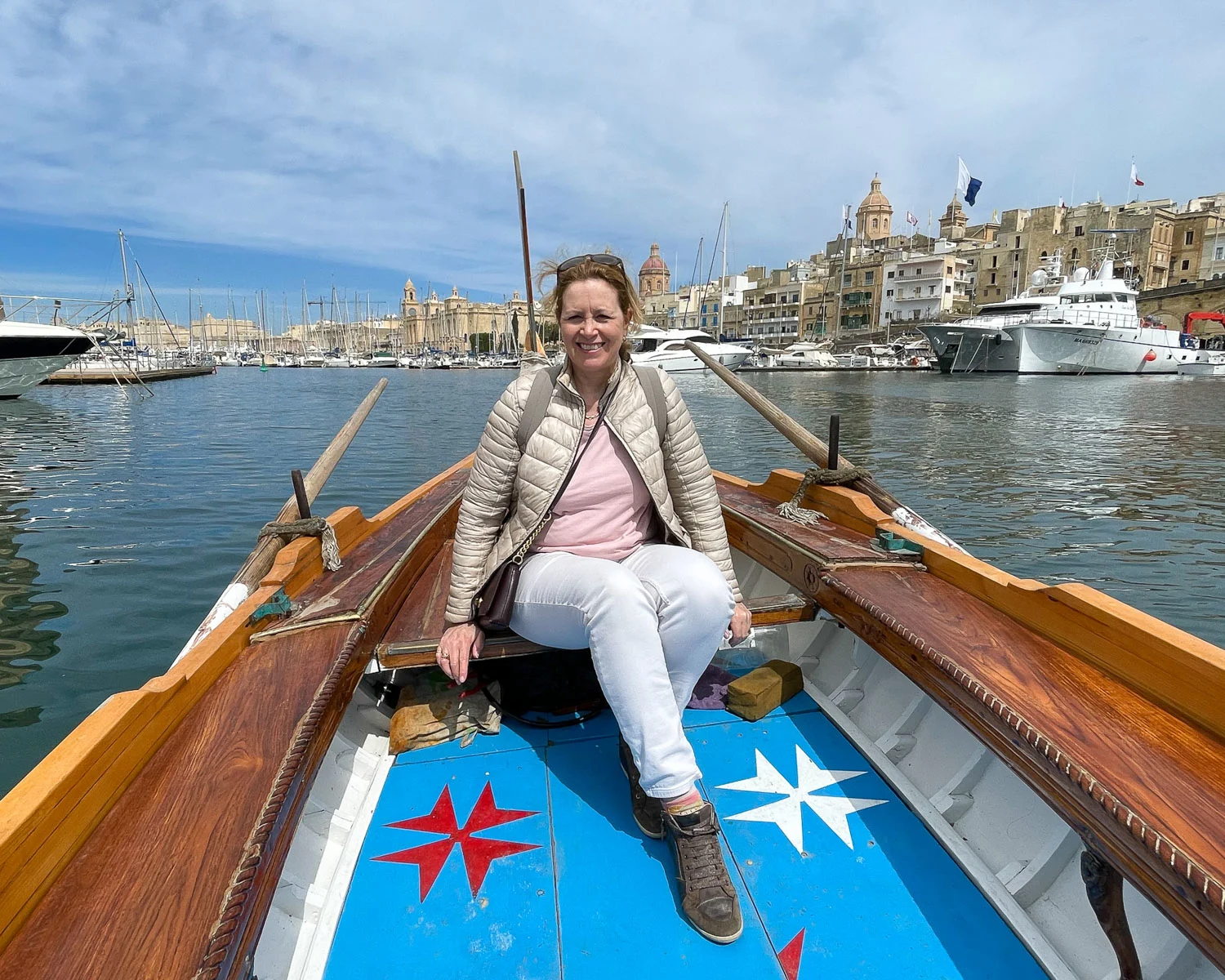
This article may contain affiliate links that provide commission on purchases you make at no extra cost to you. As an Amazon Associate I earn from qualifying purchases.
Top things to do in Malta
Despite its small size, there’s a lot to see in Malta, which is part of the archipelago that includes Gozo and Comino. So if you’re short of time, here are our top things to do in Malta.
Valletta – explore Malta’s picturesque capital, built of honey stone in the 16th century by the Knights of Malta.
Three Cities – cross the Grand Harbour, to visit the peninsulas that were the first base of the Knights of Malta, surrounded by sparkling water.
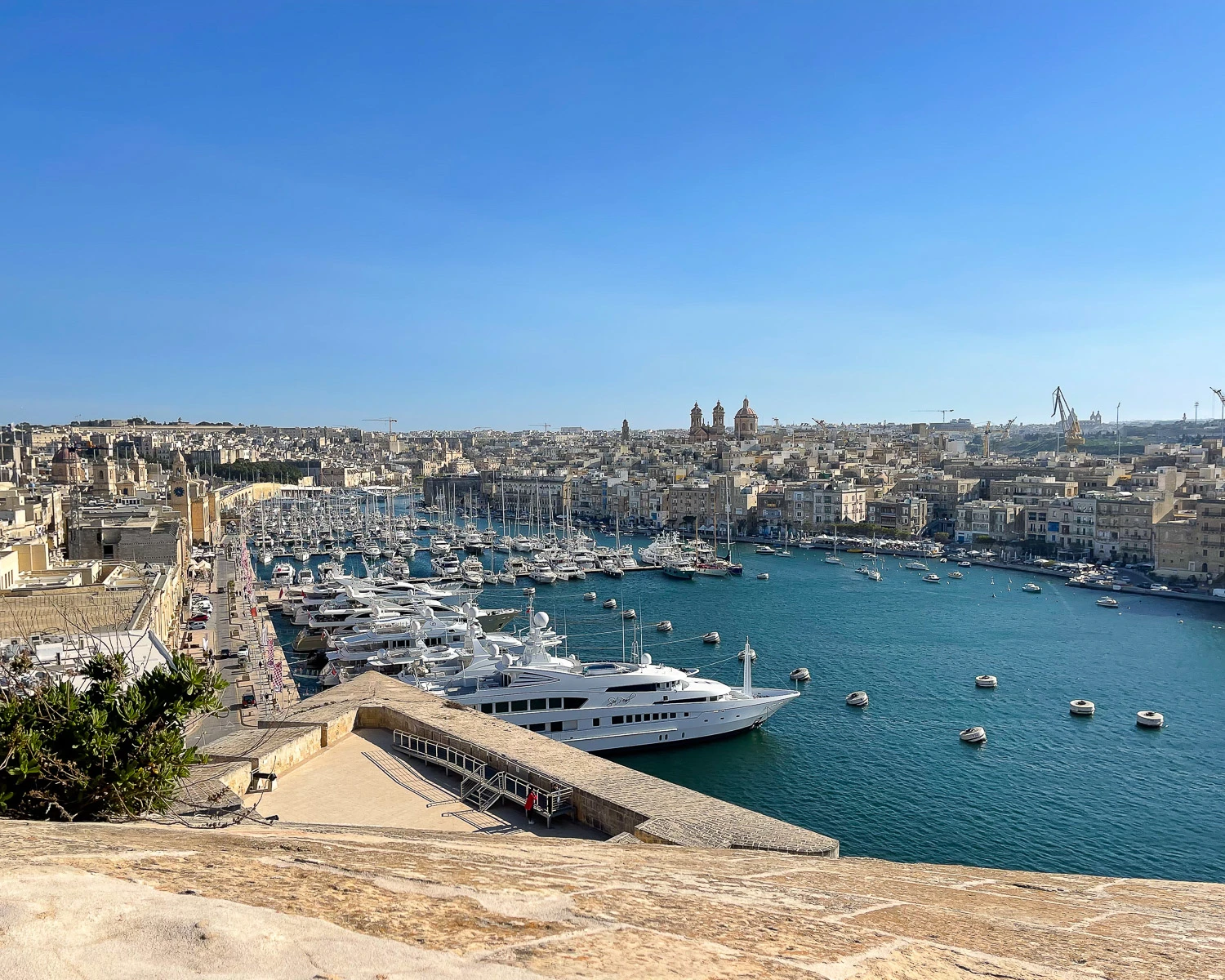
M’dina – set on a hill in the countryside, the walled Medieval city of M’dina was the island’s first capital, with more things to see outside the walls at Rabat.
Gozo – Malta’s smaller and quieter sister island can easily be visited in a day trip, for pretty countryside, beaches and the historic citadel at Victoria.
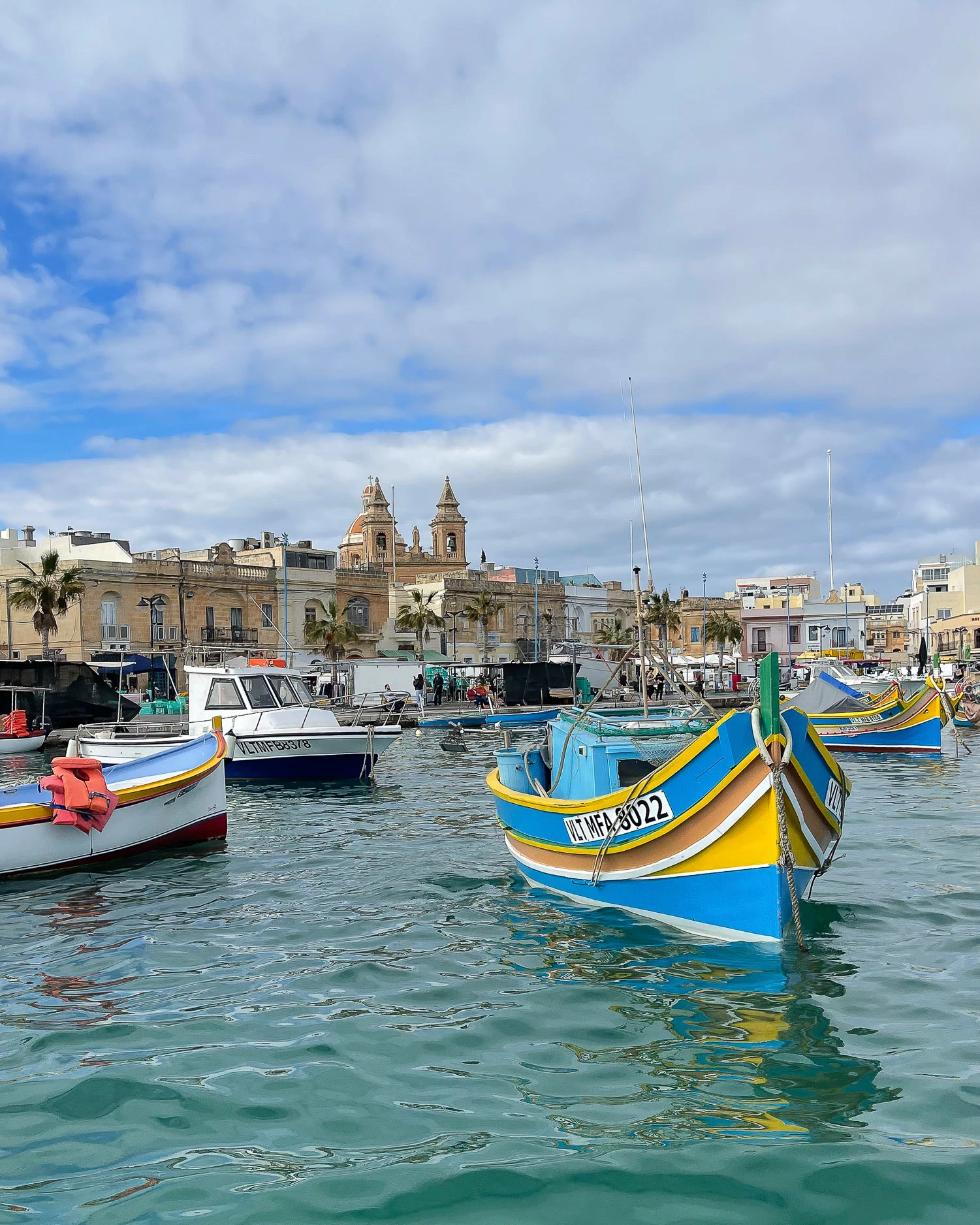
Marsaxlokk – visit this fishing village on Sunday when the market is in full swing, have a relaxed seafood lunch and watch the painted Luzzu fishing boats bob in the harbour.
Take a boat trip – the most popular boat trip is to the Blue Lagoon on the island of Comino, although it gets very busy in summer. Other fun boat trips include a visit to the Blue Grotto Caves from Wied iż-Żurrieq or to St Peter’s Pool from Marsaxlokk.
1. Valletta – Malta’s historic capital
Malta’s delightful capital Valletta was laid out by the Knights of Malta in the 16th century and is a UNESCO World Heritage Site. Packed with stunning architecture, Valletta is a good place to start your visit to Malta, with world class restaurants, stunning Palazzos and a dip into Malta’s WW2 history. The top things to do in Valletta include;
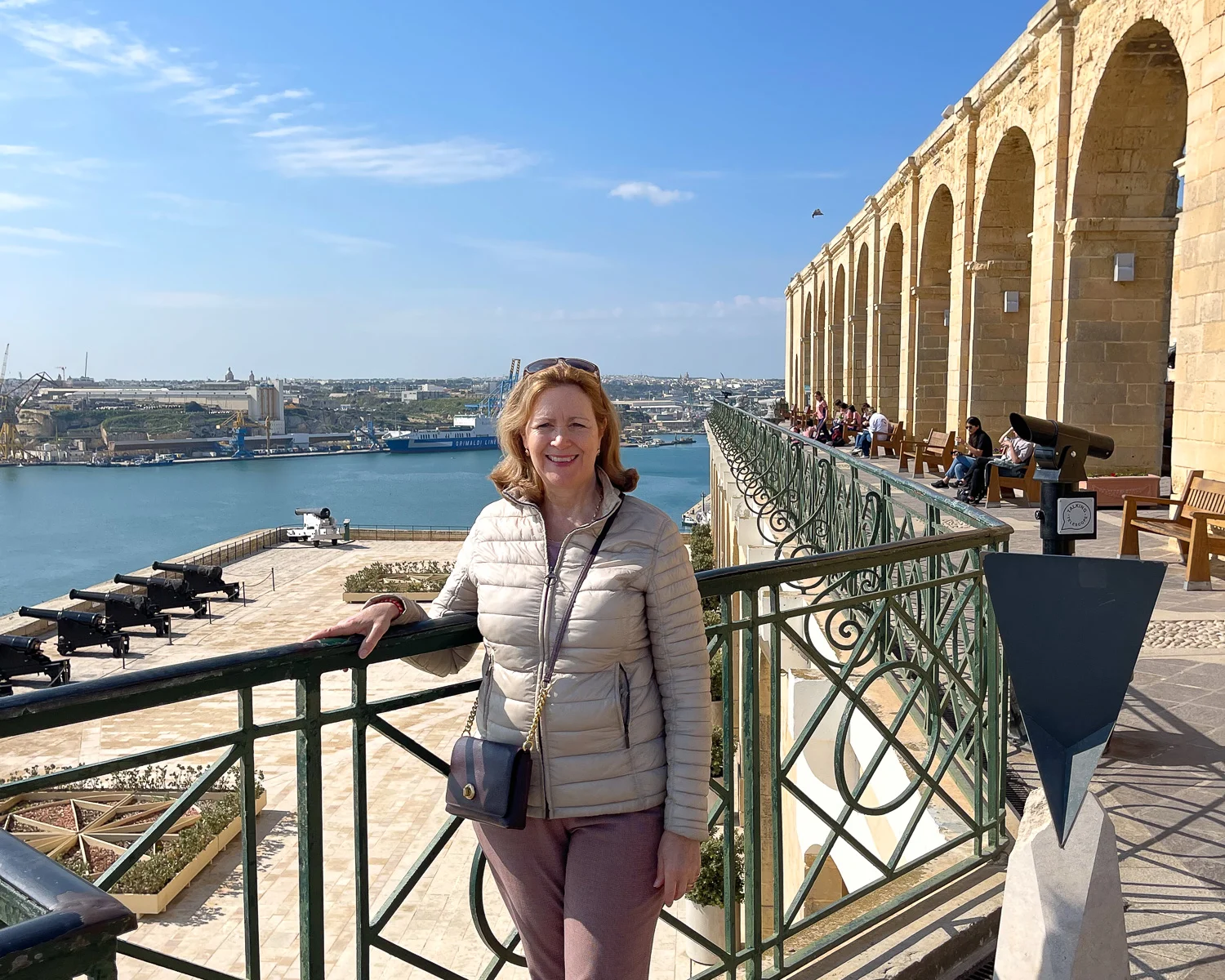
Top things to do in Valletta
St John’s co-cathedral – a Baroque gem with tombs of the Knights of Malta and a famous Caravagio painting.
Upper Barrakka Gardens – shady gardens with a grandstand view of the Grand Harbour and a gun battery that fires a salute twice daily.
Coffee in the square – have a coffee or lunch break in one of Valletta’s beautiful squares surrounded by 16th century architecture.
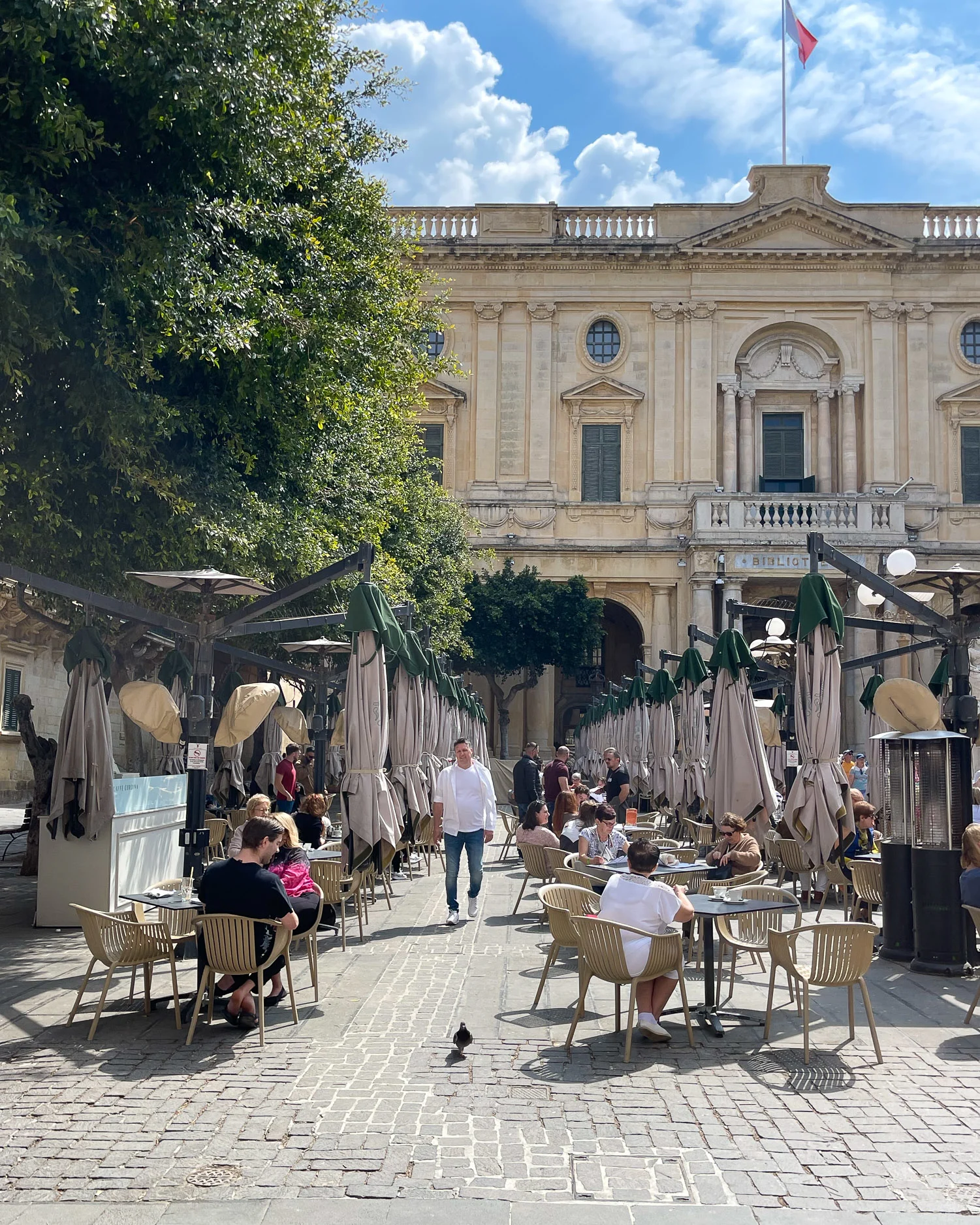
Casa Rocca Piccola – visit the colourful mansion to see how the Maltese nobility lived in splendour behind their plain building facades.
Fort St Elmo and the National War Museum – the 16th century star fortress of the Knights of Malta offers a fascinating dive into Malta’s military importance in the Mediterranean.
The Grand Master’s Palace – Used as the office of the President of Malta, visitors can see the magnificent State Rooms, which opened again in January 2024 after an extensive restoration.
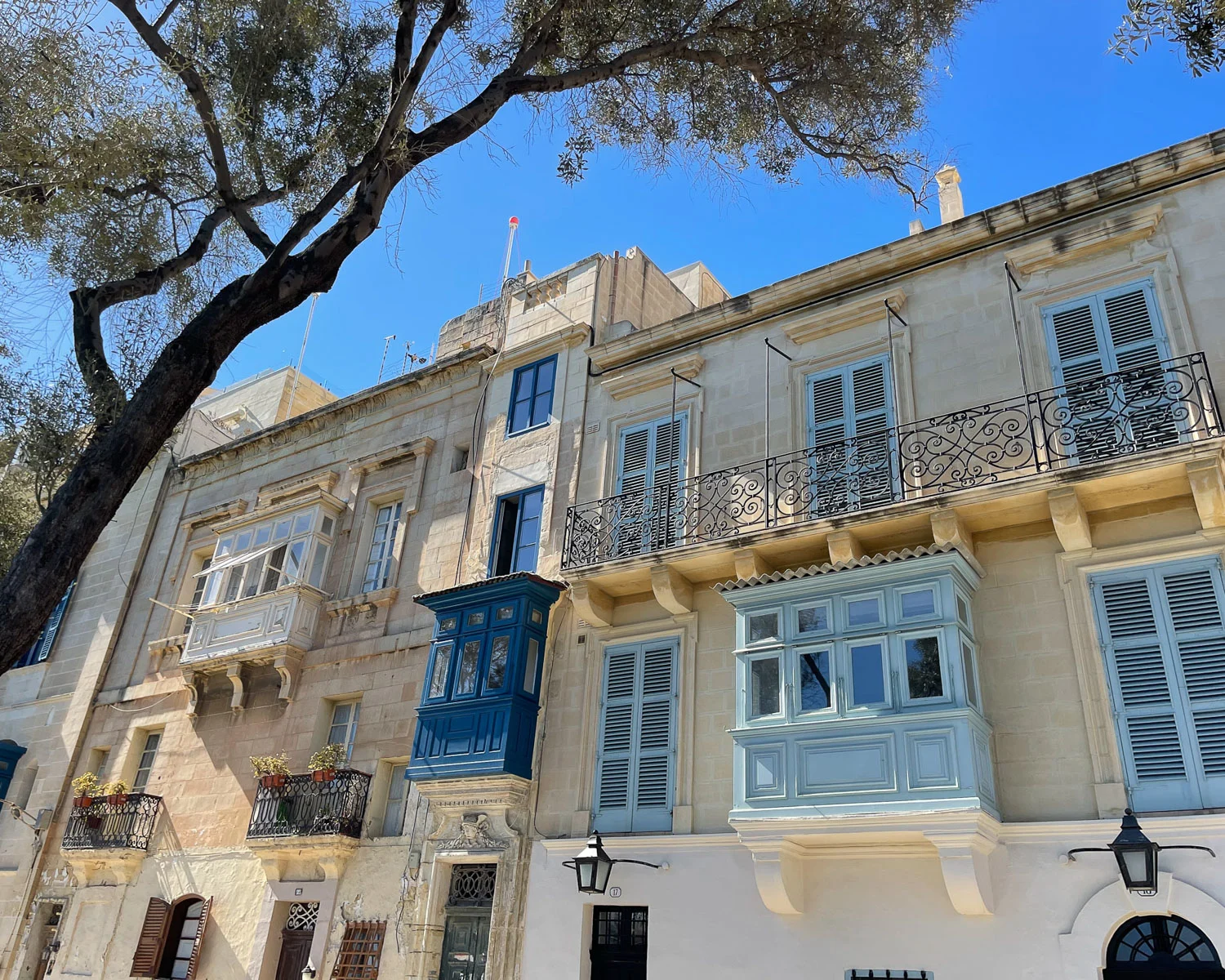
Read more about all the things to do in Valletta in my article: 20 best things to do in Valletta, Malta
Best tours in Valletta Malta
If you’d like to explore more of Valletta why not choose one of these tours?
Valletta 3 hour walking tour – Kick off your Valletta sightseeing with a walking tour of the city’s major sites, starting at the City Gates. Book here.
Valletta street food and culture tour – Learn about local food culture with tastings of sweets, street food and drinks in this walking tour around Valletta. Book here.
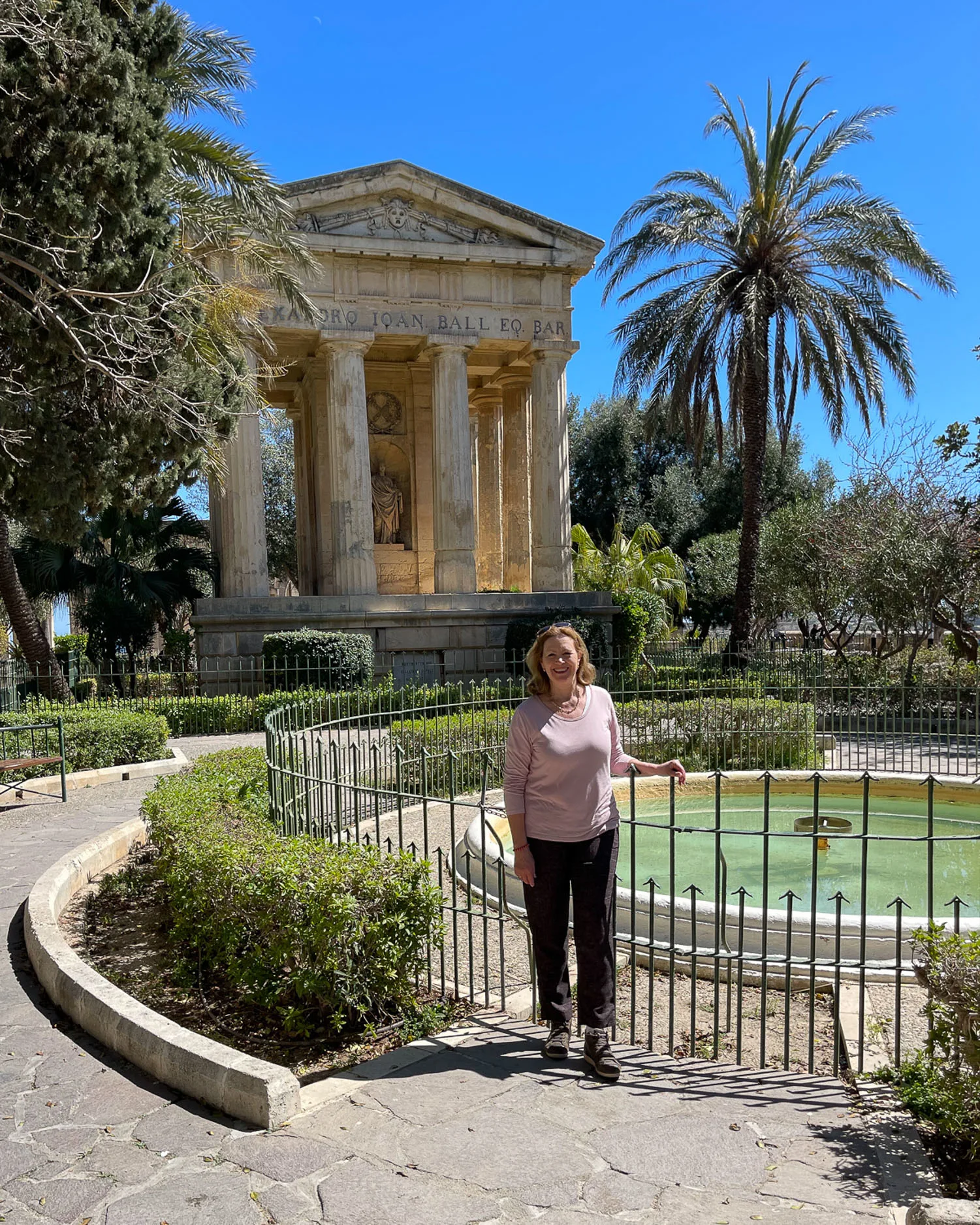
Where to stay in Valletta
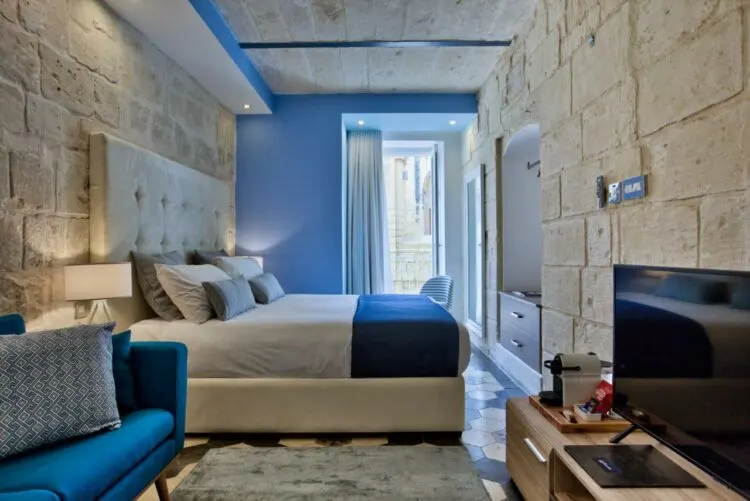
We stayed at the well located and stylish Barrakka Suites in Valletta – a great budget option near the Upper Barrakka Gardens
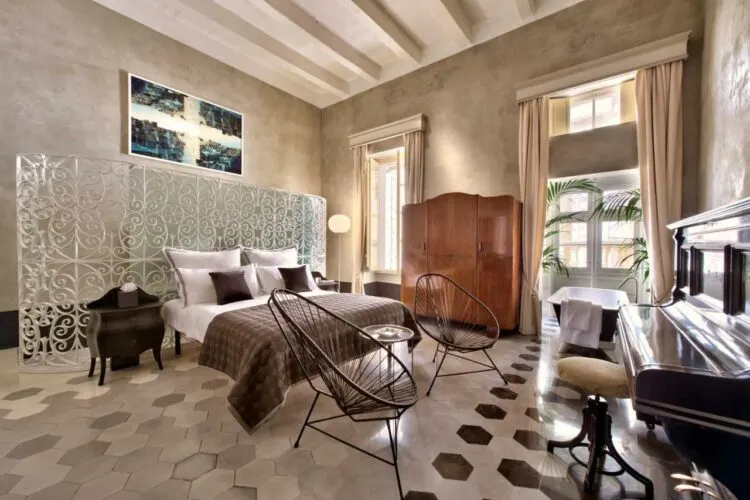
For luxury boutique style stay at the 19th century Casa Ellul in Valletta
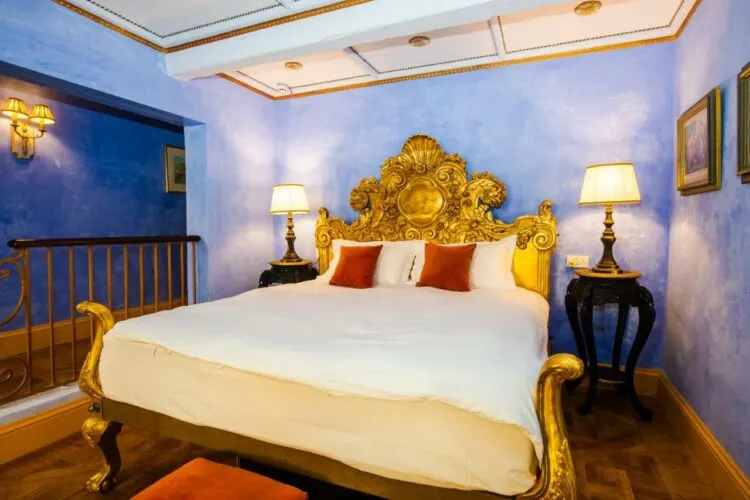
Stay at the historic Casa Rocca Piccola B&B in a 16th century palazzo in Valletta
2. Explore the Grand Harbour
Between Valetta and the Three Cities lies the Grand Harbour, which is easily explored by boat. This deep water harbour made Malta a trading and defensive hub, used from 1800 to 1979 by the British as their naval base in the Mediterranean.
For a boat tour, take the lift from the Upper Barrakka Gardens to the lower level, then cross the road to find the signs for the ferry departure point at Lascaris Wharf. You have a couple of options here.
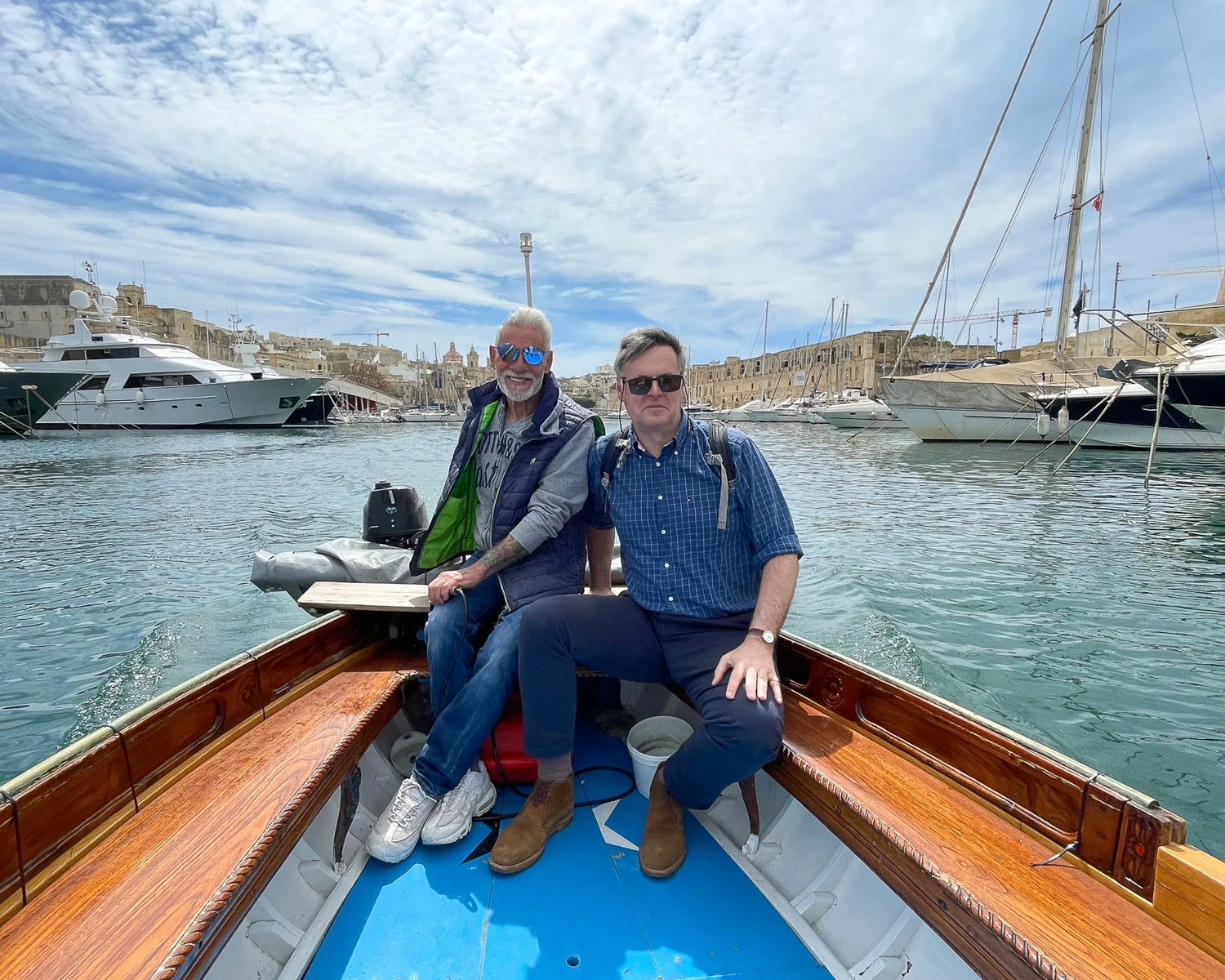
Take one of the small Maltese wooden ferries known as Dgħajsa that criss cross the harbour. They will ferry you to The Three Cities (€2) on the opposite side, or offer a tour of the harbour (€8). If you opt for the tour, your boatman will also act as a guide, explaining the points of interest and fortifications around the harbour.
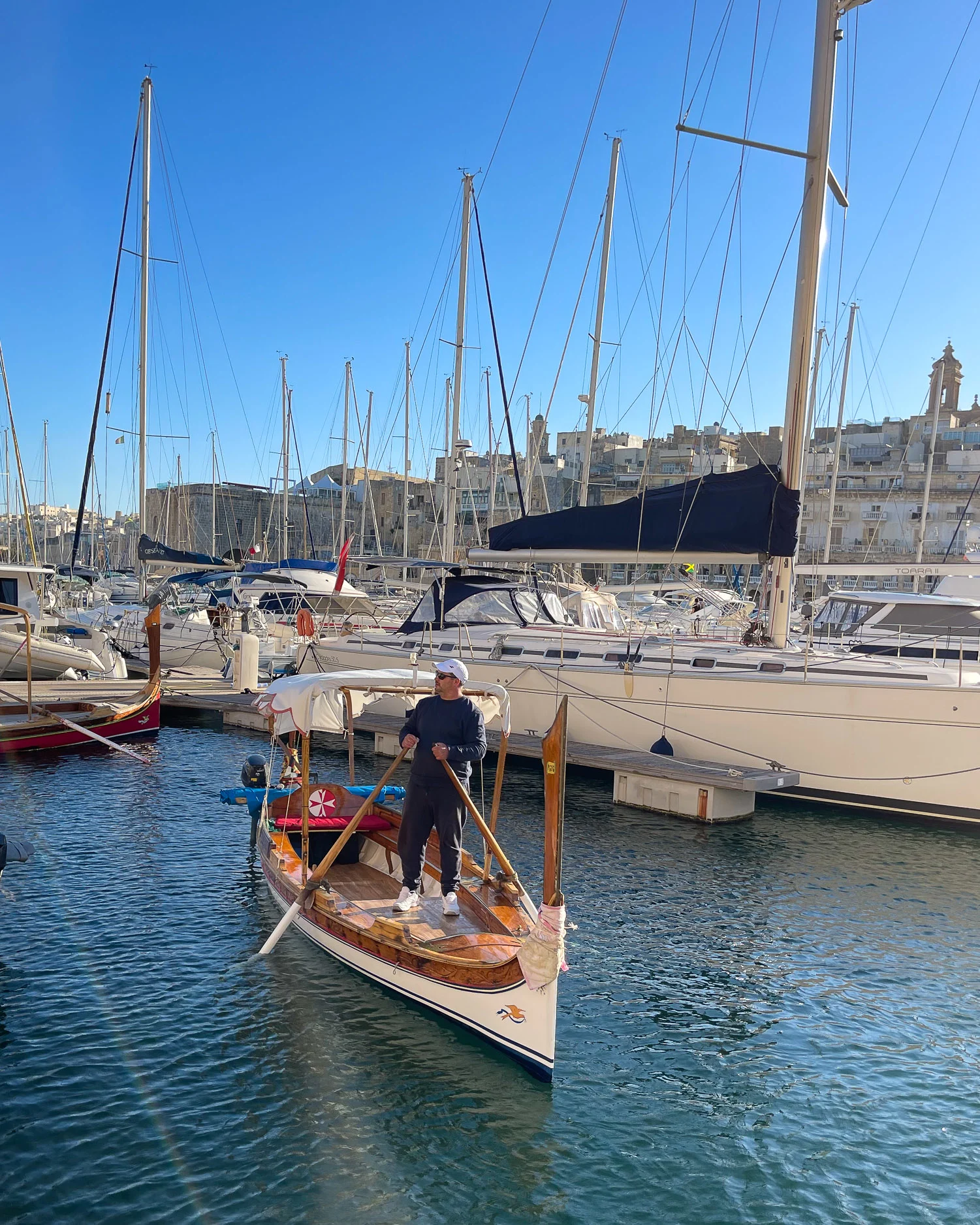
Alternatively, take the inexpensive public catamaran from Lascaris Wharf, which runs every 30 minutes throughout the day and will drop you on the Senglea side of the Three Cities Marina.
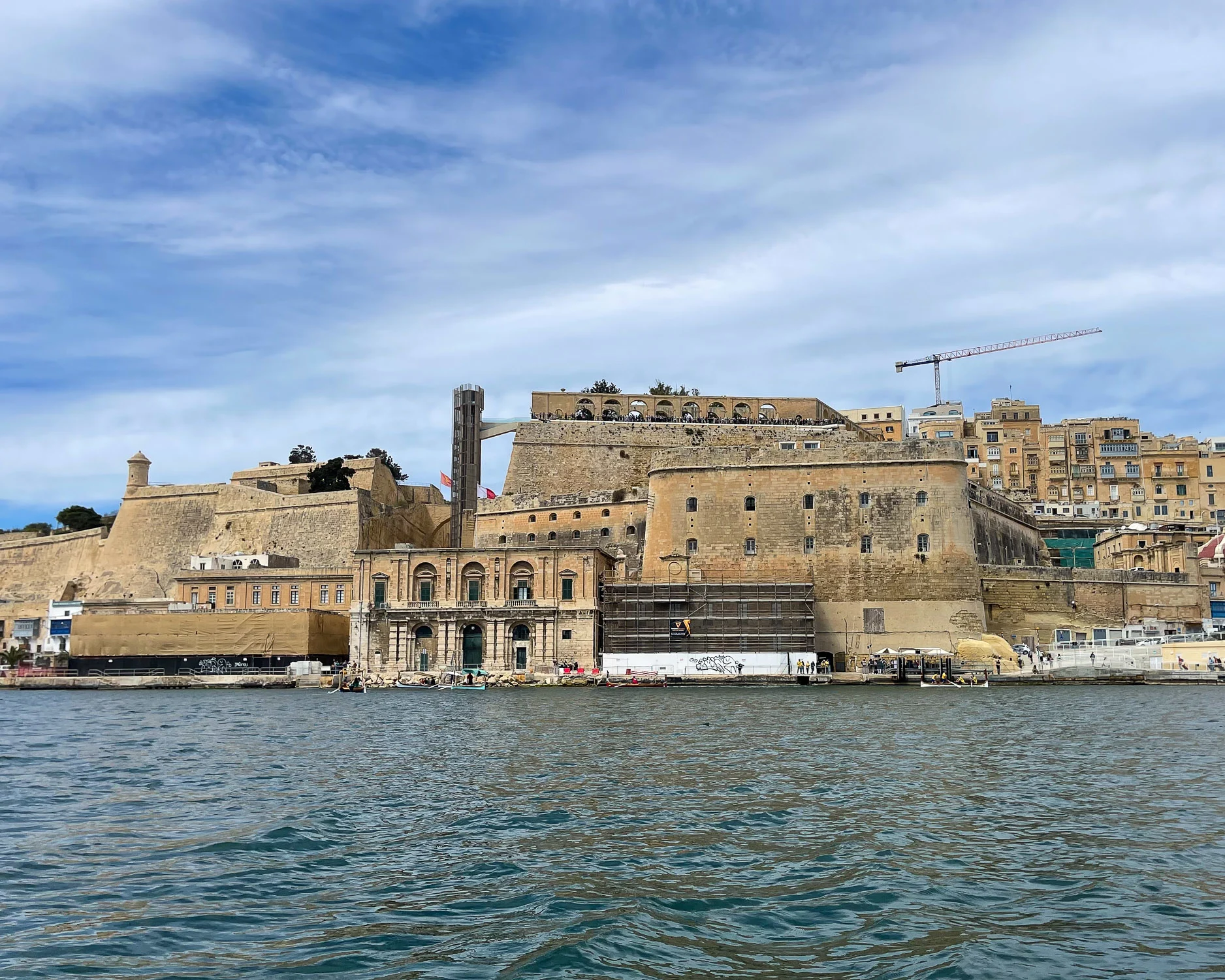
3. Three Cities – cross the harbour from Valletta
The towns and fortifications that lie just across the Grand Harbour from Valletta, are known as the Three Cities. They are located on peninsulas that provide sheltered harbours between them. Each have two names that are used interchangeably: the original old Maltese name and the newer name given to them by the Knights of Malta who established their first base there.
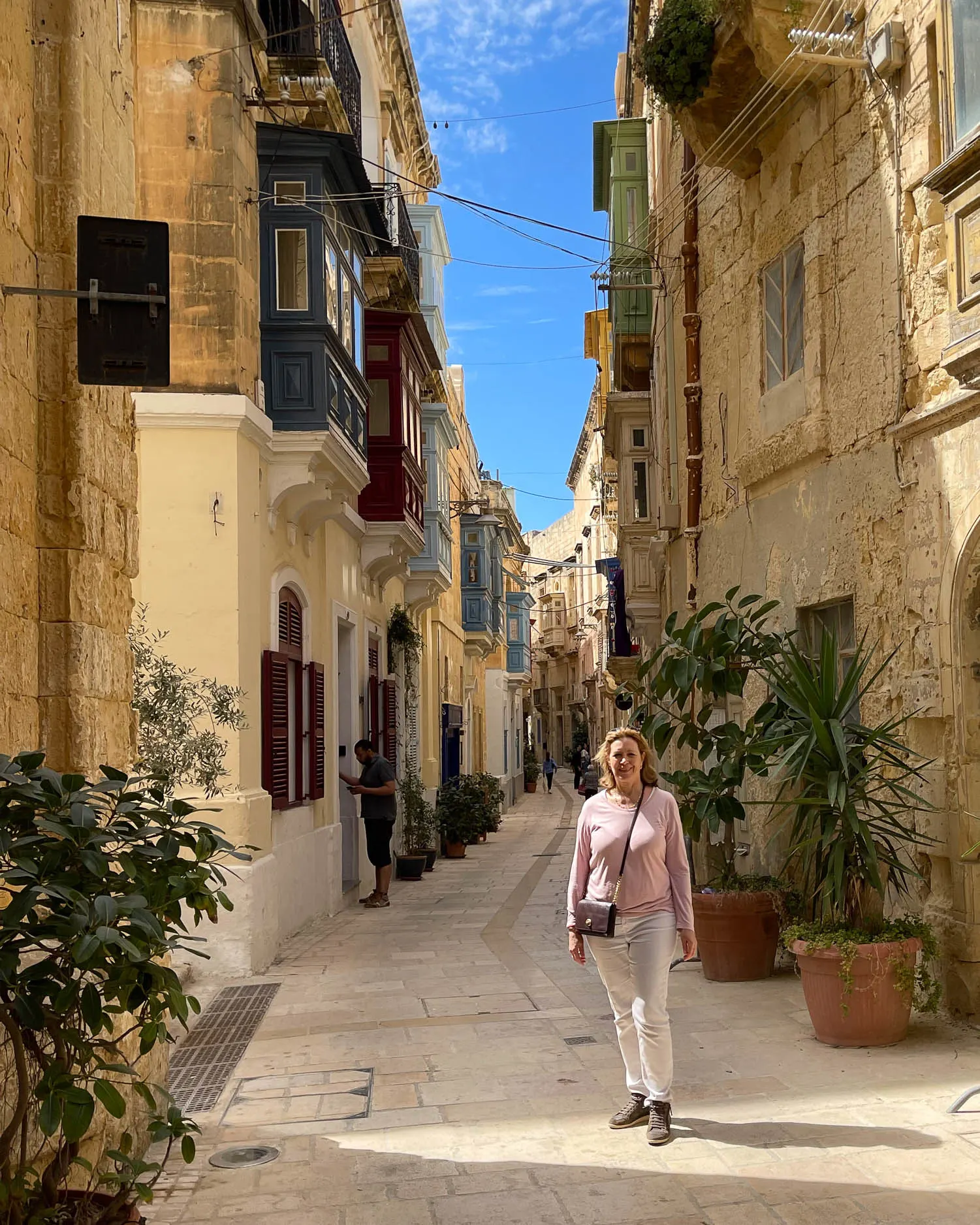
Birgu (Vittoriosa) is the oldest and was build up by the Knights of Malta as their headquarters when they arrived on Malta in 1530. Senglea (Isla) offers more of a local experience with few formal sights, while Bormla (Conspicua) is set back behind these peninsulas. Also jutting into the harbour is Kalkara, located across the marina from Birgu.
The easiest way to arrive is by ferry from Valletta’s Lascaris Wharf, either in one of the old wooden Dgħajsa boats or the public catamaran ferry. You can also take a bus to The Three Cities from Valletta bus station.
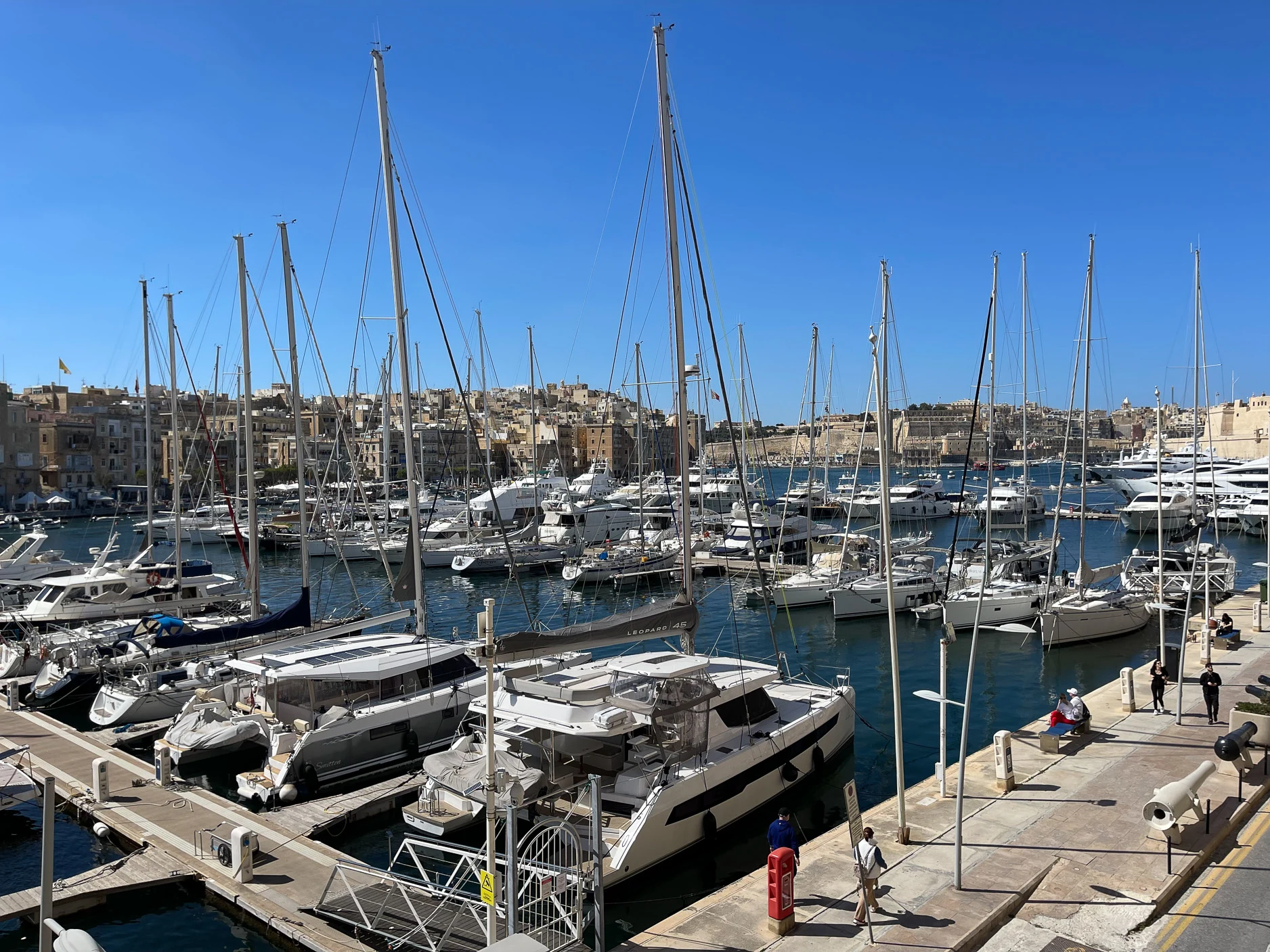
Top things to do in the Three Cities
Birgu waterfront – admire the super yachts, visit the Malta Maritime Museum and St Lawrence’s church.
Victory Square in Birgu – located behind St Lawrence’s church, the main square has some charming cafes including BeBirgu, housed in an old Palazzo.
Birgu’s medieval streets – wander through the narrow streets leading from Victory Square, with their traditional gallarija balconies and the Auberge mansions belonging to different branches of the Knights of Malta.
Inquisitor’s Palace in Birgu – this 16th century mansion was the residence of Malta’s Inquisitor, serving in the past as a prison and military hospital.
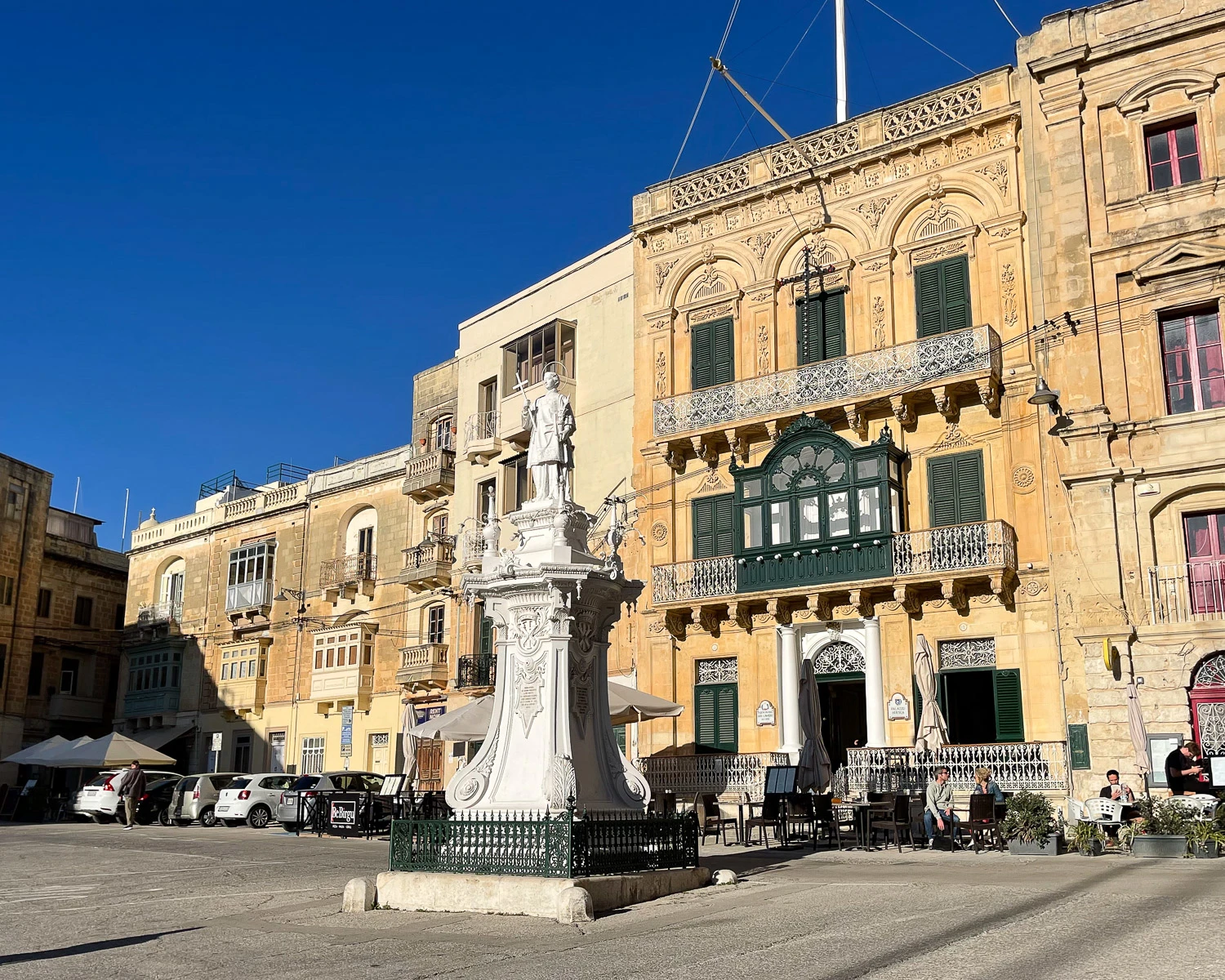
Fort St Angelo in Birgu – the imposing stone fortress overlooking the Grand Harbour, now a museum of naval history with amazing views over the harbour.
Birgu City Gates and Malta at War Museum – the 18th century stone gates were part of the city’s original fortifications and lead to the museum commemorating Malta’s role in WW2.
Senglea Waterfront – a popular spot for restaurant terraces overlooking the harbour, with old fishing boats and benches painted with Maltese proverbs.
Gardjola Gardens in Senglea – the “lookout garden” with shady shrubs and trees, on the highest point of the peninsula overlooking the Grand Harbour.
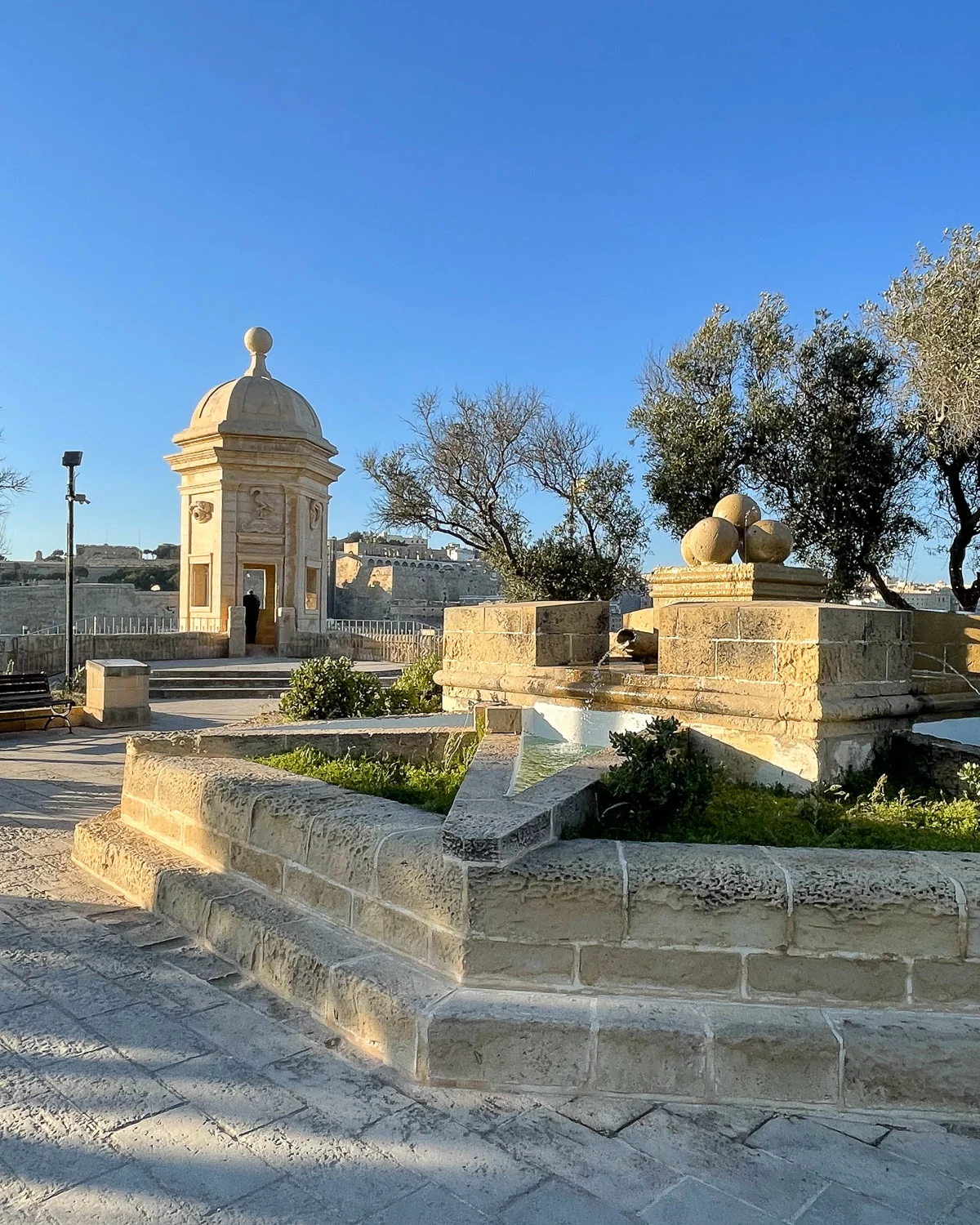
Kalkara Esplora Centre – an interactive science centre built around an old naval hospital, with outdoor activity centre and planetariuam.
Read more in my article on: A guide to the Three Cities Malta – top things to do
Where to stay in Three Cities Malta
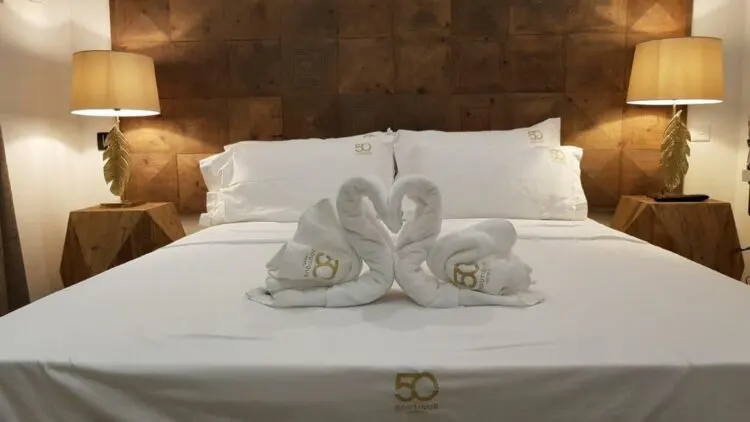
Stay at the 50th Boutique Hotel – a small property in a quiet street in Birgu
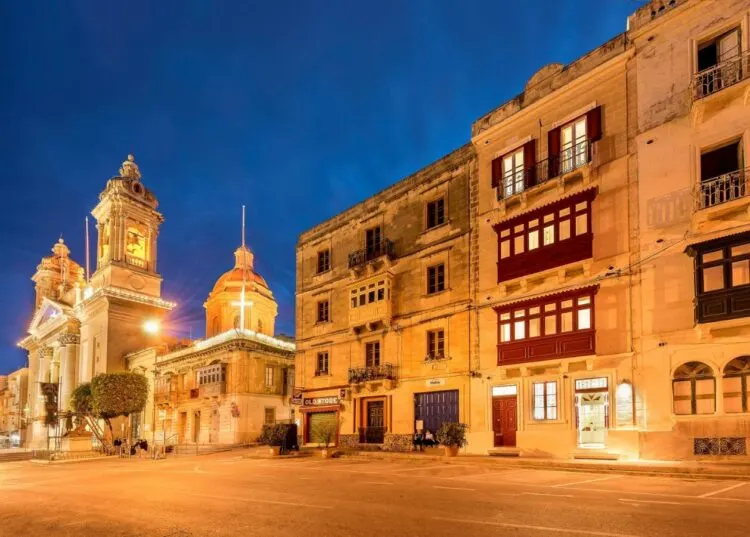
The Snop House is a small boutique hotel filled with art and with a roof terrace in the heart of Senglea
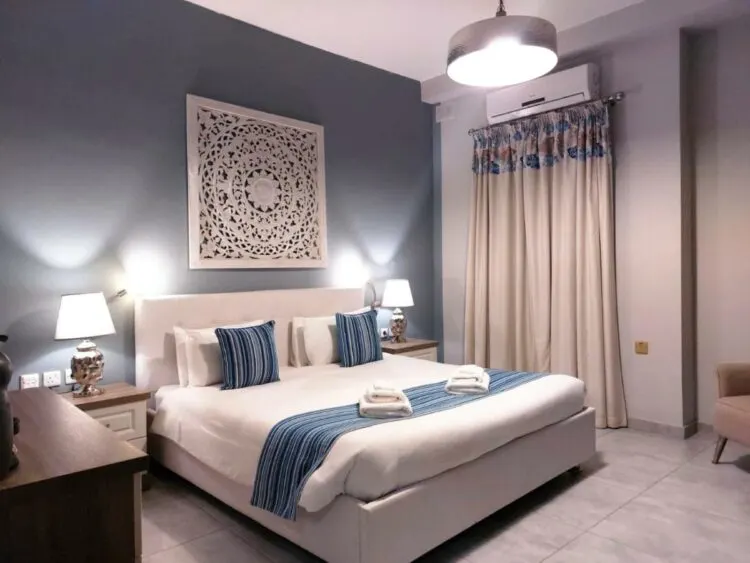
Casa Burmila Boutique Hotel – an elegant small hotel with rooftop pool close to waterfront in Conspicua
4. A day trip to Gozo
Malta’s smaller sister island of Gozo makes a quiet retreat that you can easily visit in a day. Here you’ll find a calmer atmosphere, with a fortified citadel, boat trips, turquoise bays for swimming and green countryside for walking.
Most visitors reach Gozo via the main car ferry that runs from Cirkewwa in the north of Malta. However for foot passengers, there’s a convenient fast ferry from Valletta to Gozo which will get you there in 45 minutes.
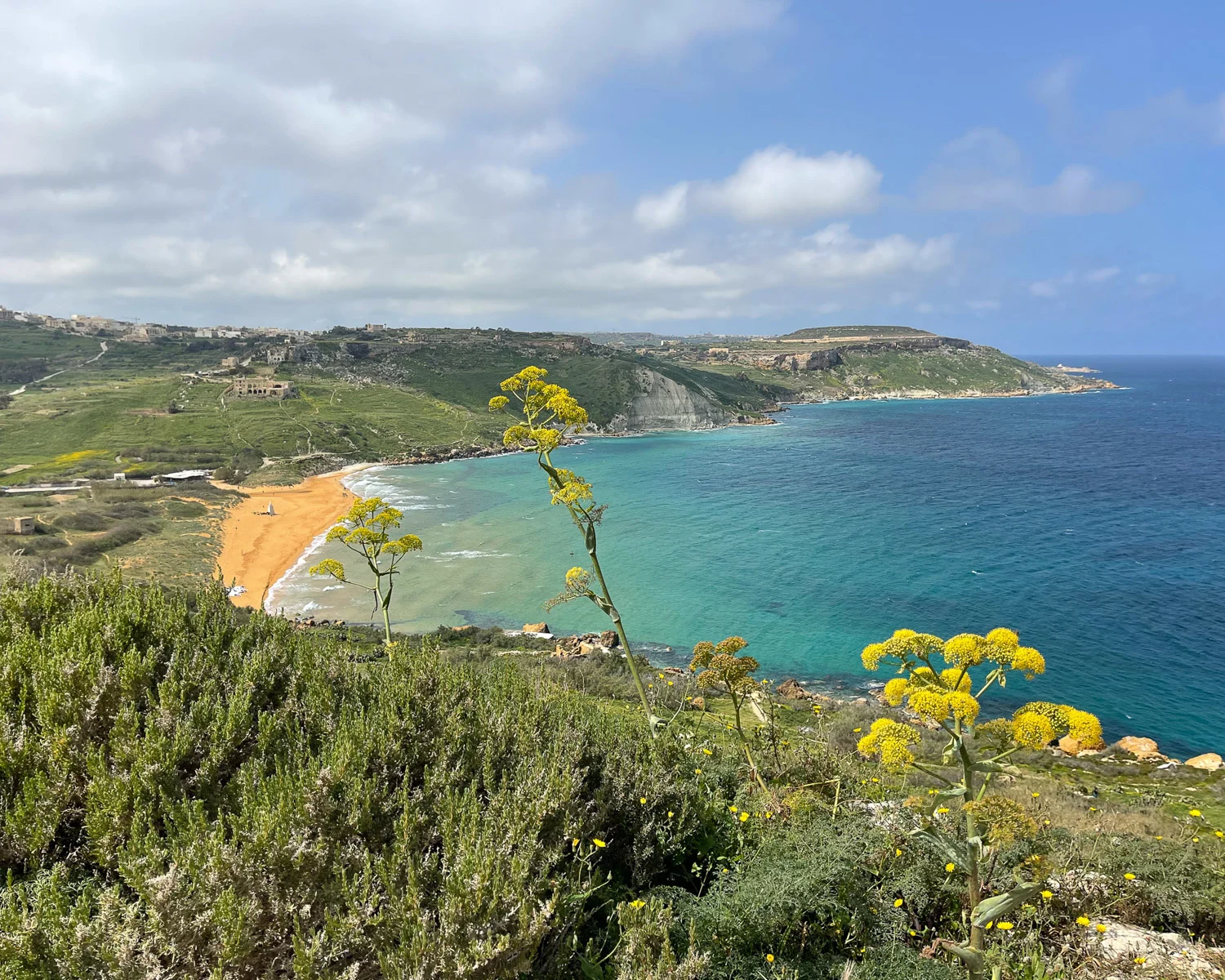
Options for getting around Gozo include the public buses, hop on hop off bus, tuk tuk tours, private taxi tours, quad bikes or hiring a car for the day (we tried the last option).
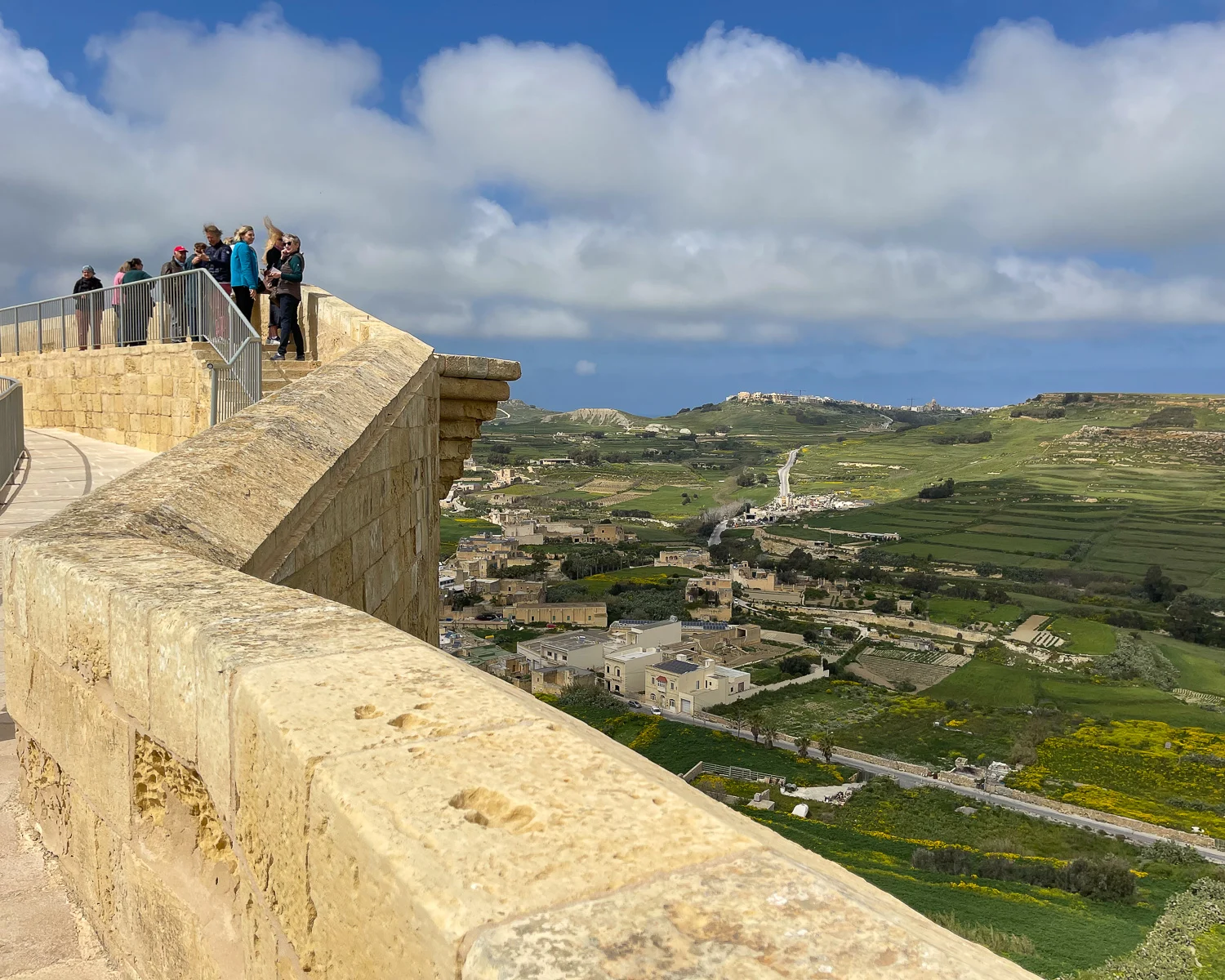
Best things to do in Gozo
Victoria – Gozo’s capital is located in the centre of the island, with an atmospheric medieval citadel and shady squares.
Xlendi Bay – a pretty bay on Gozo’s south coast, with clear water for swimming and a row of seafront restaurant, although we’re not such as fan of the intensive building around the bay.
Marsalforn – this resort on Gozo’s northern coast also has a good range of restaurants along the seafront. It’s bigger than Xlendi but we found the large number of high rise buildings so close to the sea quite unattractive.
Ggantija Neolithic Temples – Built around 3000 years BC, these stone temples are constructed from enormous boulders, with slab hearths and altars. The small museum displays objects found at the site, including female fertility figures.
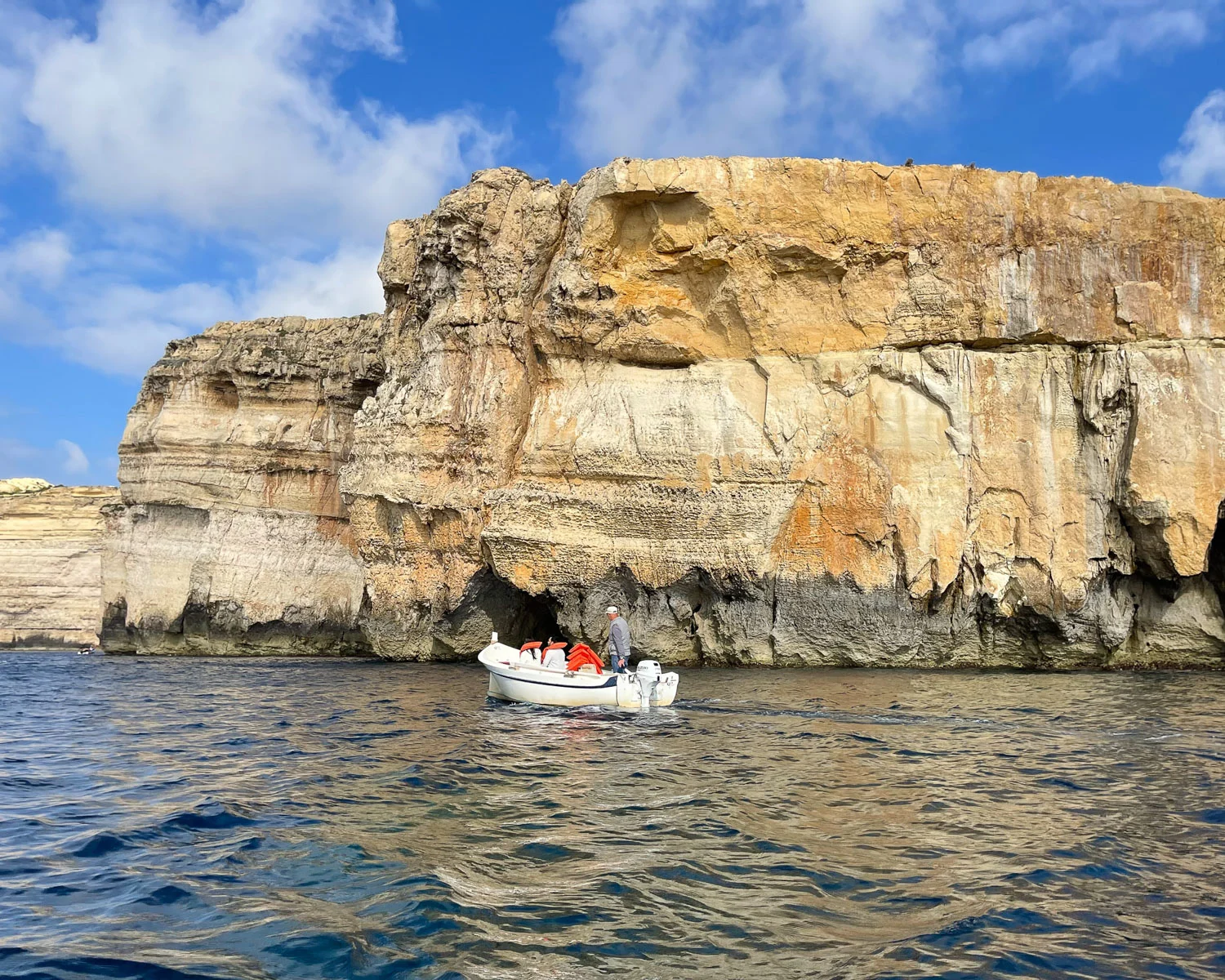
Dwejra inland sea – from this small inland lagoon, take a short boat trip through an opening in the cliff to the sea caves. It’s the site of the Azure Window, a sea arch that collapsed in 2017 and the Blue Hole, a popular diving location.
Ta’Pinu Shrine – an imposing basilica that is a site of pilgrimage for Catholics, said to be where Our Lady appeared to a local woman.
Xwenjni salt pans – ancient salt pans are cut into the rock by the sea and can be viewed as you drive along the north coast near Marsalforn. Nearby is the pretty and unspoiled Xwejni Bay, a good place for swimming and lunch.
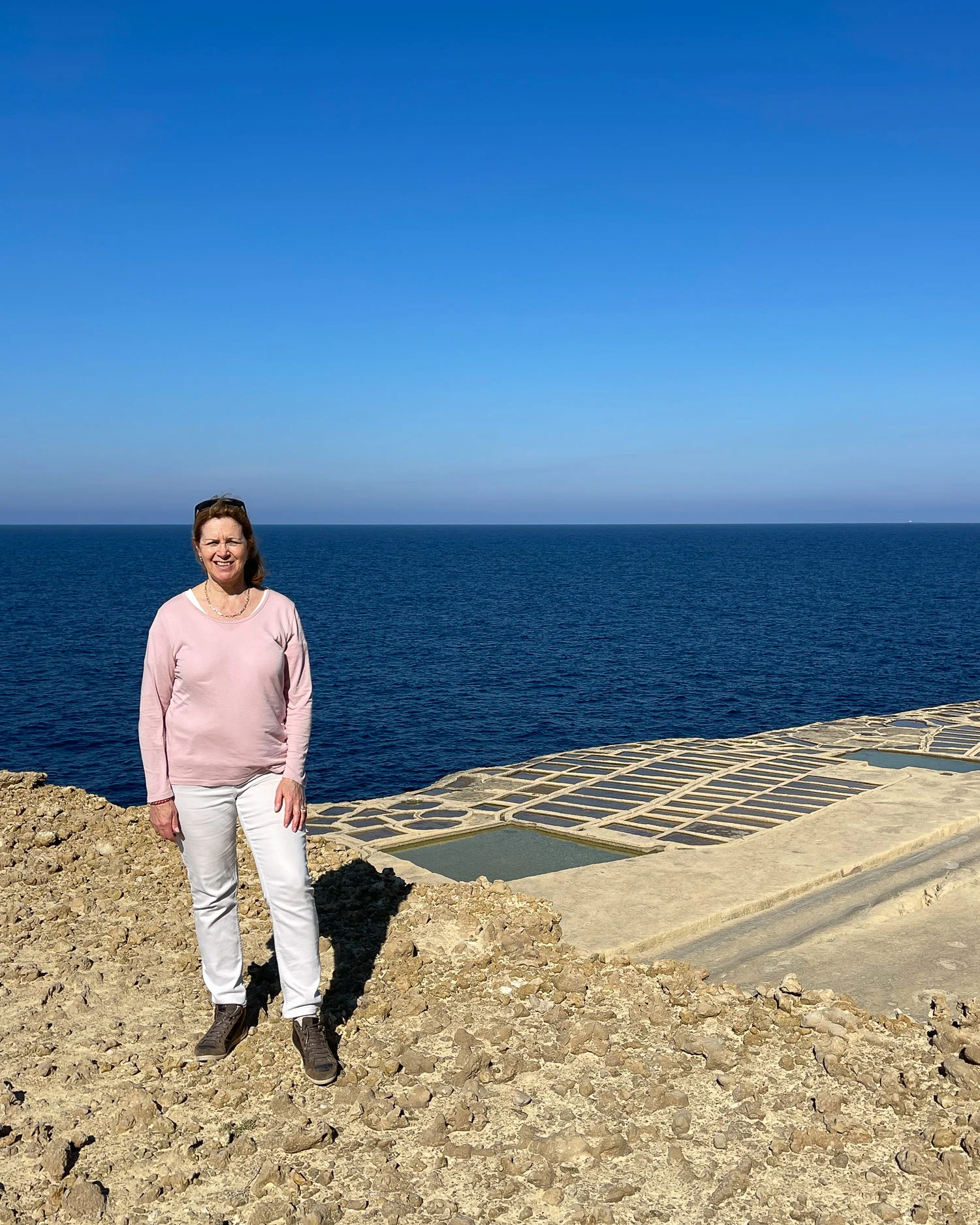
Ramla Beach – a popular beach known for its golden sand and shallow waters. On the cliff above is the Tal-Mixta Cave viewpoint, offering beautiful views over the bay.
Swimming in rocky inlets – there are several hidden inlets offering clear water for swimming, like Wied il-Ghasri on the north coast or Mgarr ix-Xini on the south coast
Read more in my article on: 13 fun things to do in Gozo
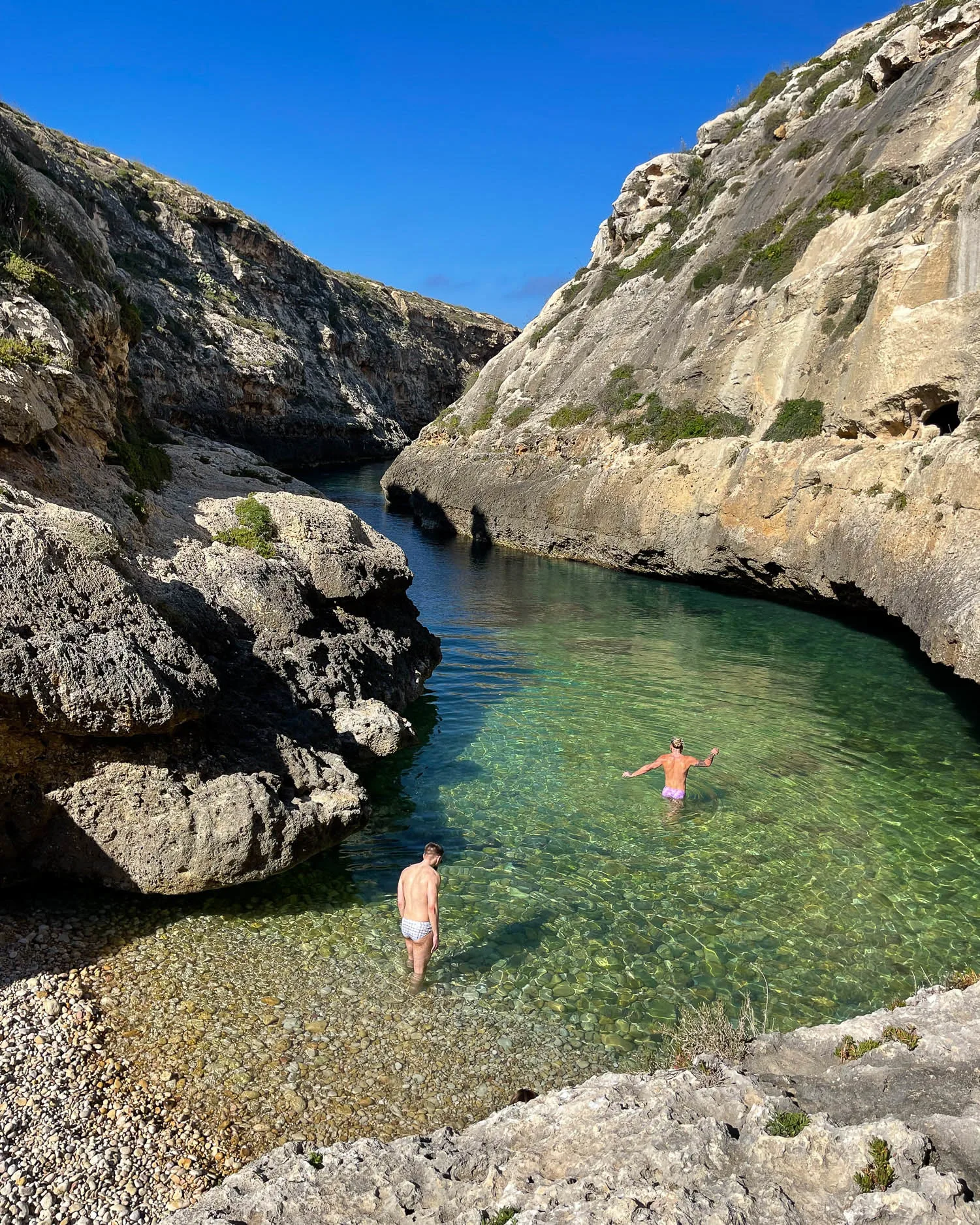
Tours in Gozo
Check out these Gozo Tour options
Gozo full day Tuk Tuk tour and lunch with driver
Gozo self drive e-jeep guided tour
Where to stay in Gozo
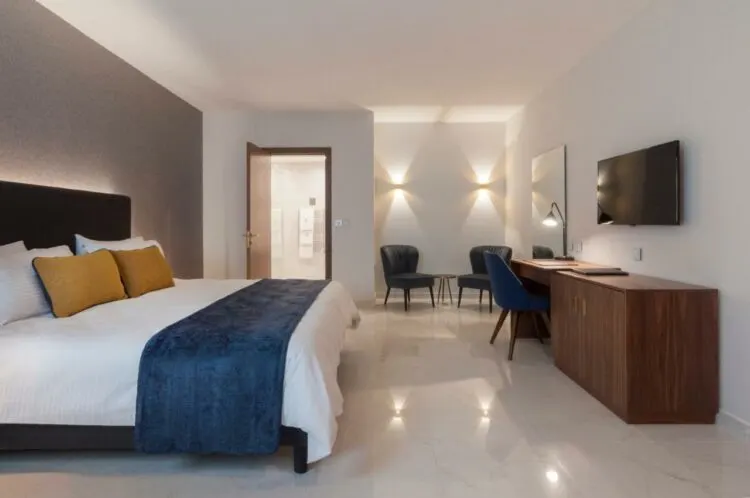
The Duke Boutique Hotel is well located in Gozo’s capital Victoria, with easy access to the rest of Gozo by bus.
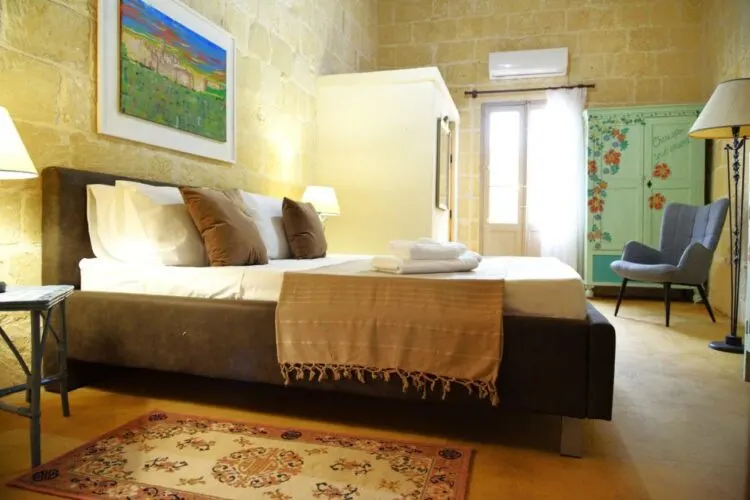
A great budget option for Gozo is Gawhra B&B in Victoria’s old quarter.
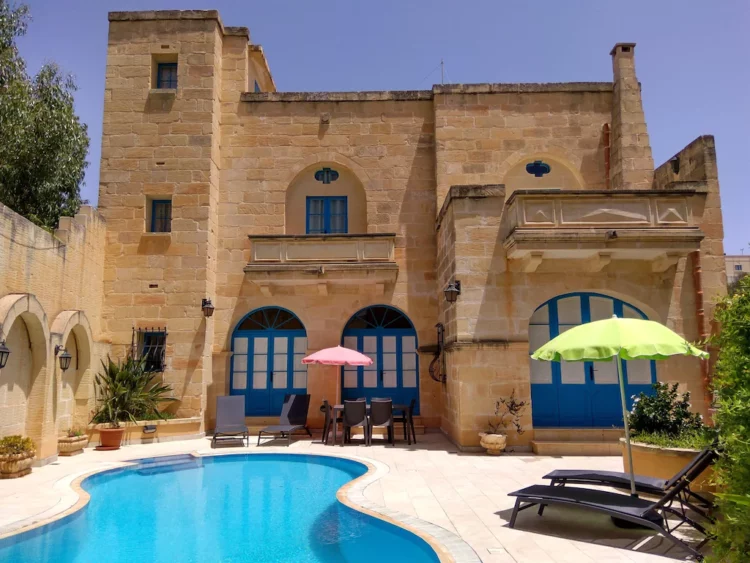
If you want more space for a family or group, check out these Villas to rent in Gozo.
5. A trip to Comino and the Blue Lagoon
Close to Gozo is the uninhabited island of Comino, the smallest of the three islands in Malta’s archipelago. In summer it’s a popular destination for boat trips, and you’ll also pass Comino on the ferry from Malta to Gozo.
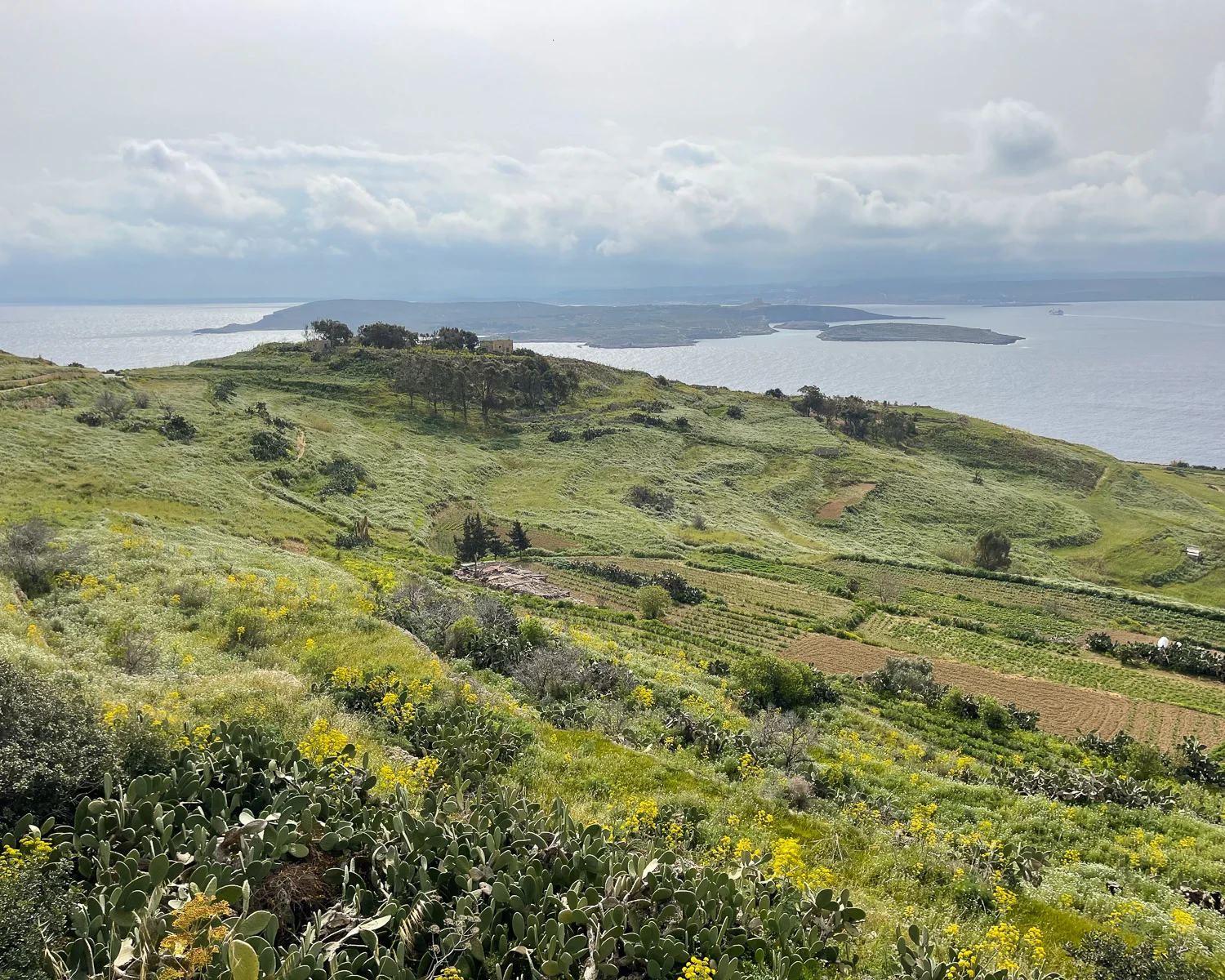
The most popular spot in Comino is the Blue Lagoon. This sheltered area of turquoise water off Comino’s shore is ideal for swimming. In high season the area becomes super busy with boat trips and the small beach and shore is extremely crowded.
There is a kiosk for food in high season but otherwise Comino offers few facilities and you should take everything you need for the day.
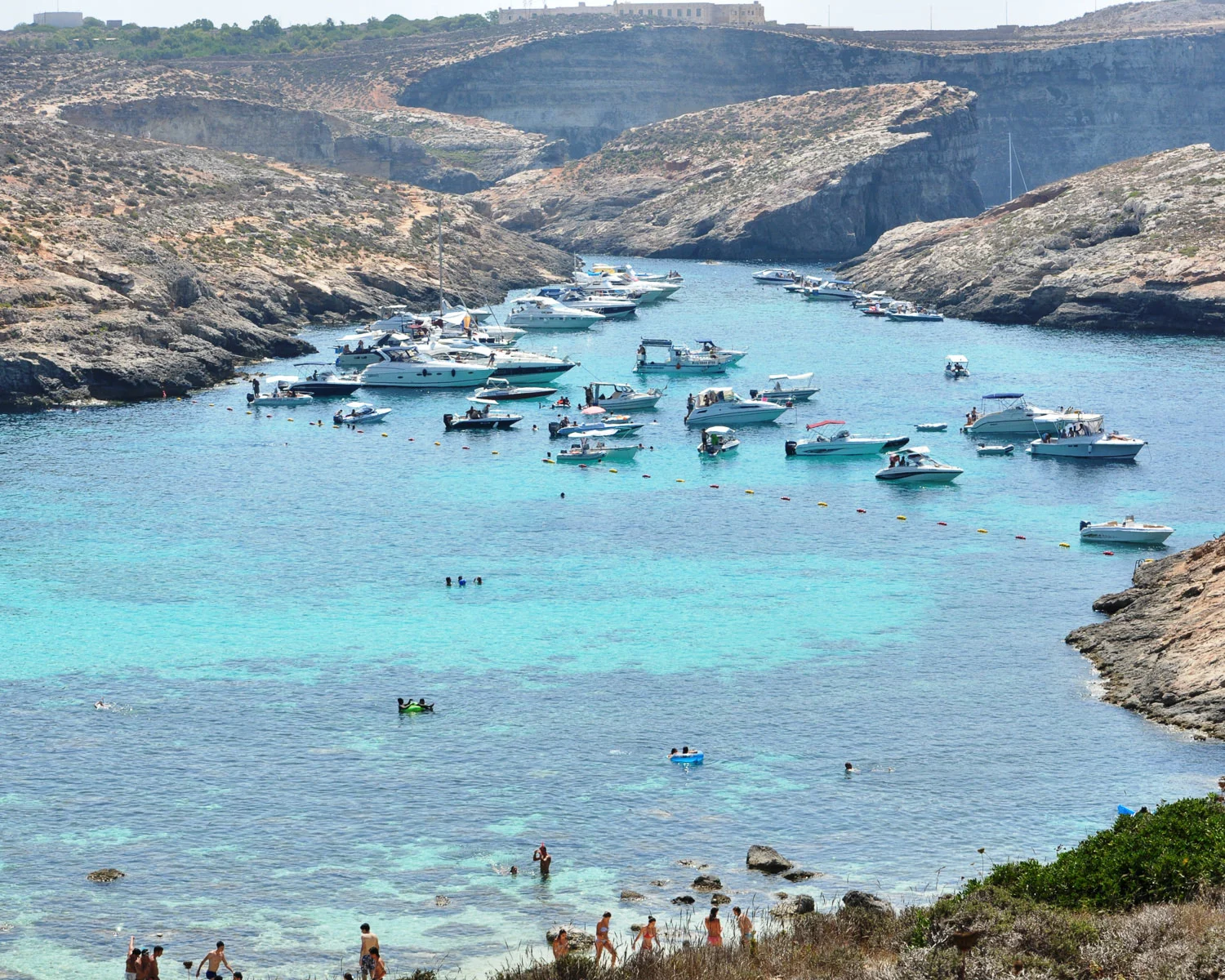
Boat trips to Comino
Most of the Comino boat trips leave from Malta, departing from Sliema, St Paul’s Bay or the ferry port of Cirkewwa.
Comino Boat trip from Sliema – This full day boat trip leaves from Sliema, with views of Malta’s east coast and plenty of time for swimming and relaxing in the Blue Lagoon. Book here.
Comino Boat Trip and Gozo sightseeing from St Paul’s Bay – This full day trip works well if you are staying in the St Paul’s Bay area, combining sightseeing in Gozo with swimming in the Blue Lagoon Comino. Book Here.
Comino Blue Lagoon and Gozo Tour by Quad Bike with dinner – Starting in Valletta, this full day tour includes 2 hours of swimming in the Blue Lagoon, followed by a Quad Bike tour of Gozo as the sun sets. Book here.
If you’d like to visit the Blue Lagoon from Gozo, there are some ferries that run from the main ferry port at Mġarr Harbour. Or take a tour from Gozo like this one.
Two Island Tour: Blue Lagoon Comino and Gozo by Tuk Tuk – This tour will give you a late morning boat trip to Comino’s Blue Lagoon, followed by a Tuk Tuk Tour of Gozo. Book here.
6. M’dina – a walled Medieval city
Set on a hilltop in the centre of the island, the walled medieval city of M’dina was Malta’s first capital. After the Knights of Malta decided to relocate their capital to Birgu in the 16th century, the importance of M’dina declined, although many noble families retained their palazzos there.
Gradually the city was all but abandoned, becoming known as the “Silent City”. Even today few people stay or live in M’dina, so once the coach loads of visitors have left, it can be very quiet at night. You may recognise M’dina’s imposing main gate as a film location from the first season of Game of Thrones when the city doubled for King’s Landing.
While the old city’s main charm is in the atmospheric narrow streets, top things to do in M’dina include;
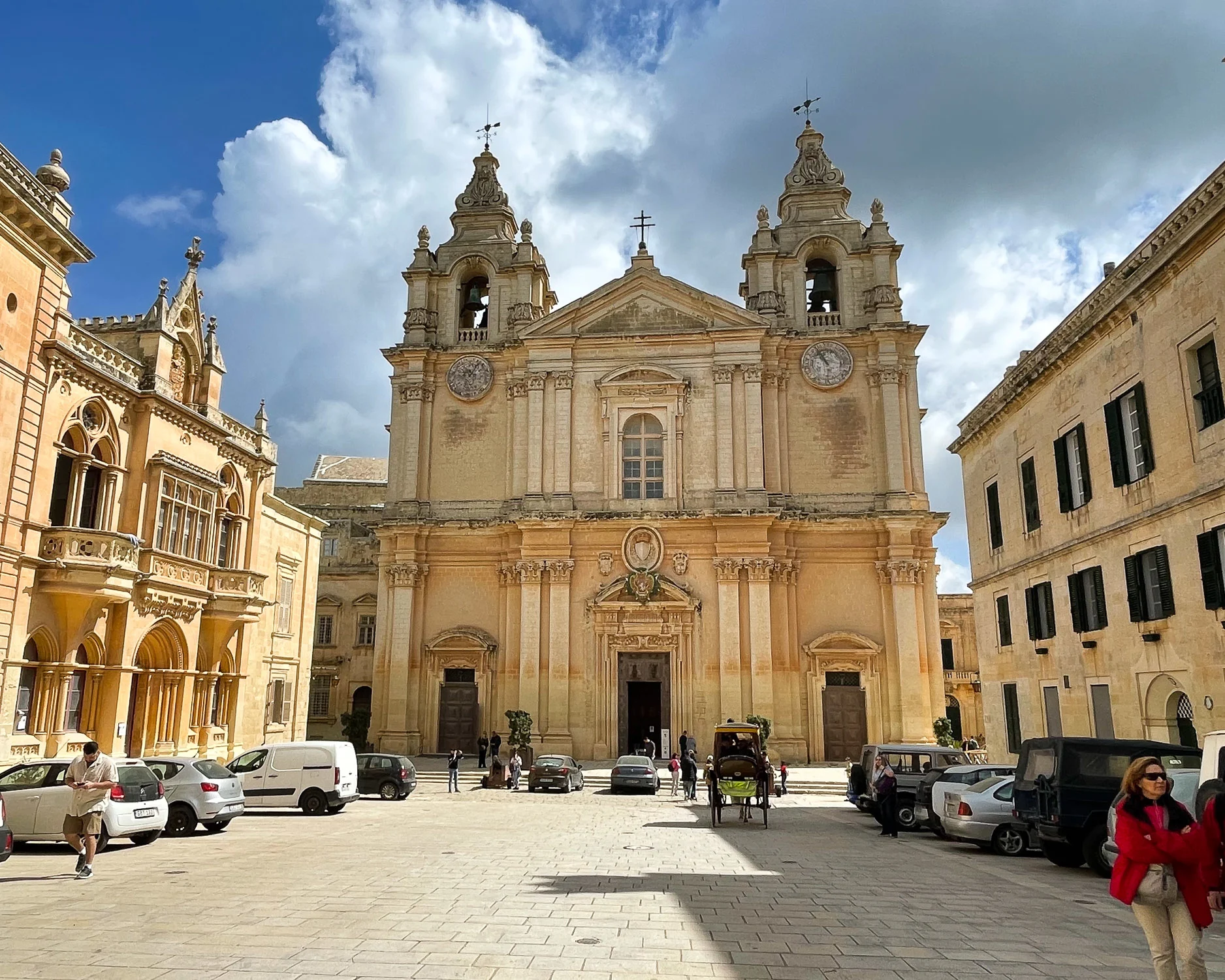
Best things to do in M’dina
St Paul’s cathedral – Looking out onto St Paul’s Square is the elegant Baroque facade of M’dina’s 18th century cathedral. The interiors of St Paul’s Cathedral are richly decorated with gilding, frescoes and coloured marble. Your ticket also covers the cathedral museum next door. Tickets €10
Palazzo Falson – Continue along M’Dina’s main street to find the elegant 13th century Palazzo Falson owned by a Maltese noble family. Enter through the honey stone courtyard and tour the beautifully furnished Palazzo rooms on two floors. The palazzo was most recently owned by Captain Olaf Gollcher, a Swedish ship owner and artist, whose paintings are on display in his ground floor studio. Tickets €12
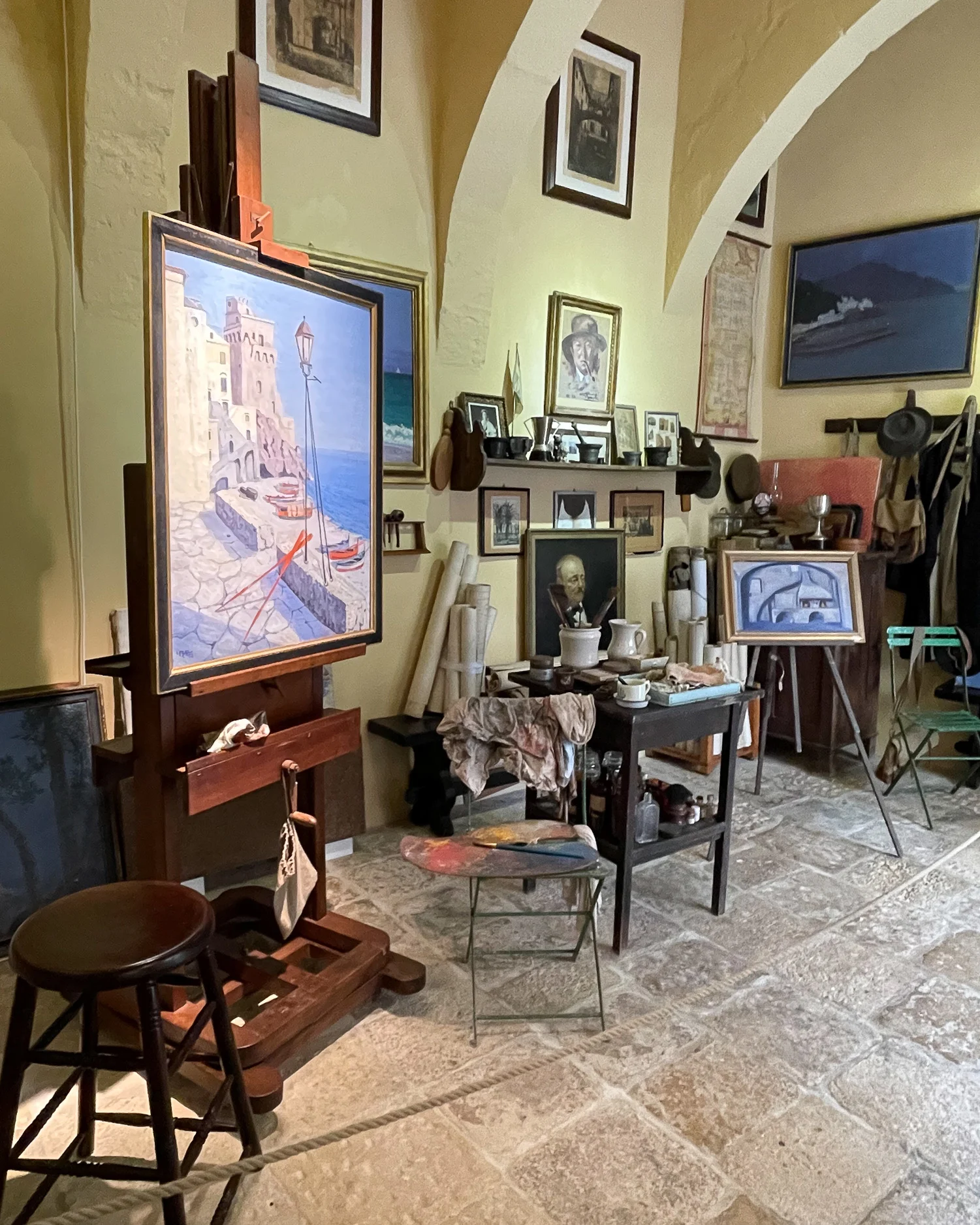
Views from the ramparts at Bastion Square – At the end of M’Dina’s main street is Bastion Square, where a walkway on the ramparts gives lovely views over the countryside. Refreshments are available nearby in the shady courtyard of Coogi’s or the rooftop Fontanella Tea Garden.
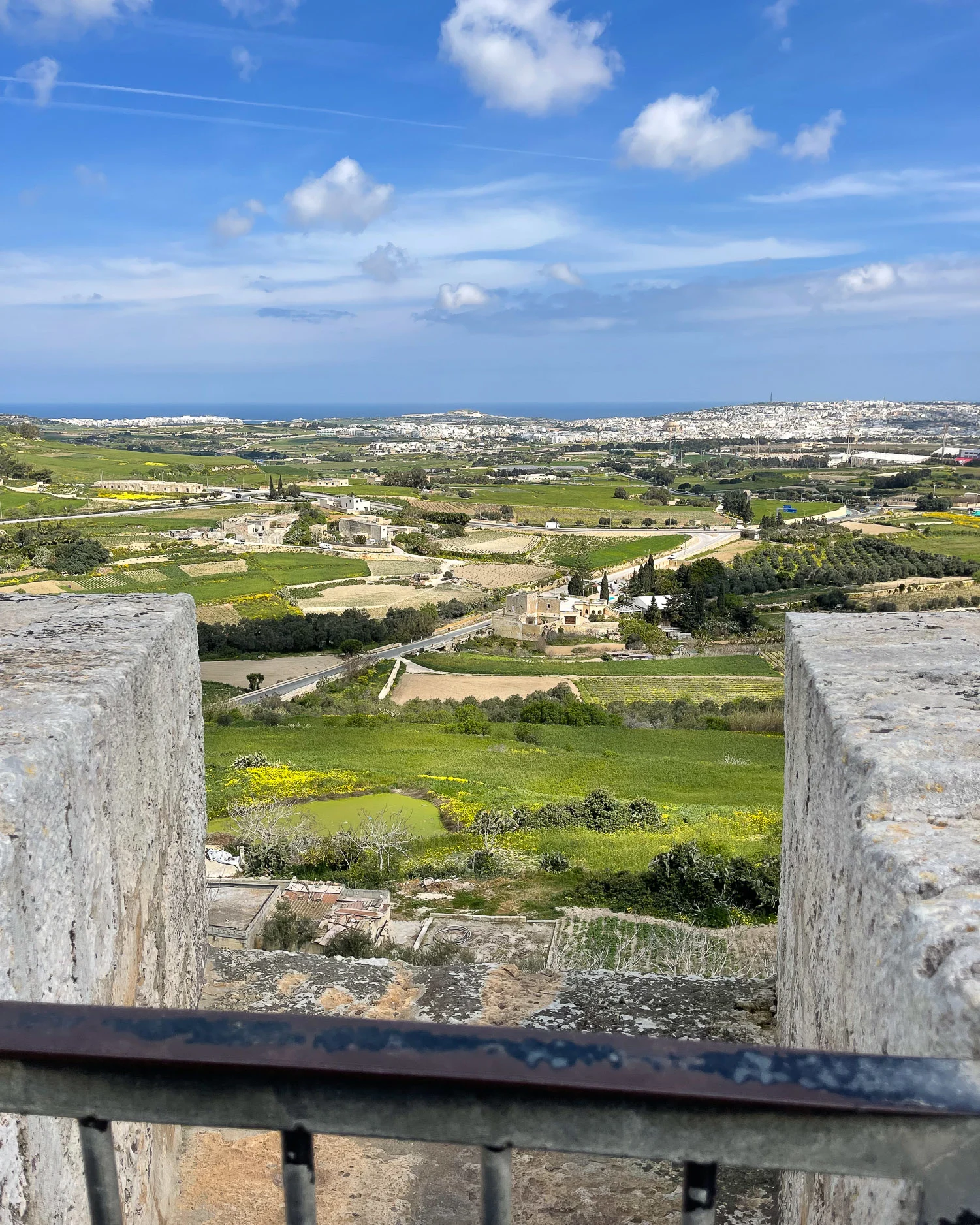
Get lost in the narrow streets – spend some time wandering the narrow alleyways and streets which are mostly pedestrianised, although watch out for the odd passing horse and carriage! Enjoy the quiet spaces, carved doors and ornate door knockers of this inscrutable old city and imagine how it must once have bustled with life.
Mdina Glass – If you like locally made souvenirs, pop into Mdina Glass, close to the main M’dina gate. It’s a family run business selling colourful art glass that’s made on the island.
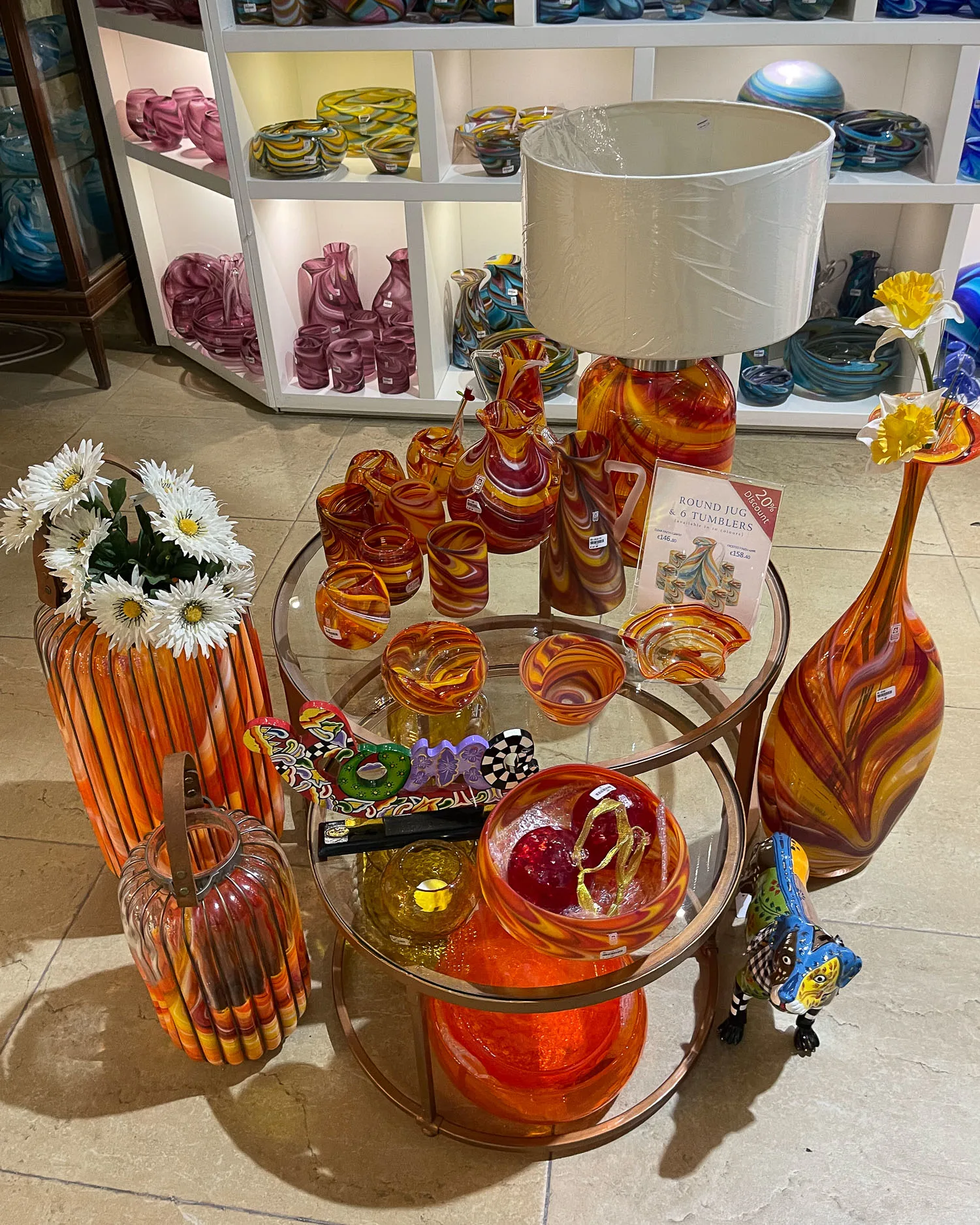
Vilhena Palace – You can walk into the courtyard of the impressive Vilhena Palace, named after the Grand Master Antonio Manuel de Vilhena who built it in 1728. It now houses the National Museum of Natural History with displays of local flora and fauna. Tickets €5
Tip: Try the excellent Michelin awarded Medina Restaurant for lunch or dinner. The restaurant specialises in Mediterranean and Maltese cuisine, set in the courtyard of a Medieval stone townhouse.
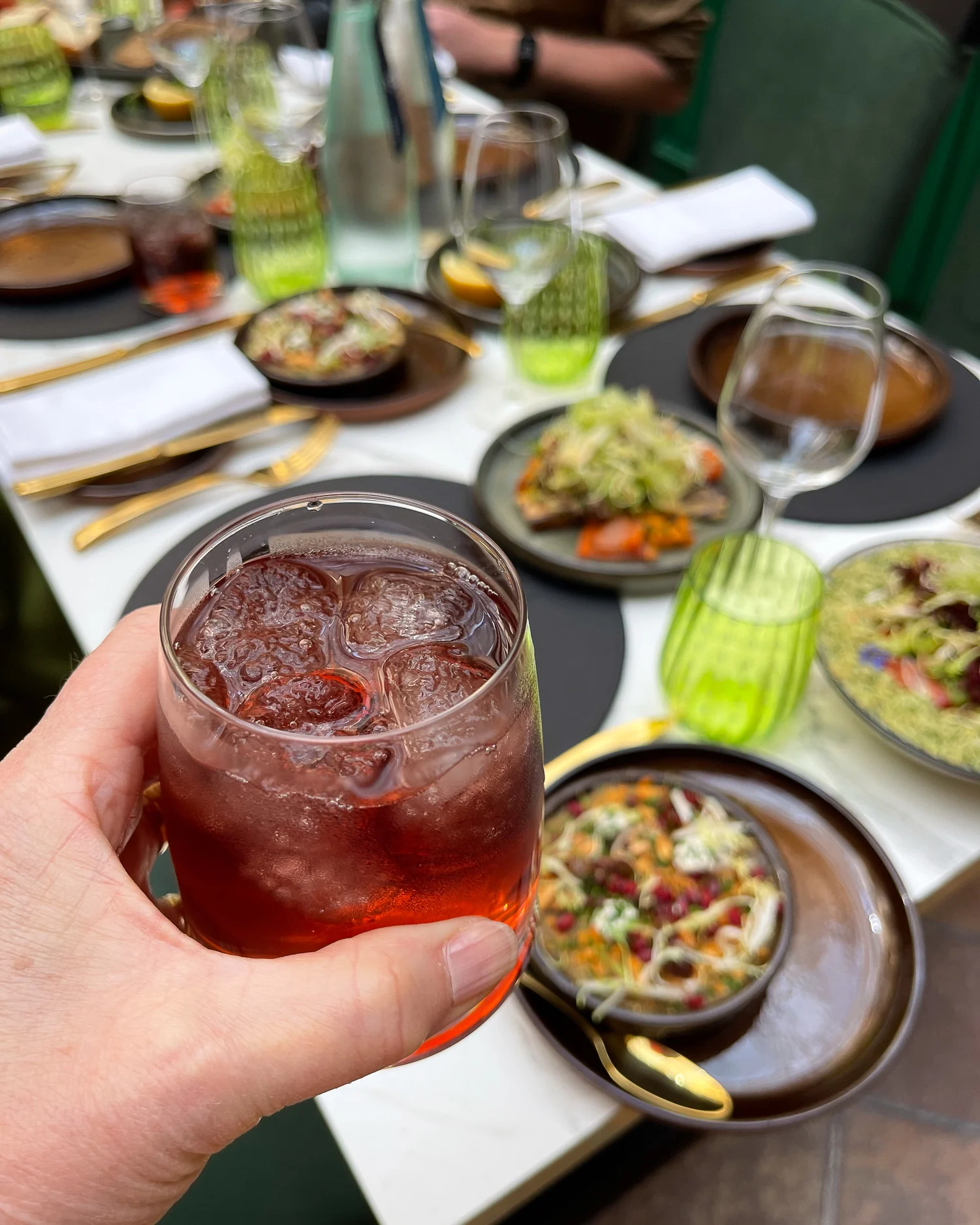
M’dina is easily reached on the Line 52 bus from Valletta bus station, with the journey taking around 30 minutes, depending on the traffic.
Tour options for M’dina and Rabat
M’dina and Rabat Walking tour with Catacombs – a 2.5 hour walking tour with a guide, including the ticket to visit the St Paul’s Catacombs in Rabat. Book here.
M’dina and Rabat Walking Tour – Take this M’dina and Rabat walking tour with a local guide to discover the highlights of the historic walled city. Book here.
From Valletta: Rabat, Mdina and San Anton Gardens Tour – a 5 hour tour with hotel pickup from Valletta, starting at San Anton Gardens, and tour with a guide around Rabat and M’dina. Book here.
Mdina, Dingli Cliffs and San Anton Gardens – this half day tour including hotel pick up, takes you to M’dina, with views from the Dingli Cliffs and ending at the San Anton Gardens. Book here.
Where to stay in M’dina
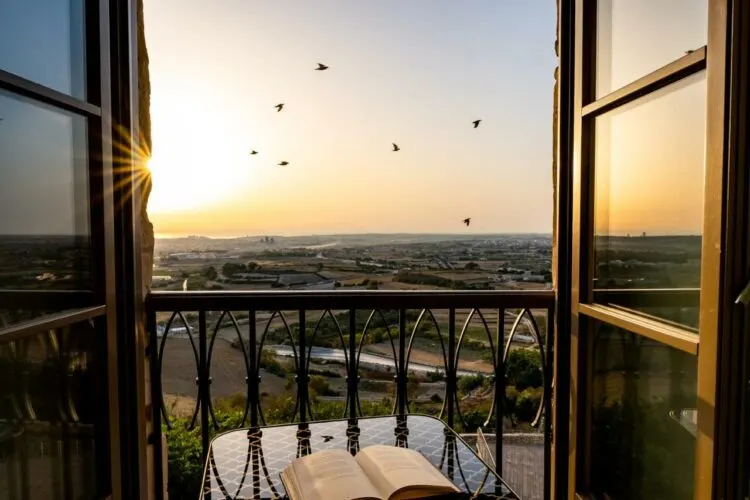
The Xara Palace Relais & Chateaux is a luxury boutique hotel in a 17th century Palazzo within the M’dina city walls
7. Rabat – outside the walls of M’dina
Outside the walls of M’dina is the more recently built town of Rabat, with buildings from the 18th and 19th century. A stroll around this neighbourhood reveals even more places worth visiting, and together Rabat and M’Dina make a great day out.
Domus Romana – This museum is built in the style of a Roman Villa on the site where a Roman townhouse stood. Domus Romana houses an interesting collection of mosaic floors, marble statues and artefacts, as well as explaining what life would have been like for a wealthy Roman family. Tickets €6
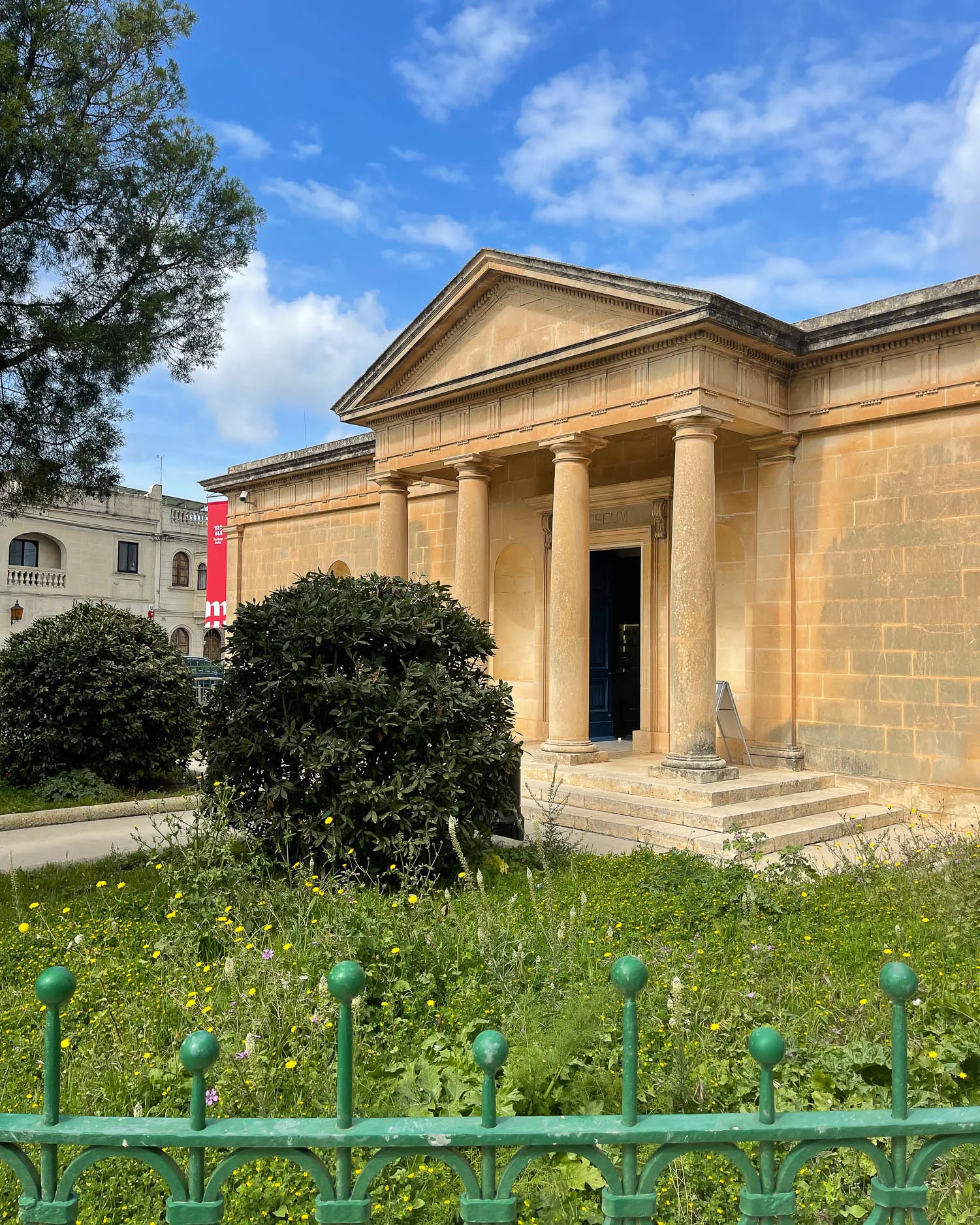
Howard Gardens – Just outside the main M’dina gate, the Howard Gardens offers shady trees and benches to rest, with a childrens’ play area.
Casa Bernard – This 16th century palazzo is also a family home, which is open for guided tours. At Casa Bernard you’ll visit the charming living rooms furnished with antiques and paintings collected over the generations, family chapel and courtyard garden.
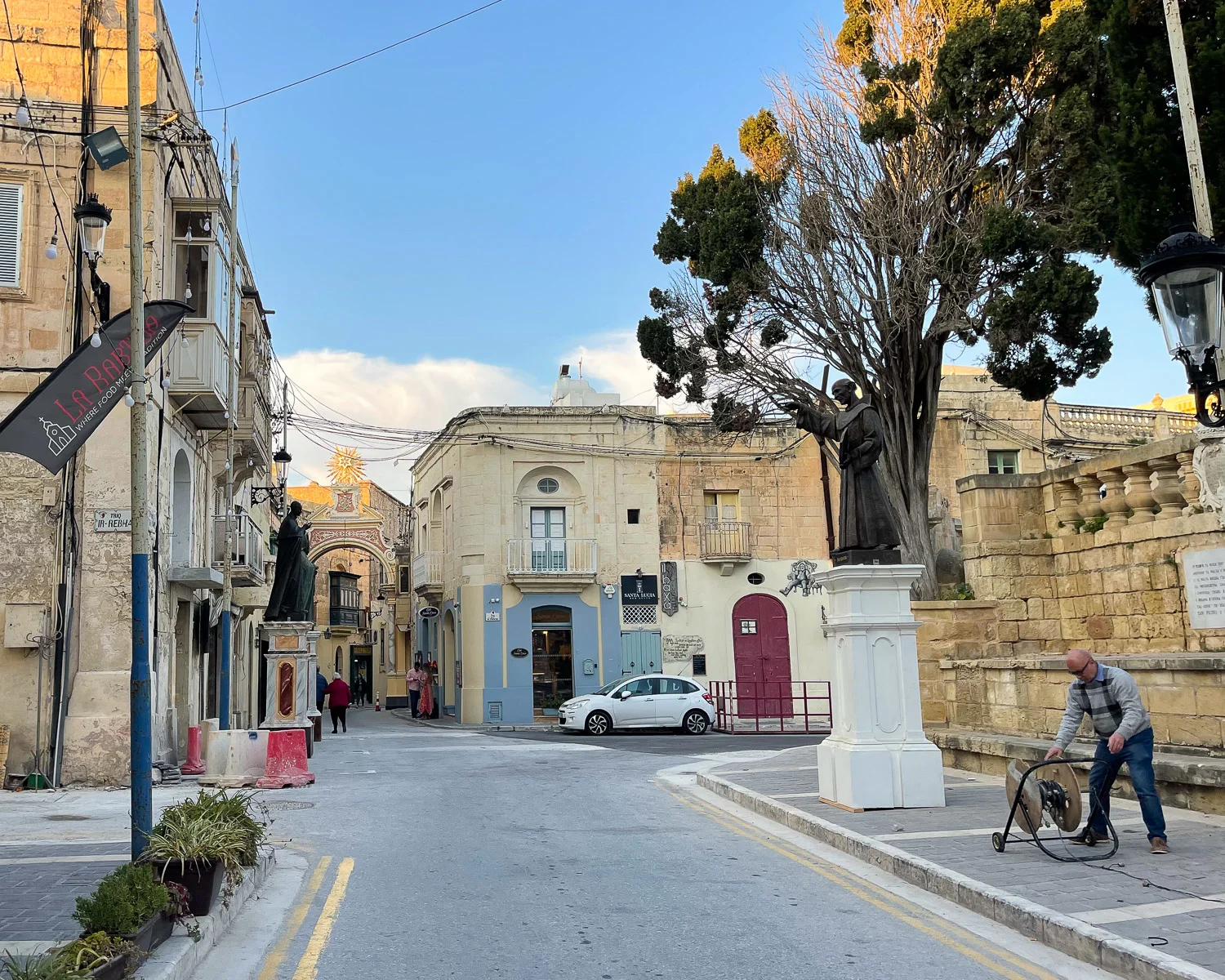
Visit the Roman catacombs – Past the Rabat town square are several Roman catacombs that can be visited, the largest of which is St Paul’s Catacombs. Here you’ll descend to walk through the stone hewn burial chambers and see halls where meals were held to commemorate the dead. Tickets €6. Nearby you can also visit St Agatha’s crypt, catacombs and museum, with burial chambers extended from a natural cave under St Agatha’s church.
Sample some Pastizzi – Just by the car park call in for a drink at Il-Sirkin (Crystal Palace Bar), a small bar that sells some of the best Pastizzi on the island and also owns the cake shop next door.
Where to stay in Rabat
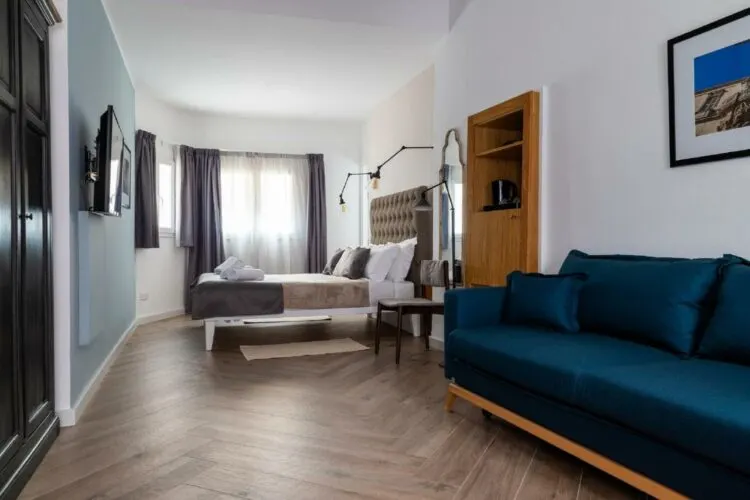
MYN in Rabat is a budget boutique hotel in the old quarter of Rabat, close to the M’dina old city
8. Marsaxlokk fishing village
Marsaxlokk is a fishing town set in a broad bay and home to a bustling market that’s busiest on a Sunday. This is the day when you’ll find numerous stalls selling fresh fish to restaurants and locals alike. Marsaxlokk is also known for the brightly painted wooden fishing boats known as Luzzu, that bob in the harbour and make a great photo.
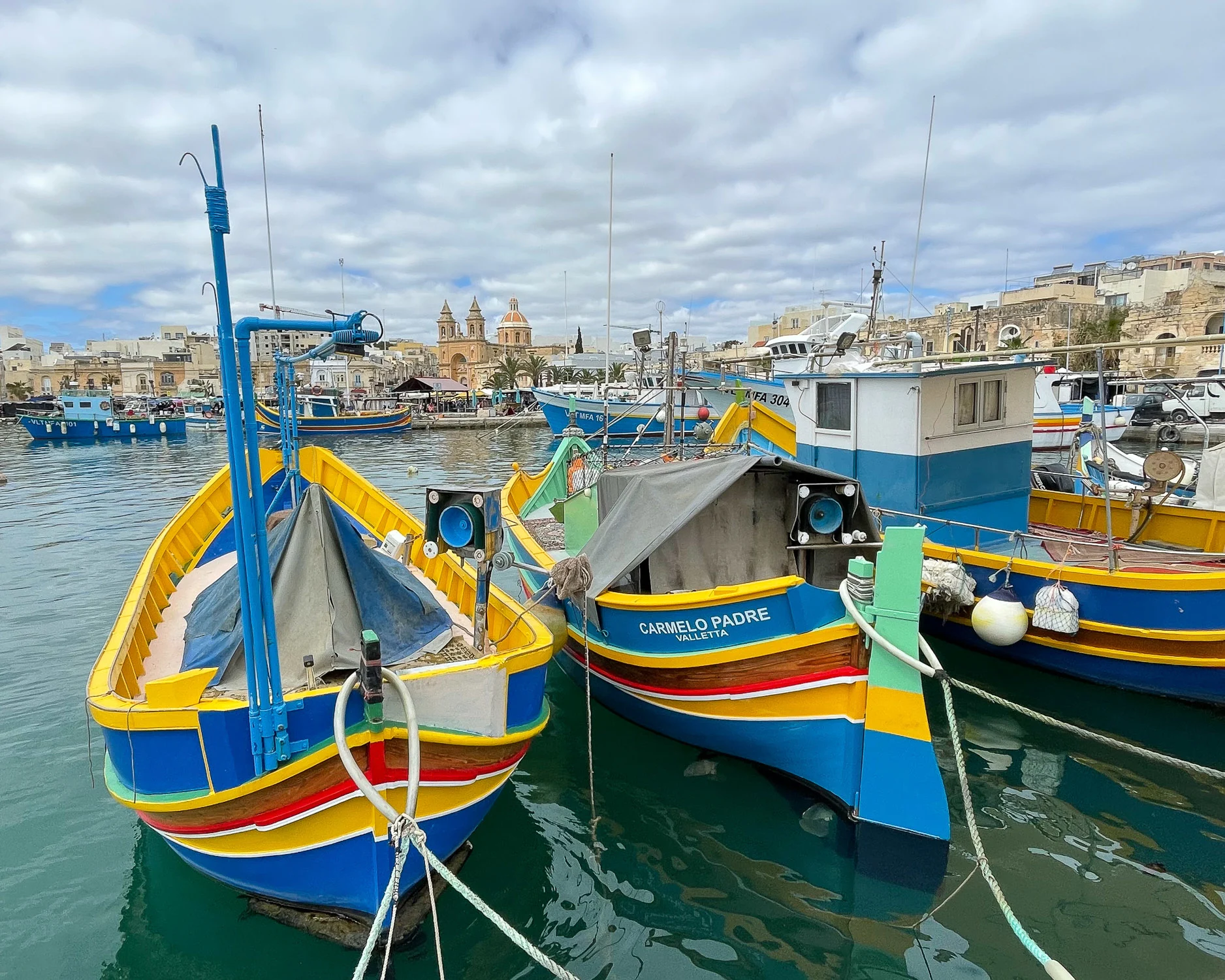
Arrive by bus from Valletta in the morning and then check out the different fish restaurants along the harbourfront. If it’s the weekend, be sure to book on arrival, or in advance if you know where you want to eat. We dined at one of the best Tartarun, which is a quietly upscale restaurant that specialises in locally caught fish and seafood.
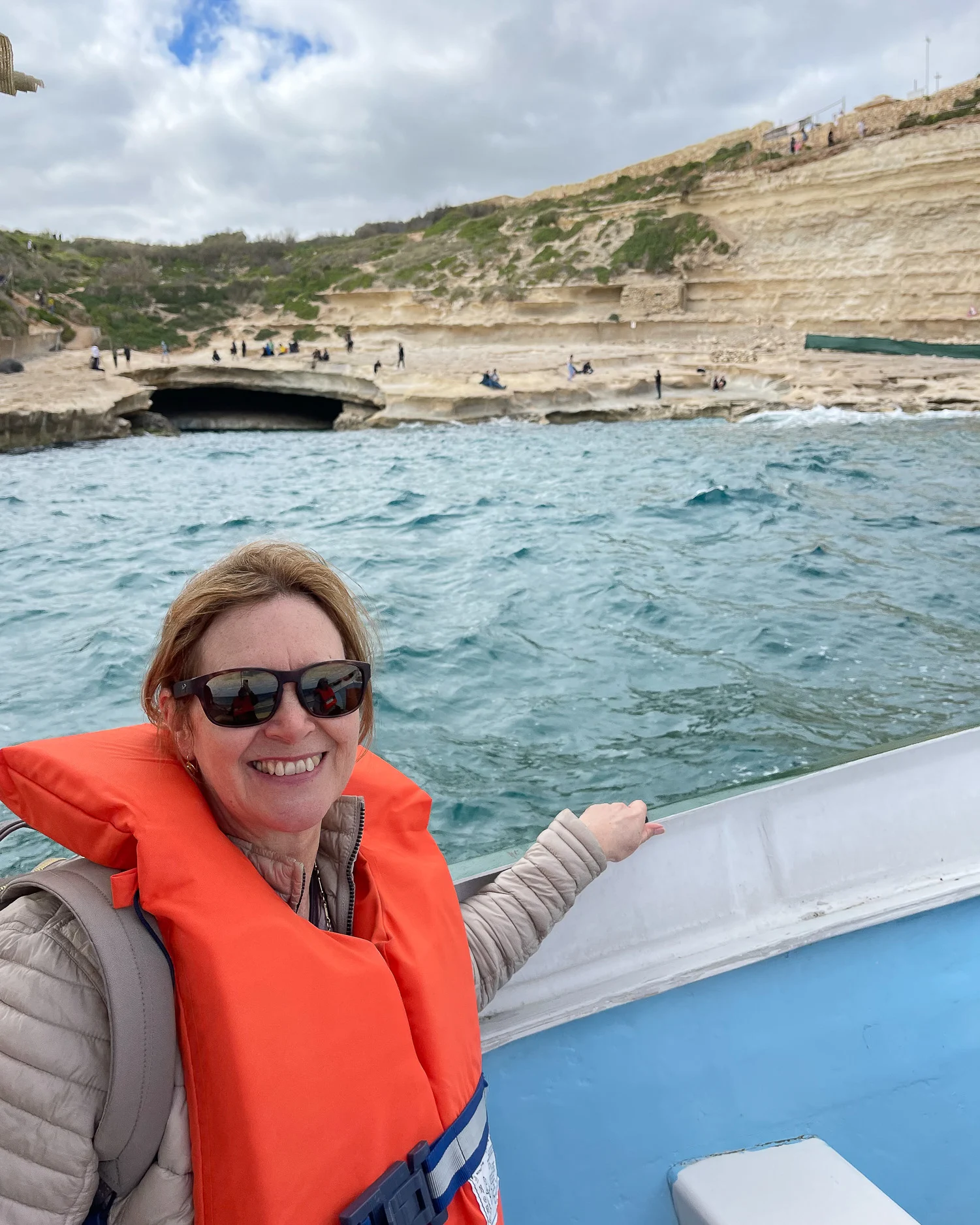
After lunch, you may like to take a boat trip on one of the traditional wooden boats, to see the coastline and visit St Peter’s Pool around the headland.
Tour options for Marsxlokk
Marsaxlokk, Blue Grotto and Qrendi – The 4.5 hour tour includes hotel pickup from Valletta. Spend time wandering around Marsaxlokk before a stop at the Blue Grotto viewpoint and the traditional village of Qrendi. Book here.
Hop on Hop off Bus South (Red) Route – The Hop on Hop off bus south route from Valletta stops at Marsxlokk as well as many other locations. Book here.
Where to stay in Marsaxlokk
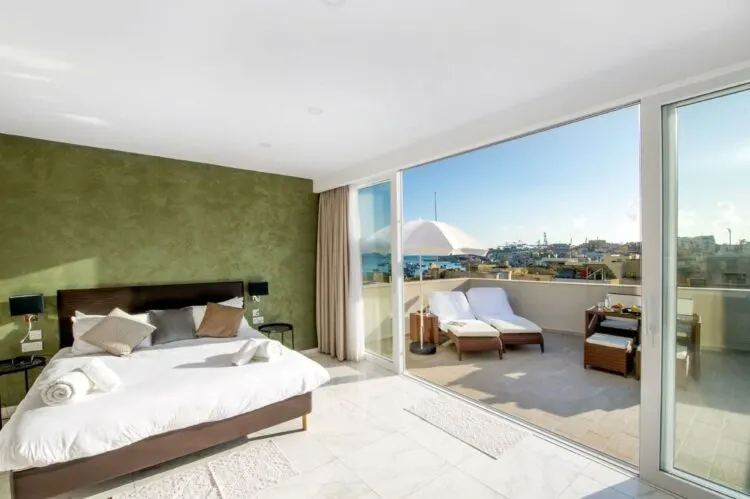
The South Wind Guest House is a stylish modern guest house near the harbour in Marsaxlokk
9. Dingli Cliffs – for sea views
Located on Malta’s western coast, the Dingli Cliffs mark the highest elevation point on the island. Because of the stunning viewpoints over the sea, with easy access by car or walking, the cliffs are a popular place to watch the sunset.
Look out for the tiny chapel dedicated to Mary Magdalene, which marks the highest point on the cliffs and has a small parking area. Access to the cliffs is via the Triq Panoramika road that follows the coast and can be approached from either M’dina or Siggiewi.
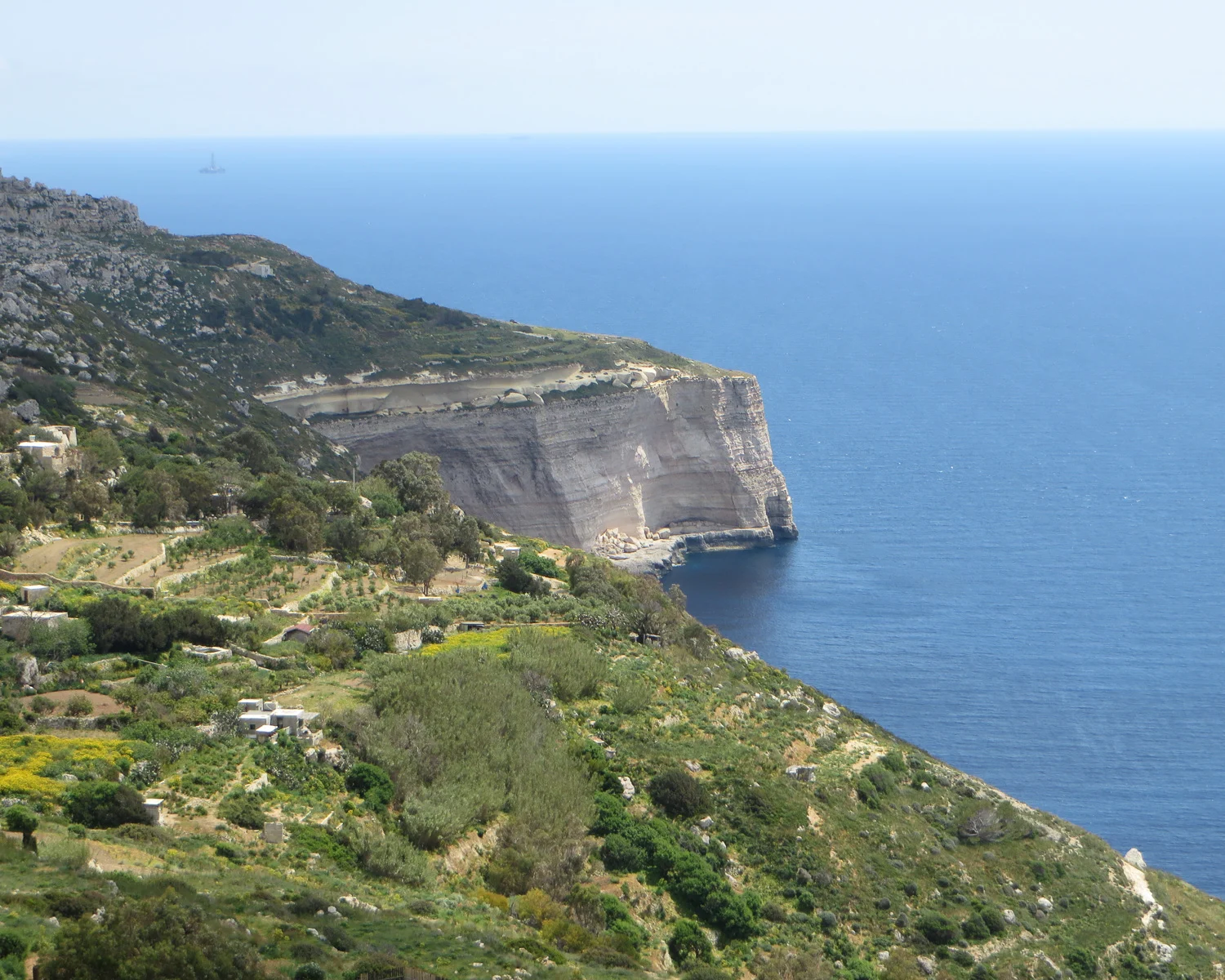
The cliffs continue beyond Dingli, with a walking path that skirts the cliffs south to the Blue Grotto. You’ll pass a stone opening framing the view known as the Gebel Ciantar window and then the Hagar Qim megalithic site, before reaching the Blue Grotto in a walk that takes around 3 hours.
10. Megalithic Temples of Malta
Malta is home to several megalithic temples, which are well preserved and open to visit.
Ħaġar Qim and Mnajdra archaeological park
Overlooking the sea on Malta’s south-west coast, these two groups of buildings are over 5,000 years old. Excavations started on the sites two centuries ago and due to deterioration, new shelters are used in some places to protect the stone from the elements. You’ll see enclosures made of enormous stone slabs, with some copies of the original relief carvings on display.
The site is open daily from 10am to 6pm. Tickets cost €10 and must be purchased in advance
Hop on Hop off Bus South (Red) Route – The Hop on Hop off bus south route from Valletta stops at Ħaġar Qim and Mnajdra Temples as well as many other locations. Book here.
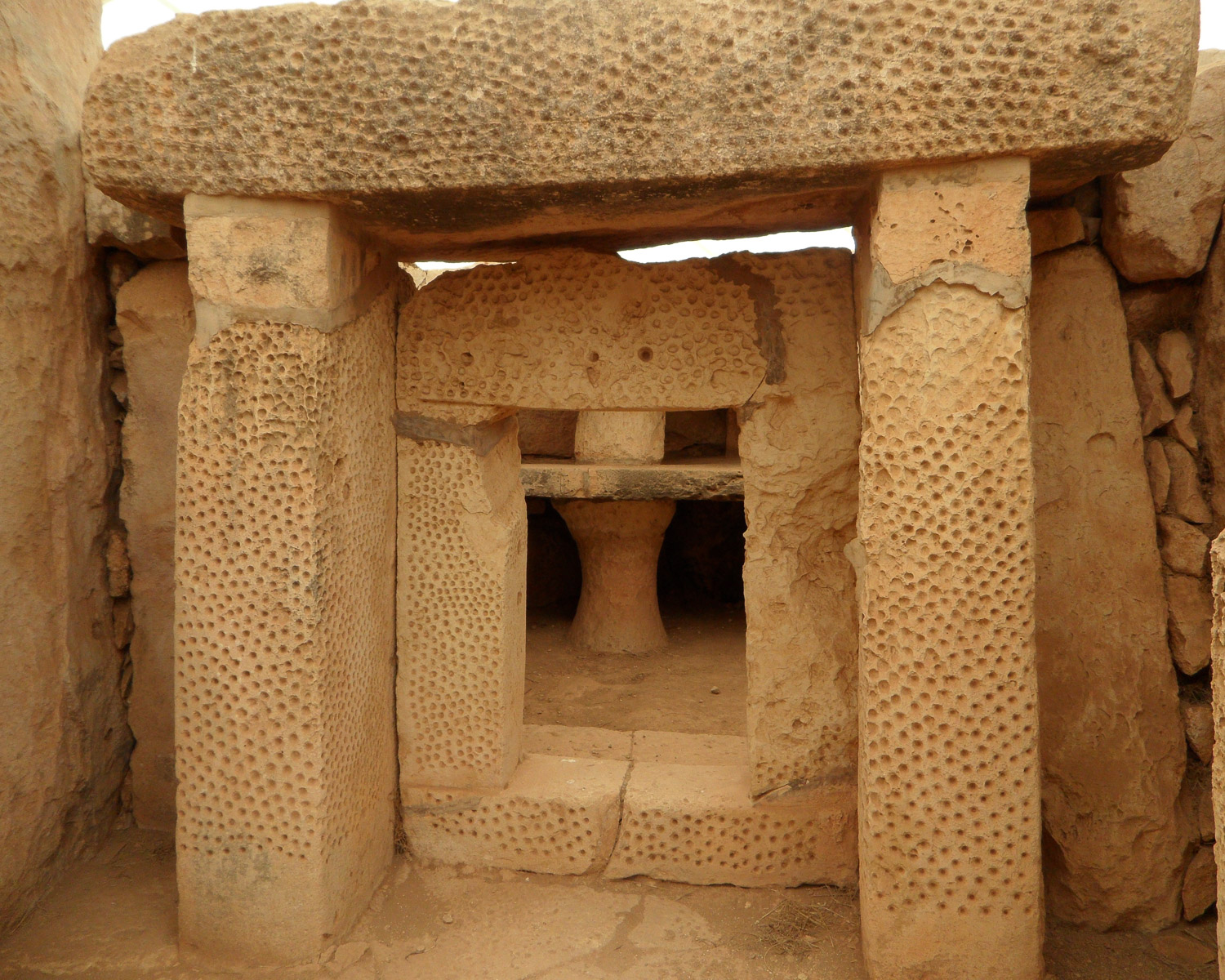
Ħal Saflieni Hypogeum
This underground burial complex covers over 500 square metres, with walkways that take you through the various chambers. Located on a hill close to the Grand Harbour, it was discovered and excavated between 1902 and 1911. Hundreds of artefacts such as pottery, bones, carved figurines, and personal items were recovered from the site.
A walk through the three levels of the complex reveals burial chambers, niches and coloured wall decoration. Because of the delicate state of the Hypogeum, only 80 visitors per day are allowed in and so tickets must be purchased online, well in advance. Tickets cost €35.
Hop on Hop off Bus South (Red) Route – The Hop on Hop off bus south route from Valletta stops at the Hypogeum as well as many other locations. Book here.
Tarxien Temples
These Neolithic sites (which were later adapted into a Bronze Age graveyard) are just a few minutes’ walk from the Hypogeum. Walkways enable visitors to walk through the different stone chambers of the site, which are believed to have served as temples. There are many examples of prehistoric art depicting livestock, which shows their importance in early Neolithic society. Adult tickets are €6 and must be purchased online in advance.
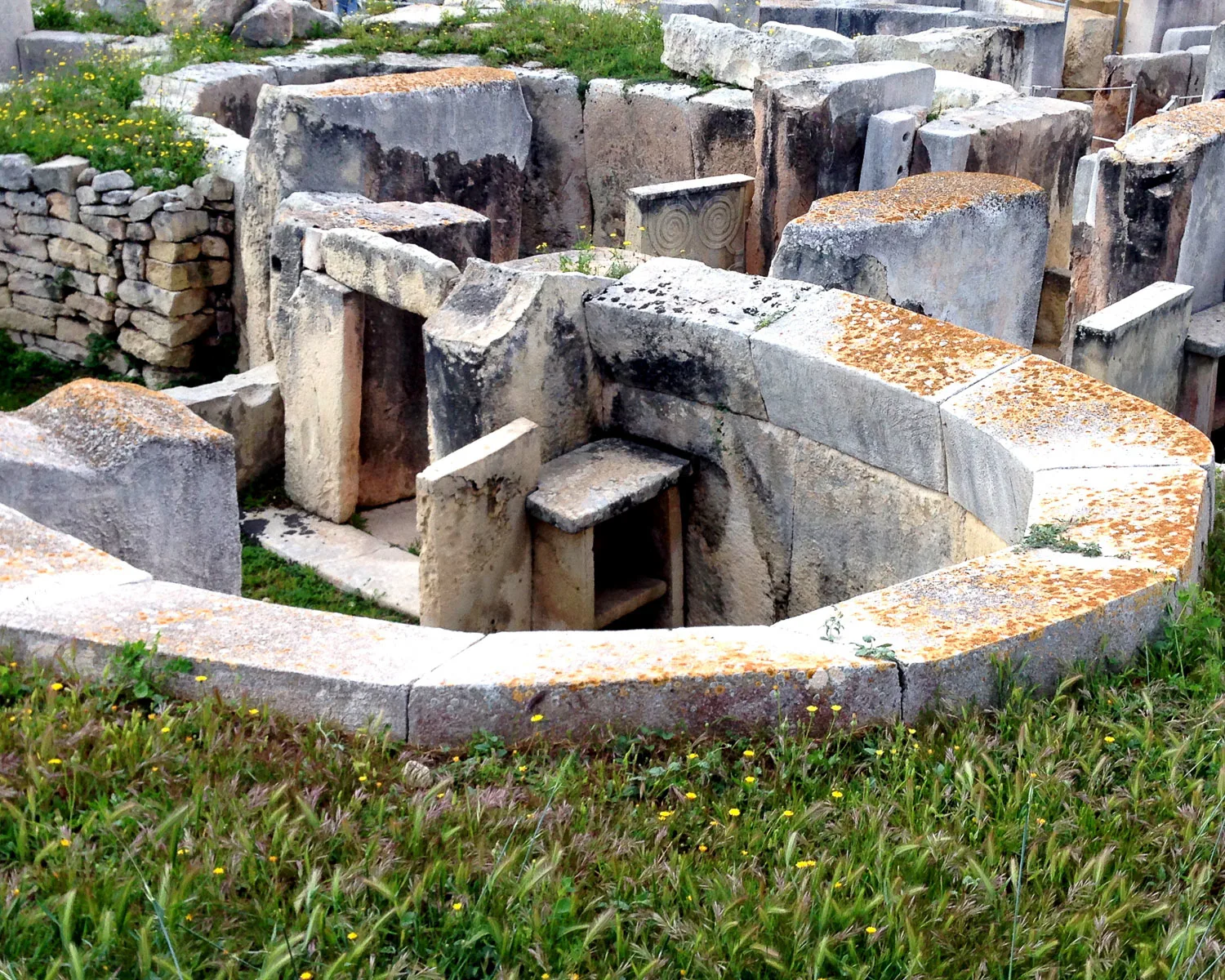
On the nearby island of Gozo, other megalithic temples can be found, notably the Ġgantija temple complex. You can read more about this in my article on 13 fun things to do in Gozo
11. Blue Grotto – boat trips and sparkling water
One of Malta’s best-known attractions is the Blue Grotto, a complex of six sea caves that line the rocky shore of the south coast.
The caves are popular due to the clear blue water and towering rocky cliffs, which are best viewed from a boat tour provided by expert Maltese boatmen. This is also a popular spot for swimming, snorkelling, and diving with clear, sparkling water and phosphorescent underwater colours.
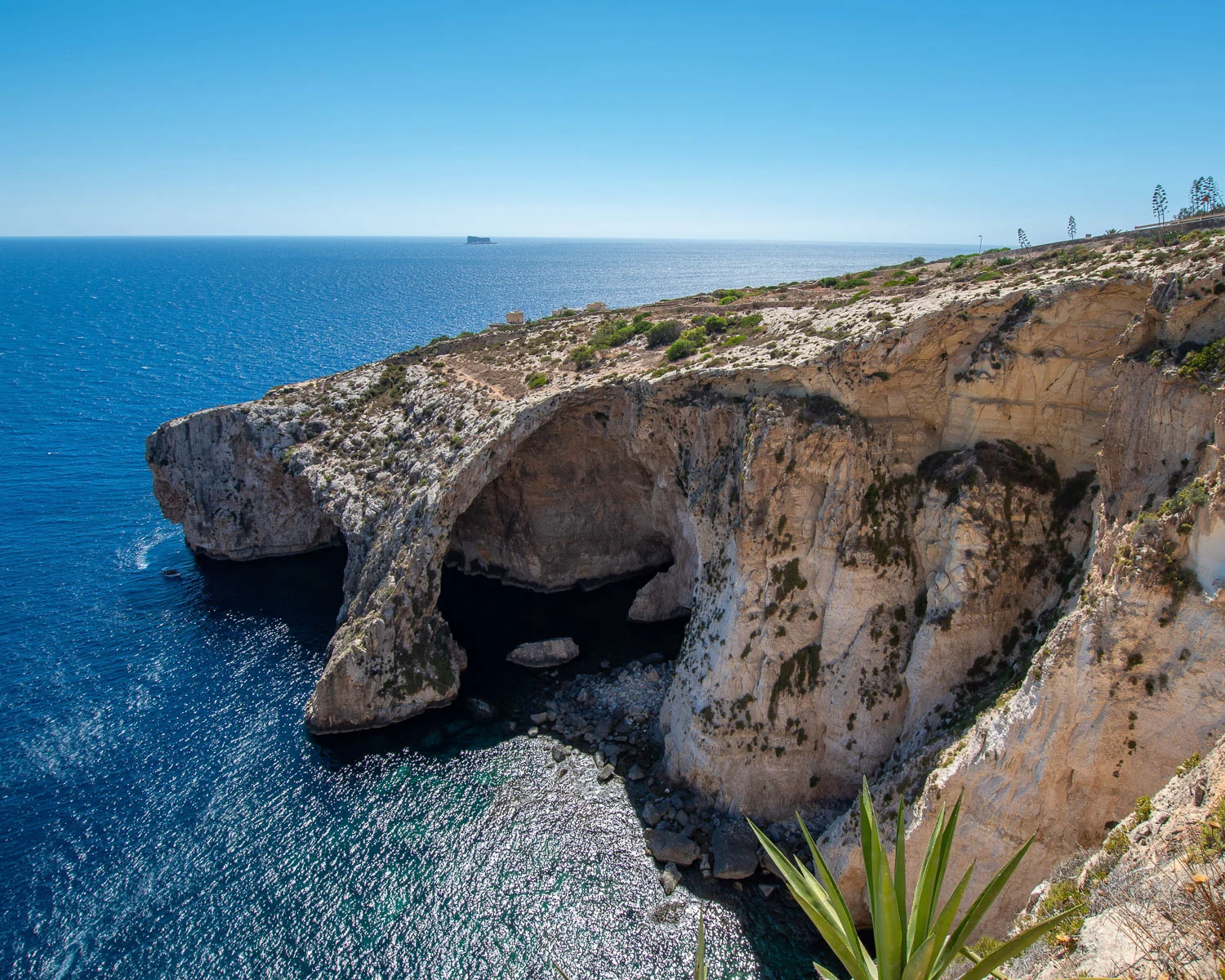
Most boat tours range from 3-6 hours and leave from the nearby harbour of Wied iż-Żurrieq. We recommend taking a boat trips in the morning, when the seas are calmer and the sun lights up the water in the caves.
To see the beautiful clear waters and rocky grotto from above, find the viewpoint at the top of the cliffs by the car park. It has stunning panoramic views overlooking the sea and natural limestone arch that makes up the grotto.
Hop on Hop off Bus South (Red) Route – The Hop on Hop off bus south route from Valletta stops at The Blue Grotto as well as many other locations. Book here.
12. San Anton Gardens – Malta’s public gardens
The San Anton Gardens in the centre of Malta are probably the island’s best-known gardens. They were laid out in the 17th century by Grand Master Antoine de Paule, to surround his country villa. While the gardens opened to the public from 1882, the San Anton Palace that sits within them became the residence of the British governor, and is now the summer palace of the President.
The garden is lush and green, full of winding pathways, trickling fountains, ponds, and stone sculptures. In spring and autumn flowering shrubs and bedding displays provide colour, while trees offer welcome shade in the hotter summer months. Plantings include groves of orange and lemon trees, jacaranda, bougainvillea and roses.
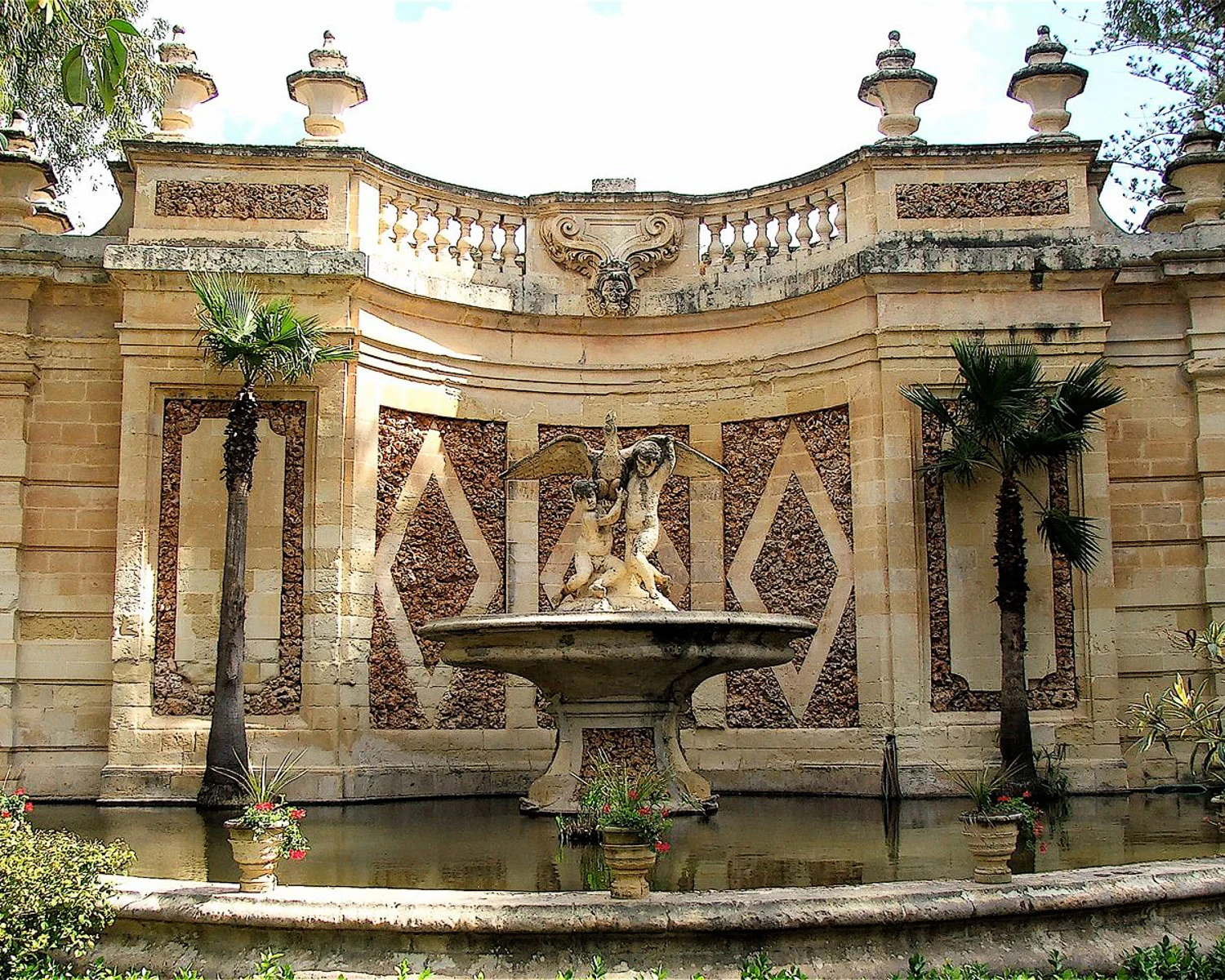
Look out for the terrapins that swim in the central pool with fountains, and the peacocks that roam the gardens. Every year in May, the garden hosts a Horticultural Show, with its central court transformed into an outdoor theatre.
The gardens are open daily to the public and are free of charge.
Tip: Very close to the San Anton Gardens is the elegant Corinthia Palace Malta Hotel. It also has pretty gardens and is a good place to try afternoon tea in the drawing room of Villa Corinthia, or coffee in the garden cafe.
Tour options for San Anton Gardens
From Valletta: Rabat, Mdina and San Anton Gardens Tour – a 5 hour tour with hotel pickup from Valletta, starting at San Anton Gardens, and tour with a guide around Rabat and M’dina. Book here.
Mdina, Dingli Cliffs and San Anton Gardens – this half day tour including hotel pick up, takes you to M’dina, with views from the Dingli Cliffs and ending at the San Anton Gardens. Book here.
Hop on Hop off Bus North (Blue) Route – The Hop on Hop off bus north route from Valletta stops at San Anton Gardens as well as many other locations. Book here.
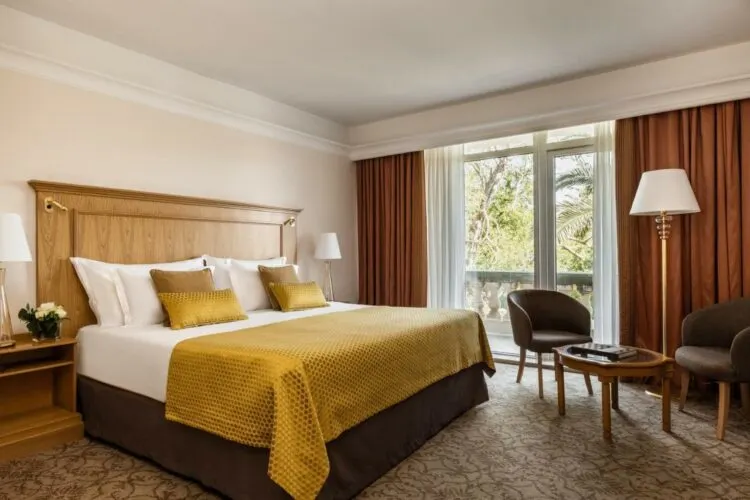
Stay at the Corinthia Palace – an elegant luxury hotel close to San Anton Gardens
13. Mosta Rotunda – ornate basilica and dome
Mosta Rotunda is an imposing Roman Catholic basilica in Mosta, located inland between M’Dina and St Julian’s. With a dome that’s the third largest in the world, the design was heavily based on the Pantheon in Rome.
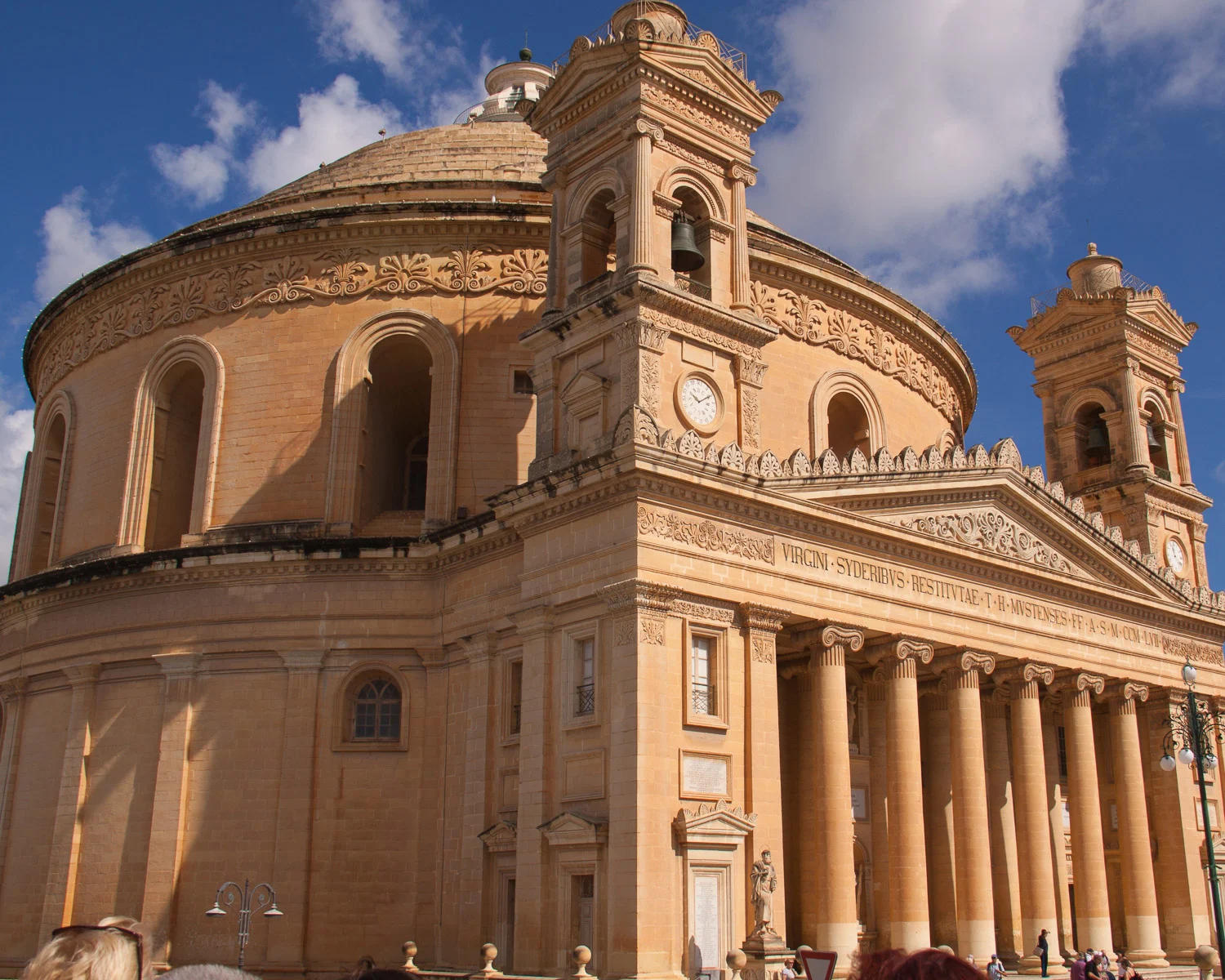
The basilica was built in the 17th century on the site of an older church, and offers beautifully painted interiors. A staircase leads up to the roof of the dome, with views over the surrounding area and looking down into the church from above.
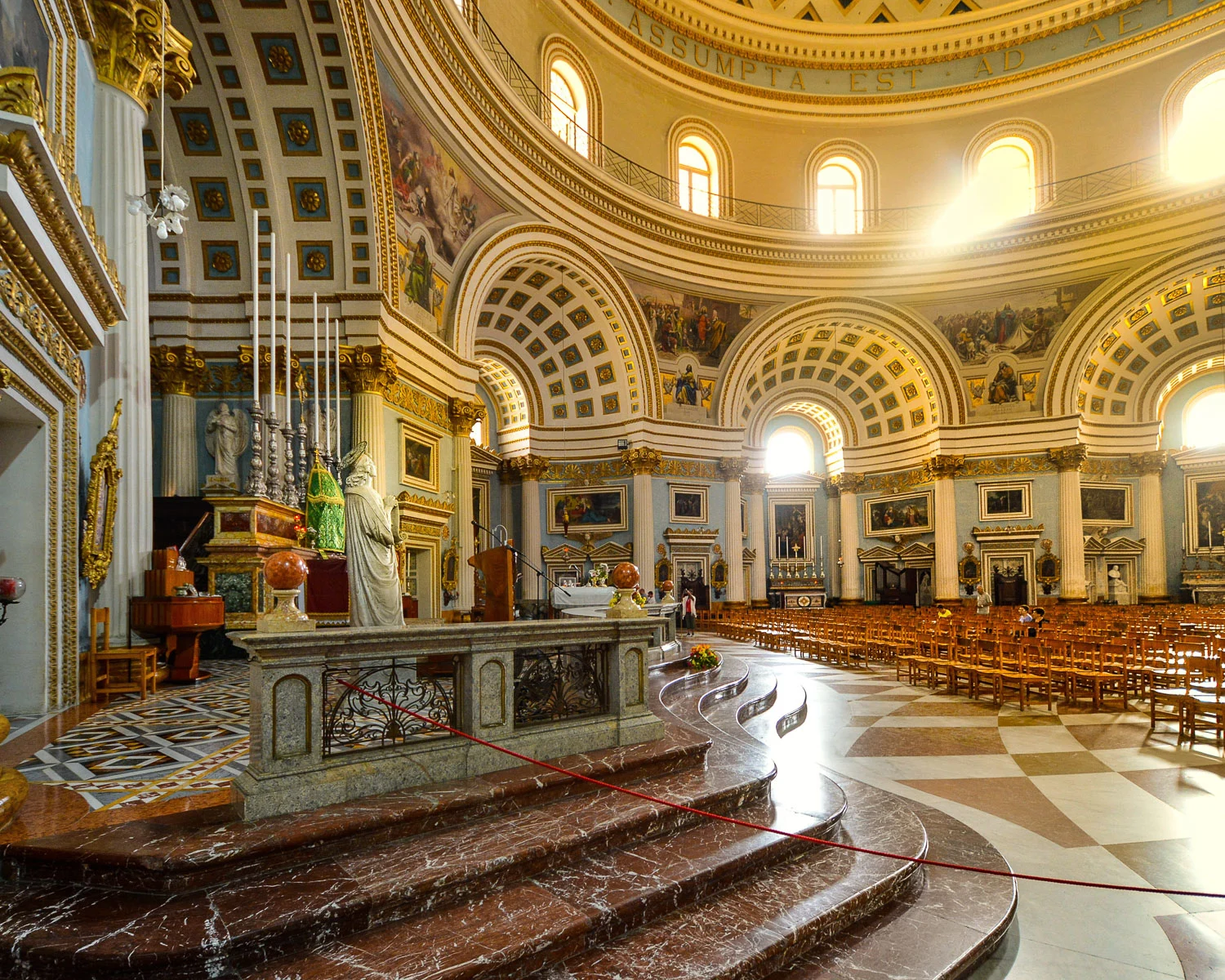
During World War II, a bomb blasted through the dome and landed inside the church, but miraculously never detonated. The original bomb was safely disposed of, but a replica is on display in the church museum. If you descend the stairs to the crypt, you can see how it was used in WW2 as an air raid shelter.
Hop on Hop off Bus North (Blue) Route – The Hop on Hop off bus north route from Valletta stops at Mosta Church as well as many other locations. Book here.
14. Palazzo Parisio – elegant palazzo and gardens
Very close to Mosta is the pretty neighbourhood of Naxxar, best known for the beautiful 20th-century Art Nouveau palace of Palazzo Parisio.
The Palazzo passed between different noble families until the late 20th century when it was opened to the public. Today, you can take a tour of the Palazzo’s baroque interiors and observe the rich design details, with sweeping marble staircase, frescoes and gilded ceilings.
The palace grounds include an elegant walled garden in classical Italianate style, with an orangery and grotto. A garden bar and Luna restaurant serve breakfast, brunch, lunch, afternoon tea and dinner at weekends. Be sure to reserve a table, and check opening times since the Palazzo and restaurants are often used as a wedding venue.
The palace, gardens and garden bar (ticket €15) are open Tuesday to Sunday, while the adjacent Luna Restaurant is only open for dinner Friday and Saturday.
15. Food in Malta – try the local specialties
The food of Malta reflects the island’s position at the heart of the Mediterranean, drawing on a multitude of different influences. You’ll find cinnamon and cloves from North Africa, pasta and kannoli from nearby Sicily, the tastes of Provence and Andalusia brought by the Knights of St John and British influences from the 1800s. Here are some typical Maltese dishes to look out for:
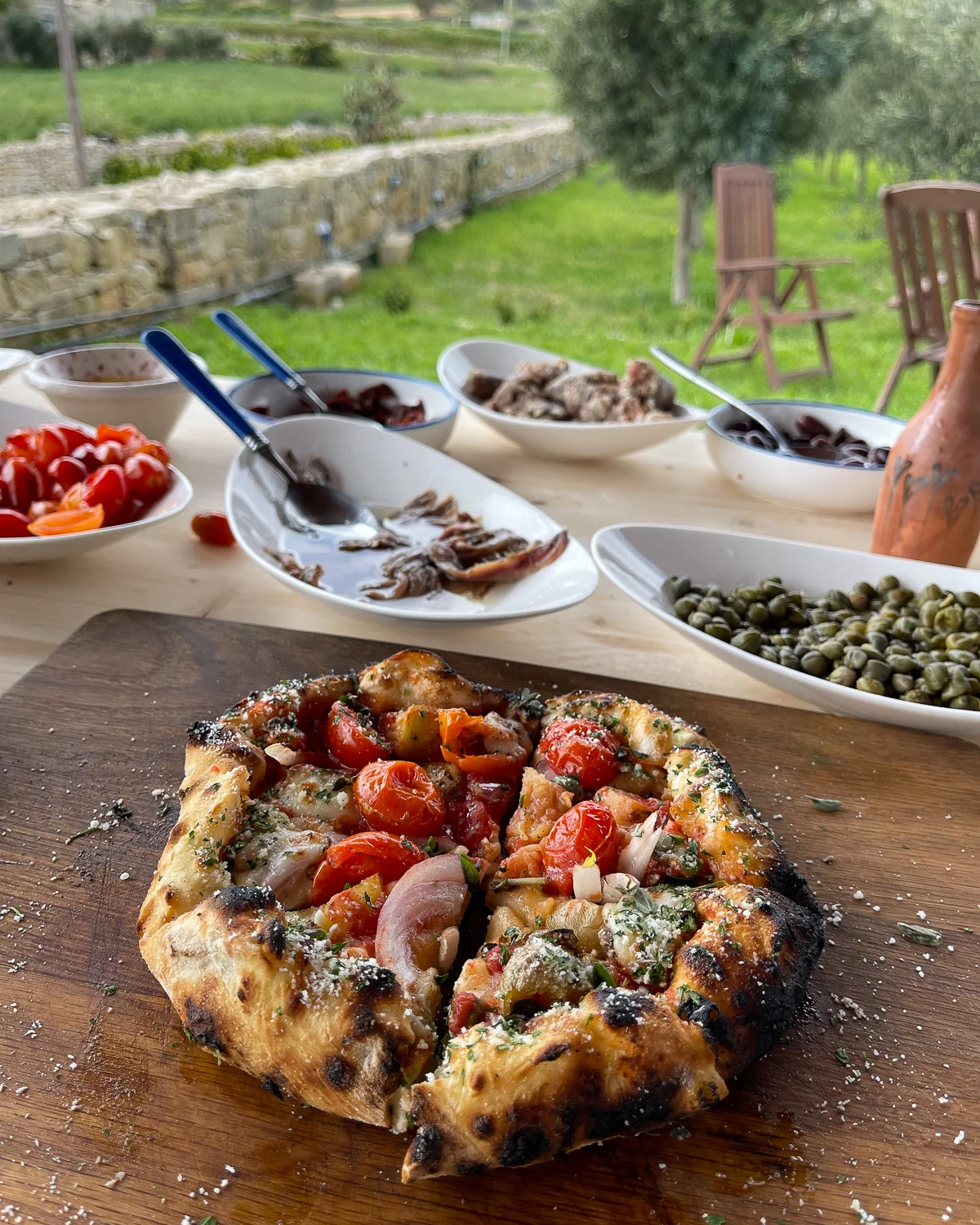
Ftira – a Maltese bread with a unique spongy texture and crunchy crust that was traditionally baked in a wood fired oven. Gozitan Ftira is a variation that sees the bread base topped like a pizza with local cheese, potatoes and olives.
Pastizzi – these pastries are a typical street food in Malta, with a flaky filo pastry and fillings of ricotta cheese or soft pea mixture.
Ġbejniet – this sheeps cheese was traditionally made at home and is served in small rounds known as cheeselets. Another popular cheese is ricotta, which is used in deserts and to stuff the Sicilian inspired Kannoli cakes.
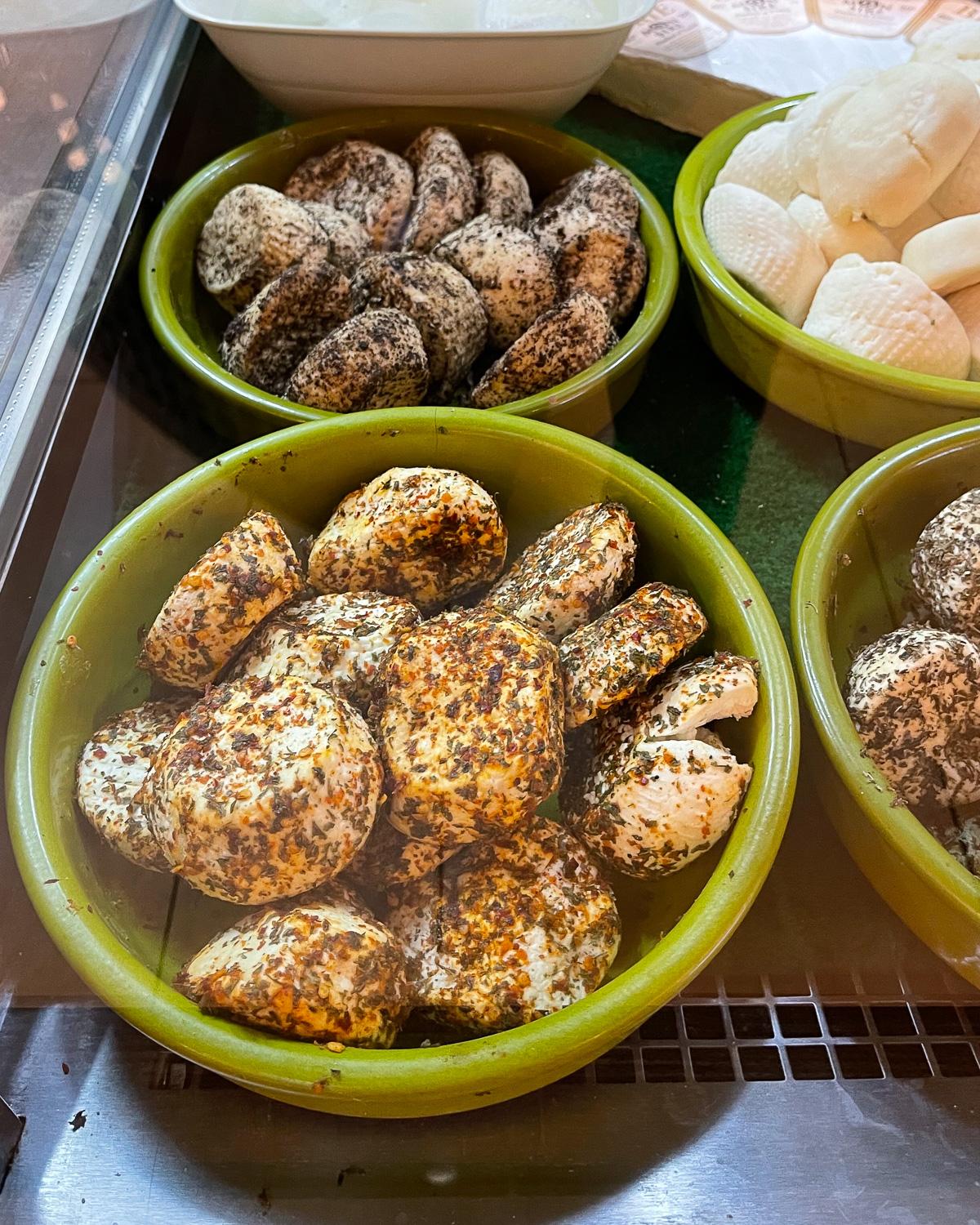
Maltese cakes and biscuits – there are numerous variations of cream filled cakes and spiced biscuits, that are produced for Christmas, Easter and each village’s feast day. If you see them, try before they disappear from the bakery!
Meat stews and sausages – traditional meats on Malta are rabbit and pork, which are often slow cooked to make the meat go further, or made into a spicy sausage that is also added to stews.
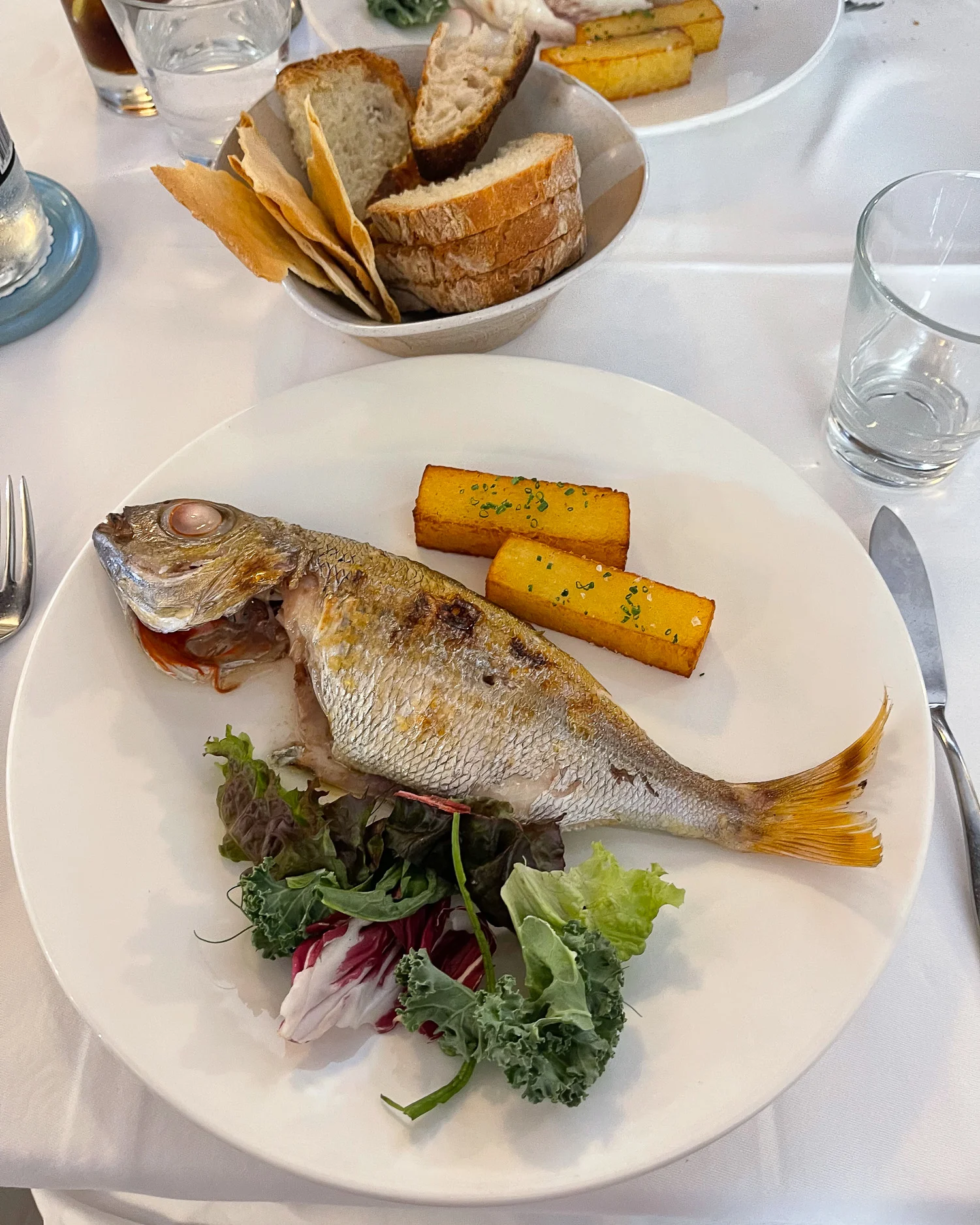
Locally caught fish – fish are sustainably caught from colourful painted Luzzu boats and served simply grilled or fried in local restaurants. Lampuki is a popular fish which migrates through Maltese waters from August to December and when plentiful is served as Lampuki pie with olives and vegetables.
Drinks to try in Malta – for soft drinks the bitter orange flavoured soda Kinnie is a favourite summer choice. The most popular beer that’s brewed on Malta is Cisk and there are also some excellent wines being produced by boutique wineries on both Malta and Gozo.
Read more in my article on: Delicious Maltese food – where and what to eat
Food tours in Malta
If you’d like to learn more about the local cuisine, check out these food tours.
Valletta food and drink walking tour – Discover the authentic food and drink of Malta with several tasting stops as you pass the main sights of Valletta. Book here.
Valletta street food and culture tour – Learn about local food culture with tastings of sweets, street food and drinks in this walking tour around Valletta. Book here.
16. Diving and snorkelling in Malta
Malta is known as one of the best places in the Mediterranean for scuba diving, and for good reason. The geography and history of the island means that its surrounding waters have many caves, shipwrecks and coral reefs teeming with aquatic life. While Malta is a year round diving destination, the best weather and visibility is found from May to October.
Among the top diving spots in Malta are the Qawra Reef in St Paul’s Bay, P29 and Rozi wrecks at Cirkewwa on the north coast, the Um El-Faroud wreck on the south coast and HMS Maori wreck in the Grand Harbour. On sister island Gozo, the tunnel from the Inland sea and nearby Blue Hole are one of the most popular places to dive, full of parrotfish, octopus, and lobsters.
The smallest island of the archipelago, Comino also offers diving in the Blue Lagoon and Santa Maria sea caves. There are many dive operators based around St Julian’s Bay, St Paul’s Bay and Cirkewwa in Malta offering both shore and boat dives.
Some of the best snorkelling spots are also located on Malta’s smaller and less developed sister islands Gozo and Comino. Try the rocky coves at Xlendi Bay, Daħlet Qorrot and Ħondoq ir-Rummien in Gozo or the Blue Lagoon of Comino for snorkelling spots.
17. Hiking and walking in Malta
While Malta is a small and highly developed island, you can find some beautiful countryside and coastal walks that are easy to moderate in difficulty. Some of the most popular hiking routes include:
Dingli Cliffs to Blue Grotto – this 3 hour cliff top walk starts at the famous Dingli cliffs, with views over the sea caves and islet of Filfla. Heading south east, the trail parts from the road and eventually passes the temples at Hagar Qim, before reaching the cove of Wied iż-Żurrieq where you can take a boat trip to the Blue Grotto.
Girgenti Walk – this 2 hour countryside walk starts at the Buskett woodland gardens and allows you to explore the nearby Ghar Il-Kbir caves. The trail continues towards the impressive Verdala Palace set on the hill, ending at the village of Siġġiewi.
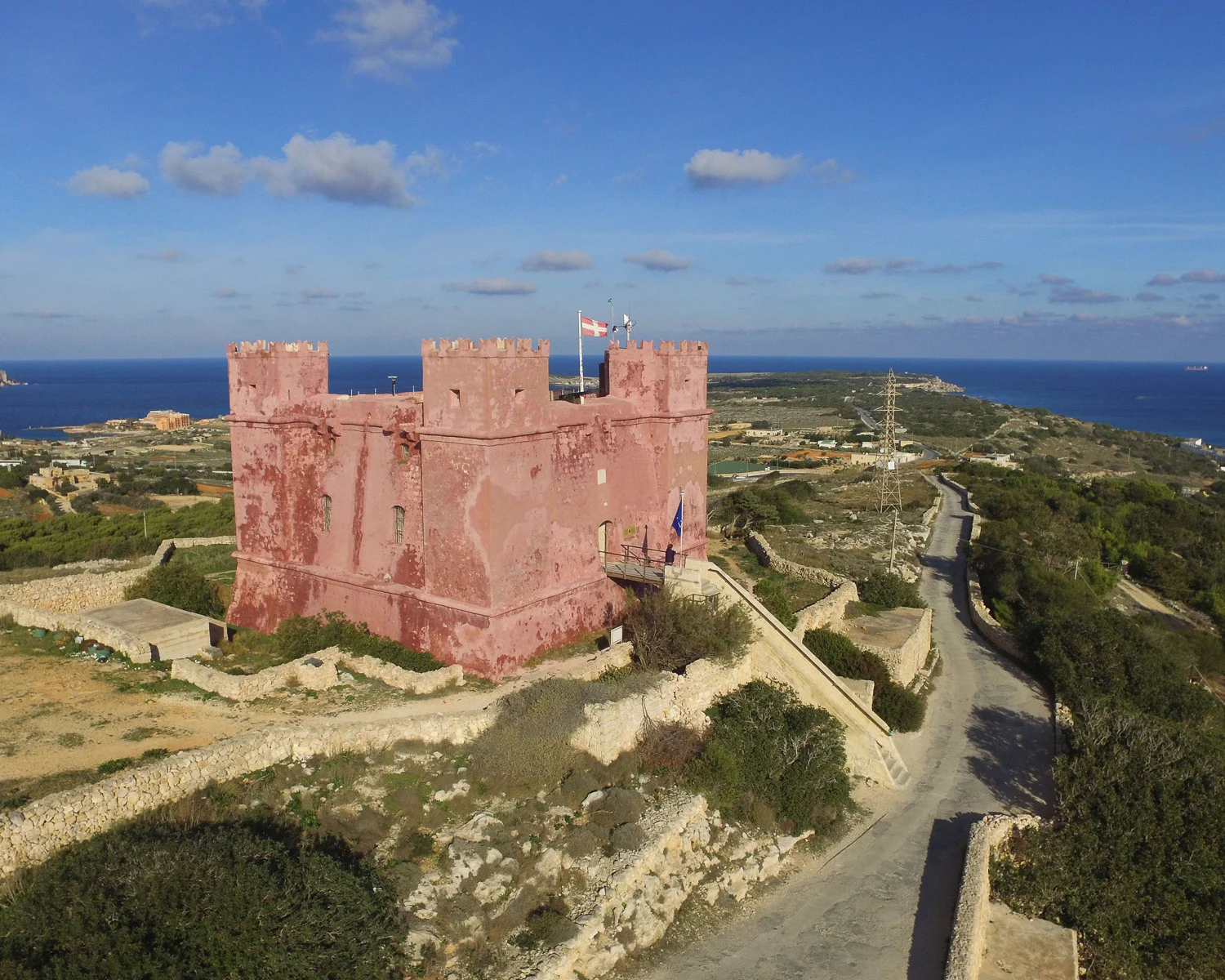
Watch Towers Walk – A 4 hour walk that starts and ends at Għadira Bay in the north of Malta. From the beach you’ll head uphill to the imposing Red Tower, before the trail circles Malta’s northern peninsula, taking in the White Tower and views over the rocky coves and beaches.
You can download leaflets and maps for the routes mentioned above and several more from the Visit Malta website. There are also many lovely hiking trails on the sister island of Gozo, which is less developed than Malta. The best time for hiking is in the spring and autumn, since the weather in summer is likely to be too hot.
18. Ghar Dalam cave and Museum
Malta’s oldest prehistoric site is Ghar Dalam, a cave proving the presence of different animals and humans on Malta throughout history.
It is best known for the extensive collection of animal bones recovered from the deepest reaches of the cavern, ranging from 500,000 years to 7,400 years (the earliest evidence of humans on Malta). Dwarf elephant, dwarf hippo, and giant swan bones are some of the oldest animal remains found in the cave.
The museum forms the entrance to the cave, and displays many of the original excavation findings. It also houses complete skeletons of modern animals to show the contrast with neolithic counterparts. The museum is open Tuesday to Sunday. Adult admission is €6.50.
Hop on Hop off Bus South (Red) Route – The Hop on Hop off bus south route from Valletta stops at Ghar Dalam Caves as well as many other locations. Book here.
19. Sliema and St Julian’s – nightlife and shopping
Across the water from Valletta are the adjoining neighbourhoods of Sliema and St Julian’s. While heavily developed, they are popular locations for shopping and nightlife, with a large concentration of hotels. Sliema is easy to access via the ferry that crosses from Valletta but otherwise the whole area is best explored on foot, as parking can be quite a challenge!
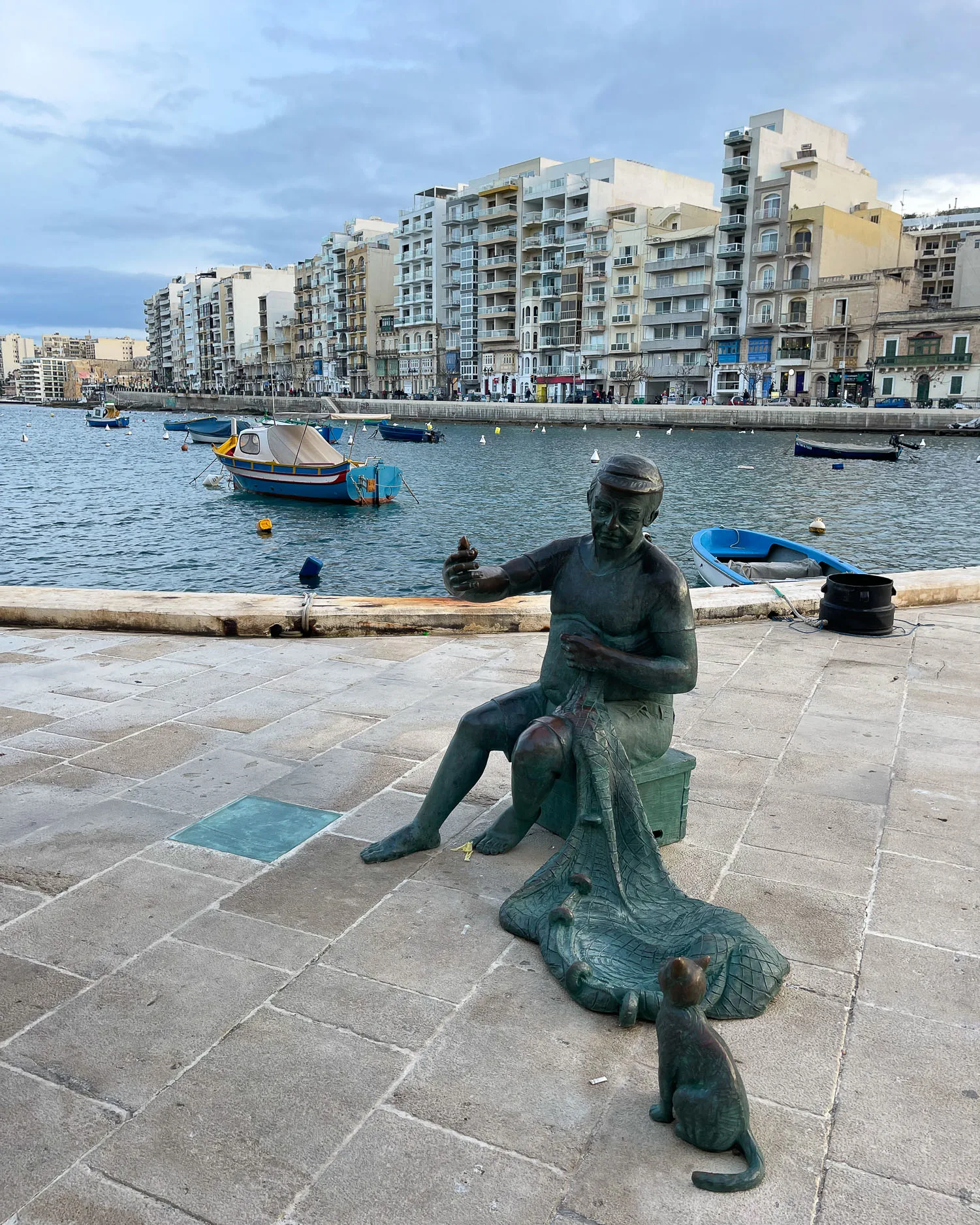
One of the best things to do in Sliema is simply to wander on the waterfront promenade, which takes you from the ferry terminal, all the way around the point to St Julian’s Bay. The promenade is lined with cafés, bars, restaurants, with beautiful views over to Valletta, especially at sunset.
St Julian’s is where the nightlife lives. There are bars, restaurants, and nightclubs at every turn (especially in the Paceville area), and it feels like a city that never sleeps. You may wake up early and find that people are only just leaving the bars!
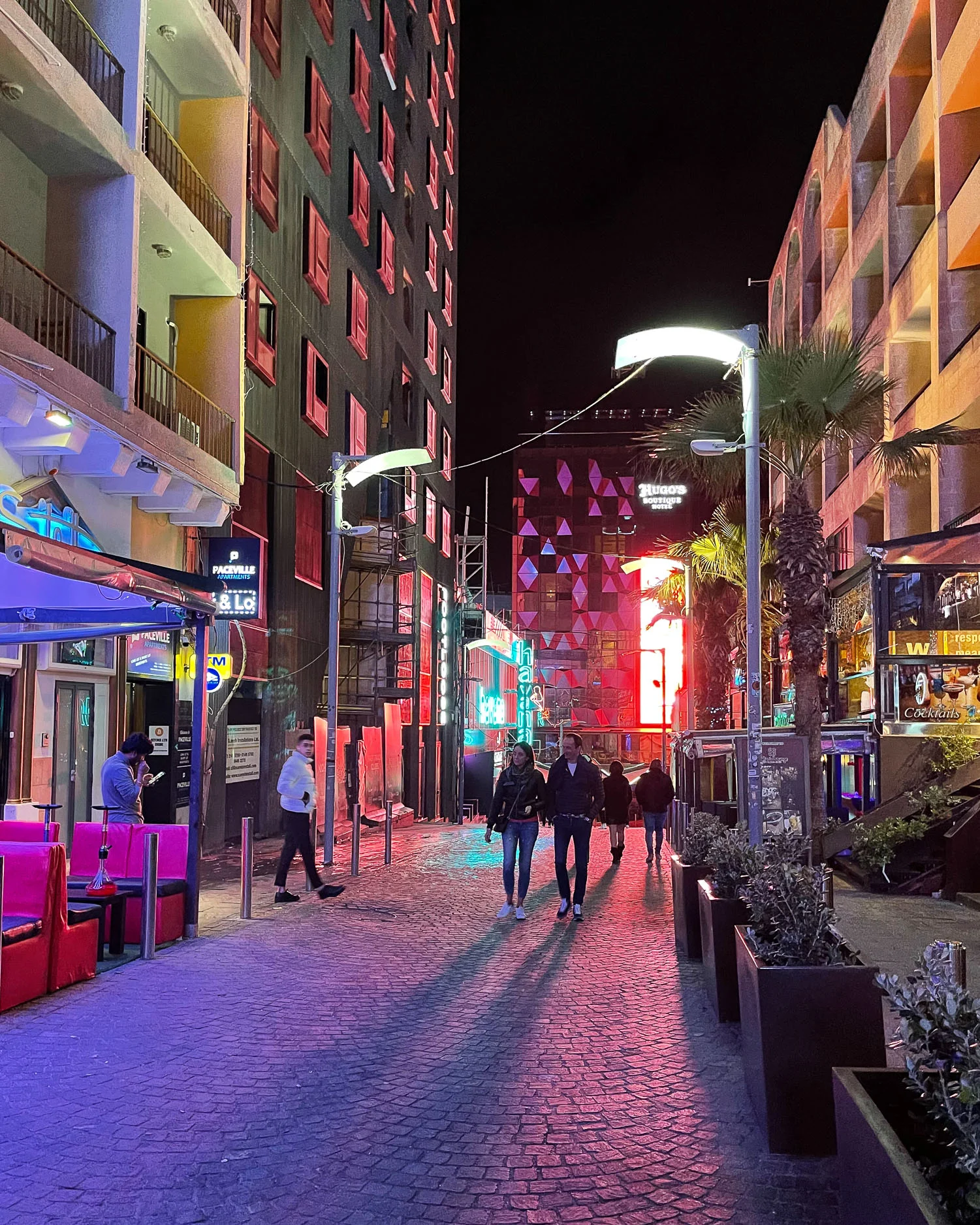
There are some beaches and rocky swimming spots, but because they are backdropped by large developments and high-rise resorts, there are probably better places to spend a beach day in other parts of Malta or Gozo. Balluta beach in St Julian’s Bay has a small stretch of sand and a large outdoor swimming pool, while St George’s Bay has a sandy beach, backed by numerous bars.
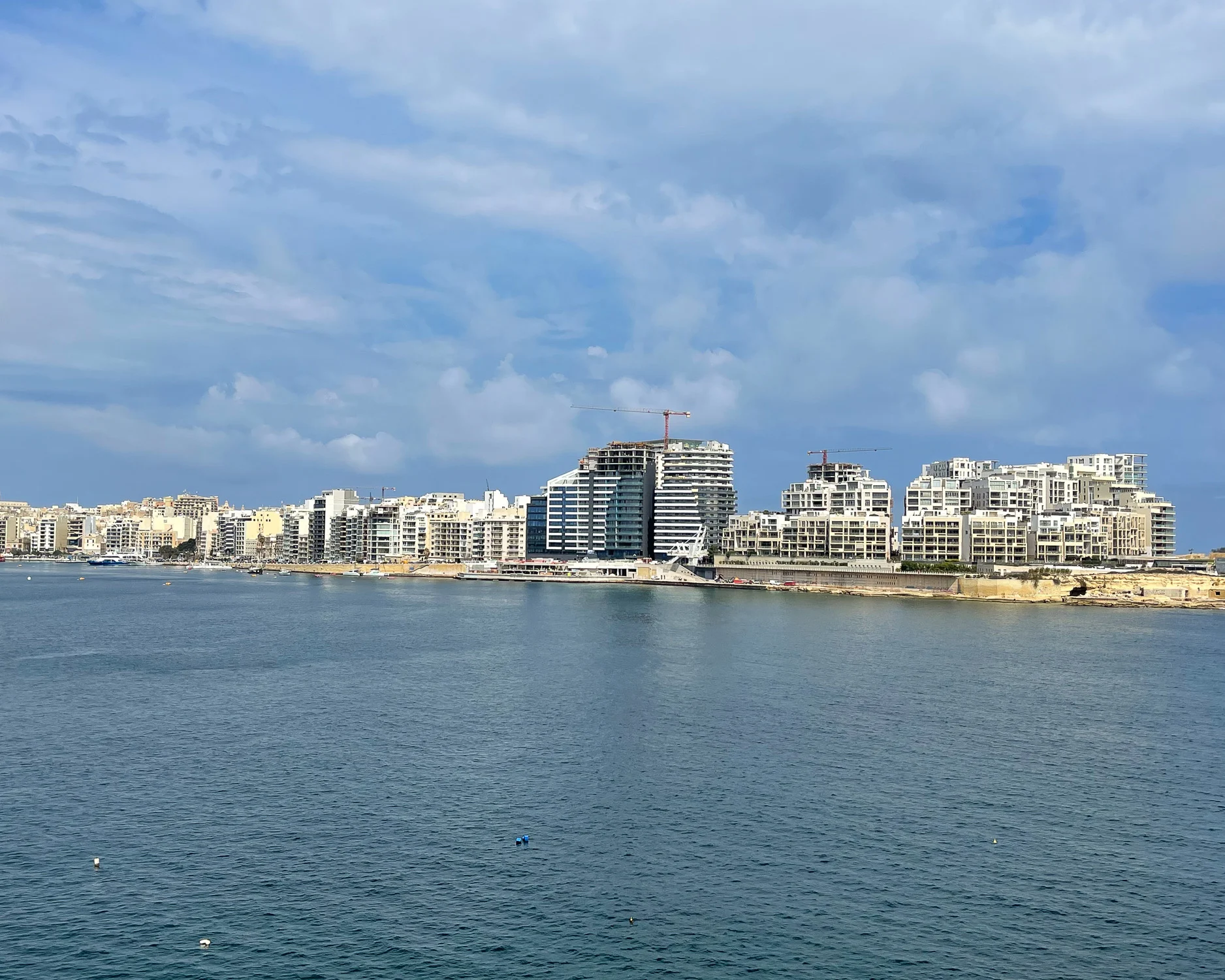
I have to admit that these weren’t my favourite parts of Malta, but they do offer an excellent choice of restaurants, nightlife and shopping.
Where to stay in St Julian’s and Sliema
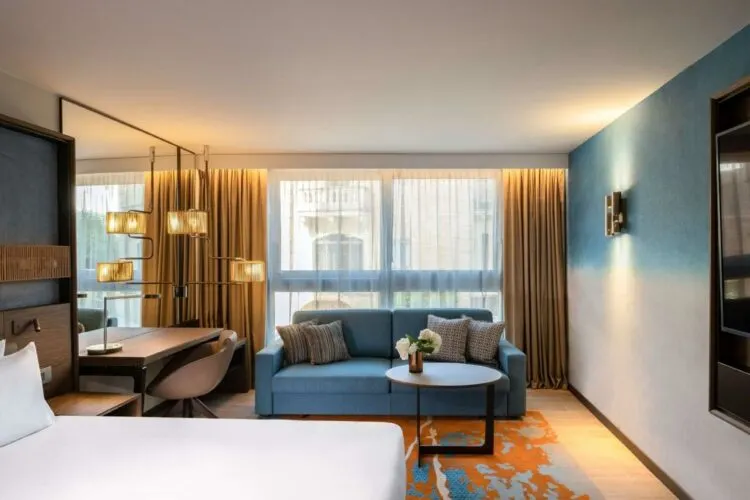
The Hyatt Regency is a 5 star luxury modern hotel in St Julian’s overlooking a historic chapel
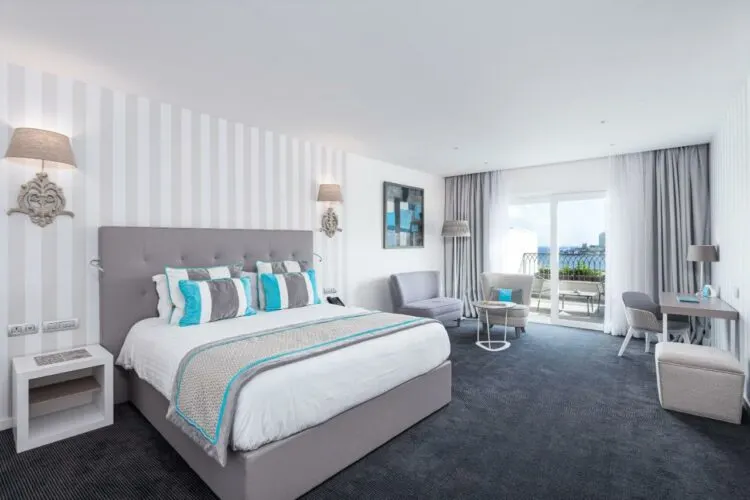
Hotel Juliani is an affordable boutique hotel overlooking St Julian’s Bay
20. Popeye Village – film and family fun
Located in the north of Malta, the film set from the 1980 movie of Popeye starring Robbie Williams, has been made into a theme park. Popeye Village is a popular summertime family attraction overlooking the sheltered cove of Anchor Bay, where you can see the wooden houses built to serve as Sweethaven Village in the movie.
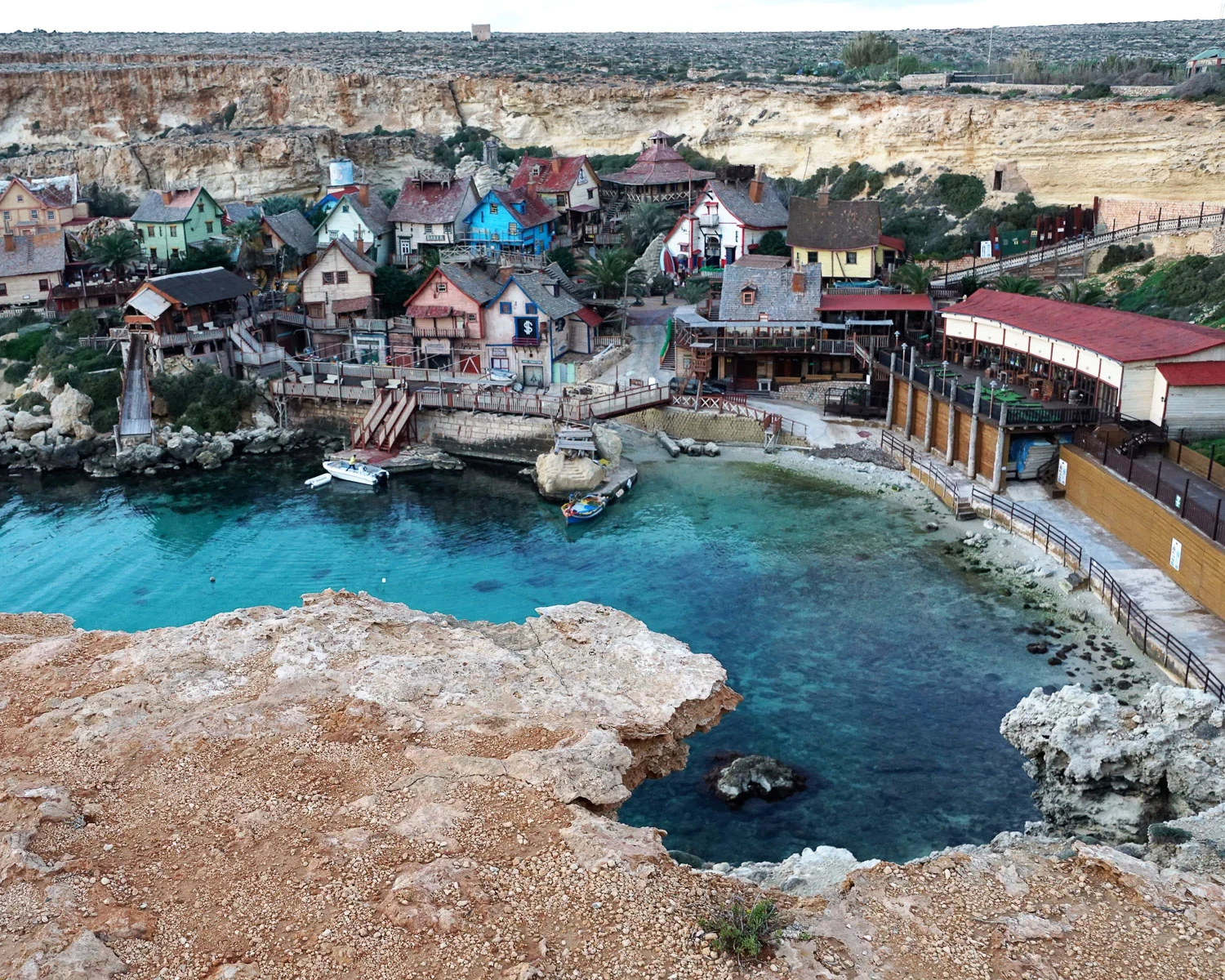
In addition there’s a water park with lido, water trampolines, sunbeds, play area and boat rides located above the film set. If you’d like to see the Popeye Village for a photo, there’s a viewpoint from the cliffs on the opposite side of Anchor Bay. Tickets from €15. Book tickets for Popeye Village online in advance
21. Commonwealth War Graves – Malta’s wartime history
During the First World War, Malta was known as the “Nurse of the Mediterranean” as a convalescence station for Allied troops fighting in Greece and Turkey. In the Second World War Malta became a heavily fortified Naval Base, that was constantly under attack but never occupied.
You can learn much more about this part of Malta’s history by visiting some of the cemeteries that are beautifully maintained by the Commonwealth War Graves Commission, such as Kalkara Naval Cemetery (also known as Capuccini cemetery).
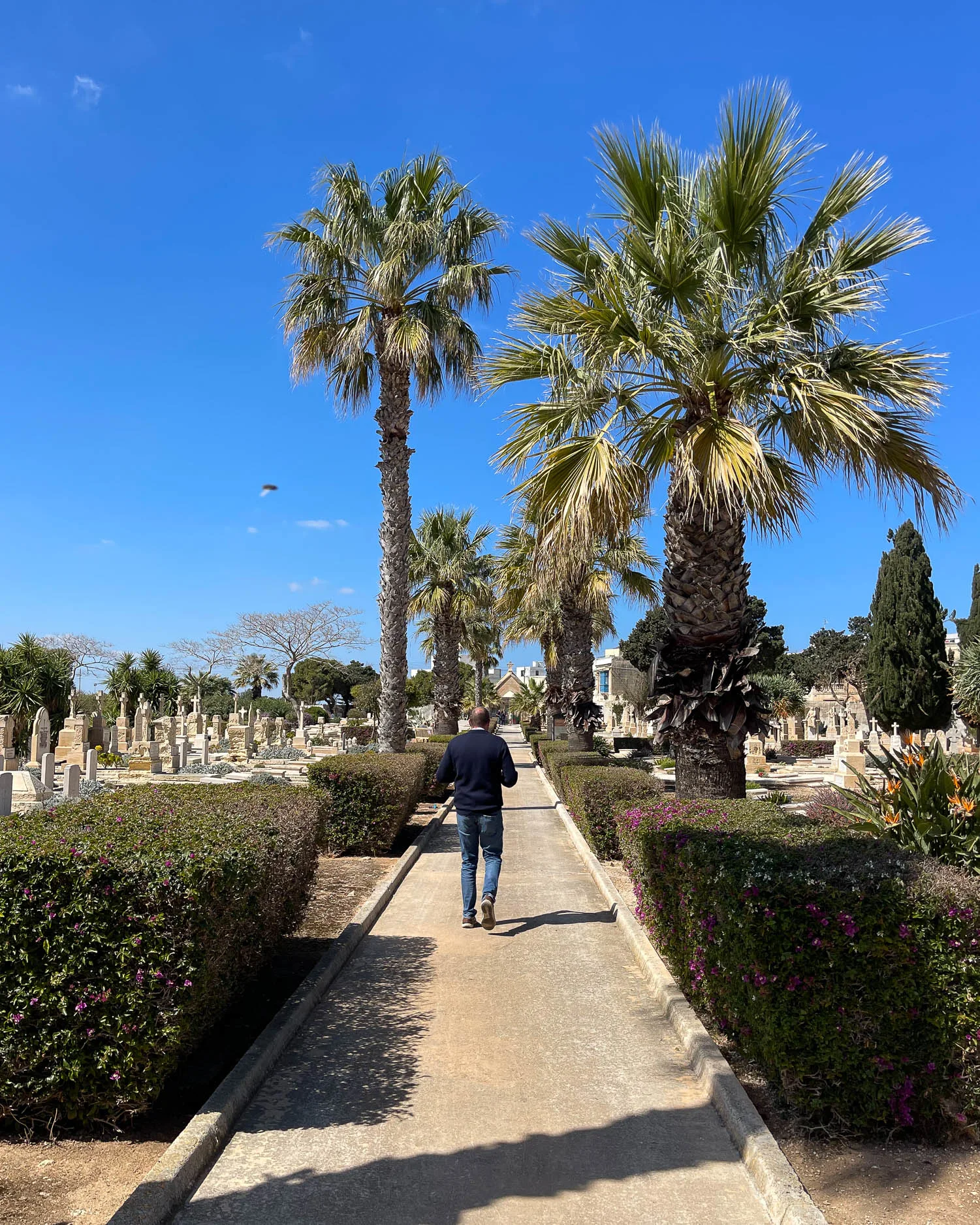
This tranquil plot is the final resting place for over 1000 casualties from the two world wars, including a Japanese naval memorial. Other military cemeteries on Malta include the Pieta Military Cemetery and the Imtarfa Military Cemetery.
If you have relatives who may be buried here, it’s possible to find more information about their resting place on the Commonwealth War Graves website.
Map of Things to do in Malta
Click on this link or on the image below to see my map of all the best things to do in Malta
Where is Malta?
Malta is a small island nation is southern Europe, located in the heart of the Mediterranean. Its closest neighbour is Sicily (Italy) to the north, but the coast of North Africa is not too far away. The archipelago is made up of the main island of Malta, and the two smaller islands of Gozo and Comino. The Maltese have their own language, but English is also universally spoken.
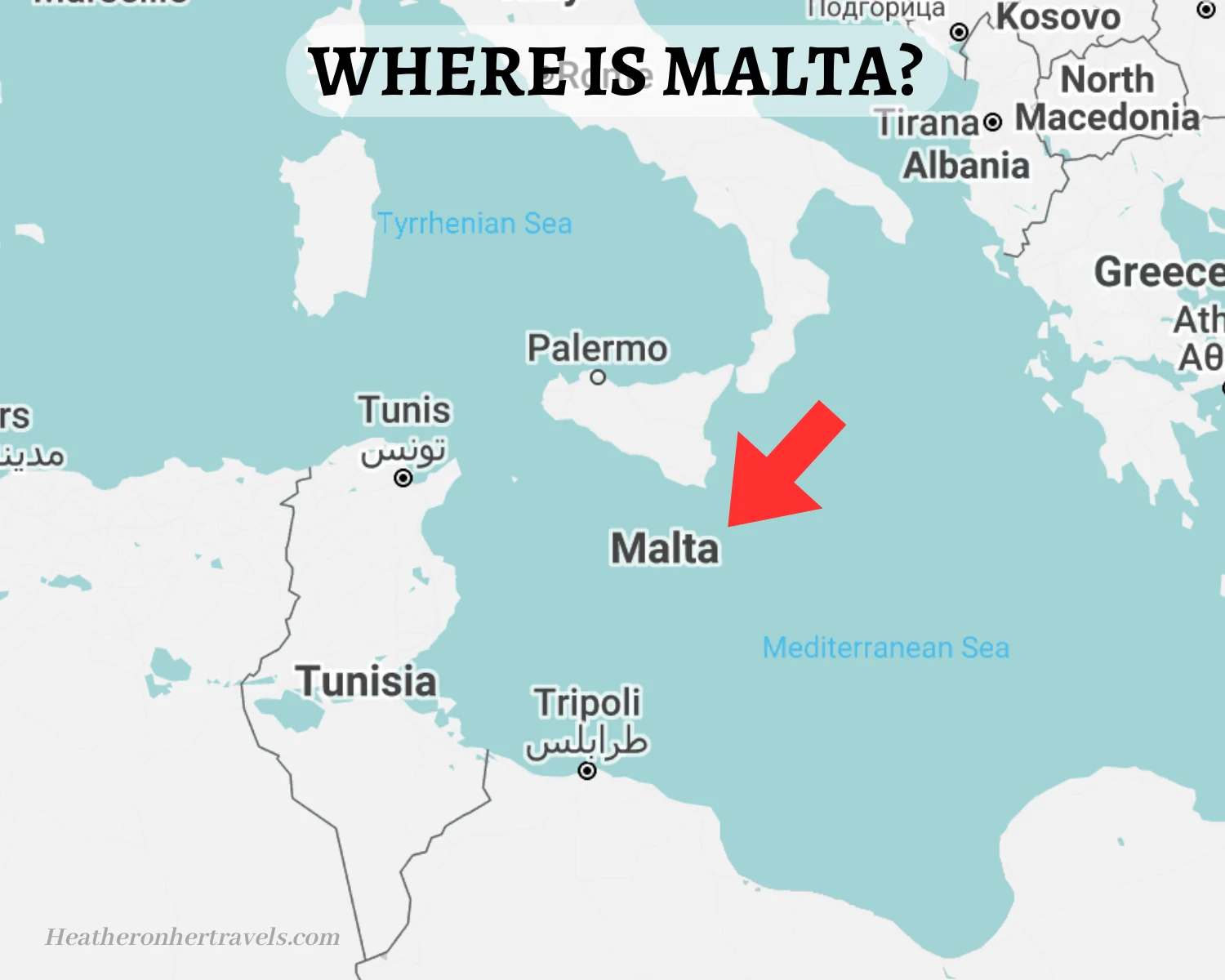
How long do I need to visit Malta?
Malta is an ideal short break destination, and in a few days you can explore the areas around Valletta and the Three Cities, with perhaps a day trip to Gozo or M’dina. If you have a week, you’ll get a good overview of the island while a couple of weeks will allow you to see the sights at a more leisurely pace, with plenty of opportunity for walking or beach time.
Best time to visit Malta
Malta is located very close to the southern shores of Sicily and enjoys year round sunshine and hot summers. The ideal time to visit for sightseeing is Spring (March – May) and Autumn (September – November), when the days are warm and sunny but not unbearably hot.
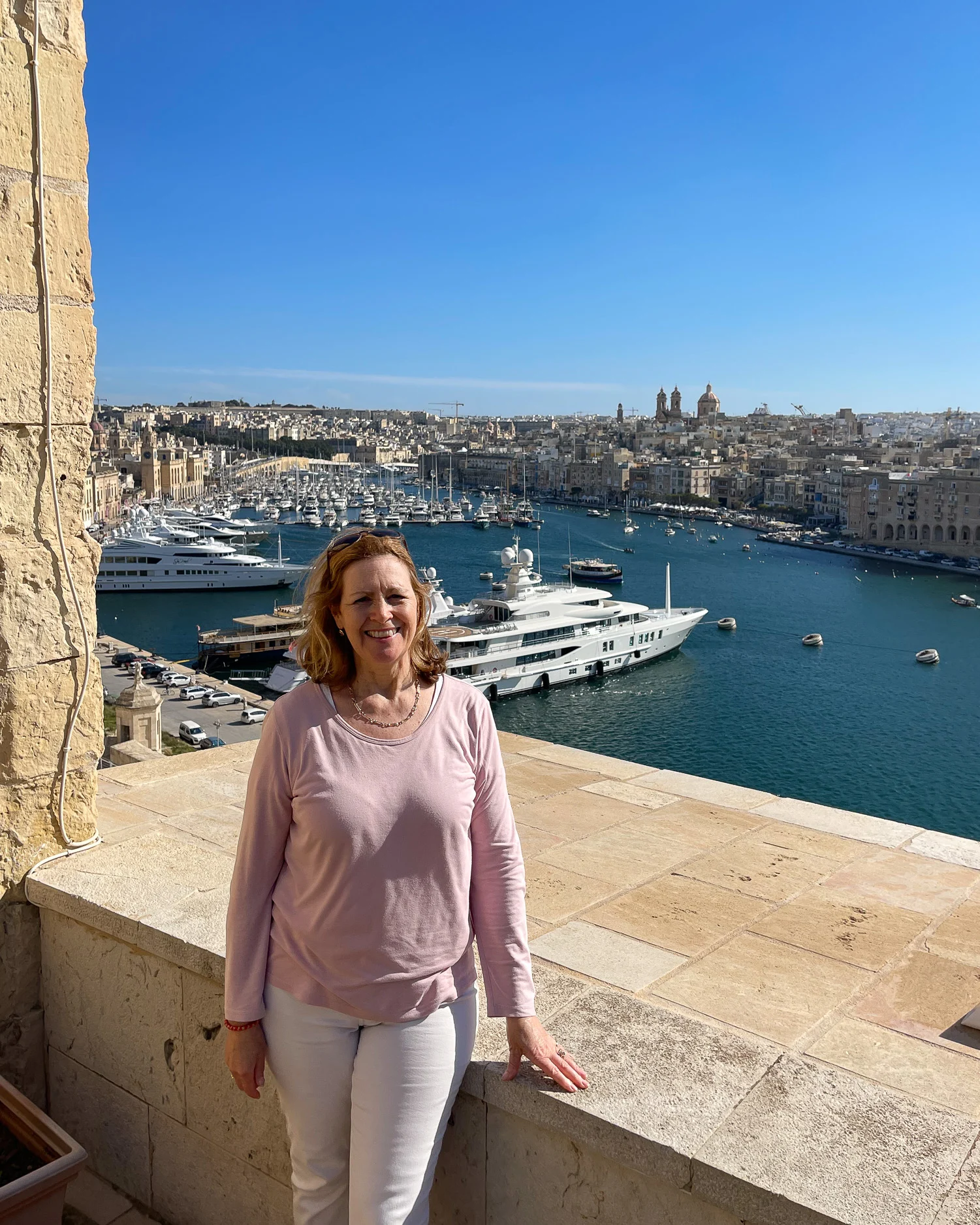
Personally I would avoid visiting in the heat of the summer, avoiding July, August and even parts of June and September, unless you are visiting Malta for a beach holiday. During these high season months the Maltese are on holiday and everywhere is very crowded.
December, January and February bring rain but the winter is mild and you can still get sunny days. However you may not get the best of Malta’s Mediterranean climate in winter.
We visited in March and enjoyed the warmth and sunshine at a time when northern Europe can be cold and wet.
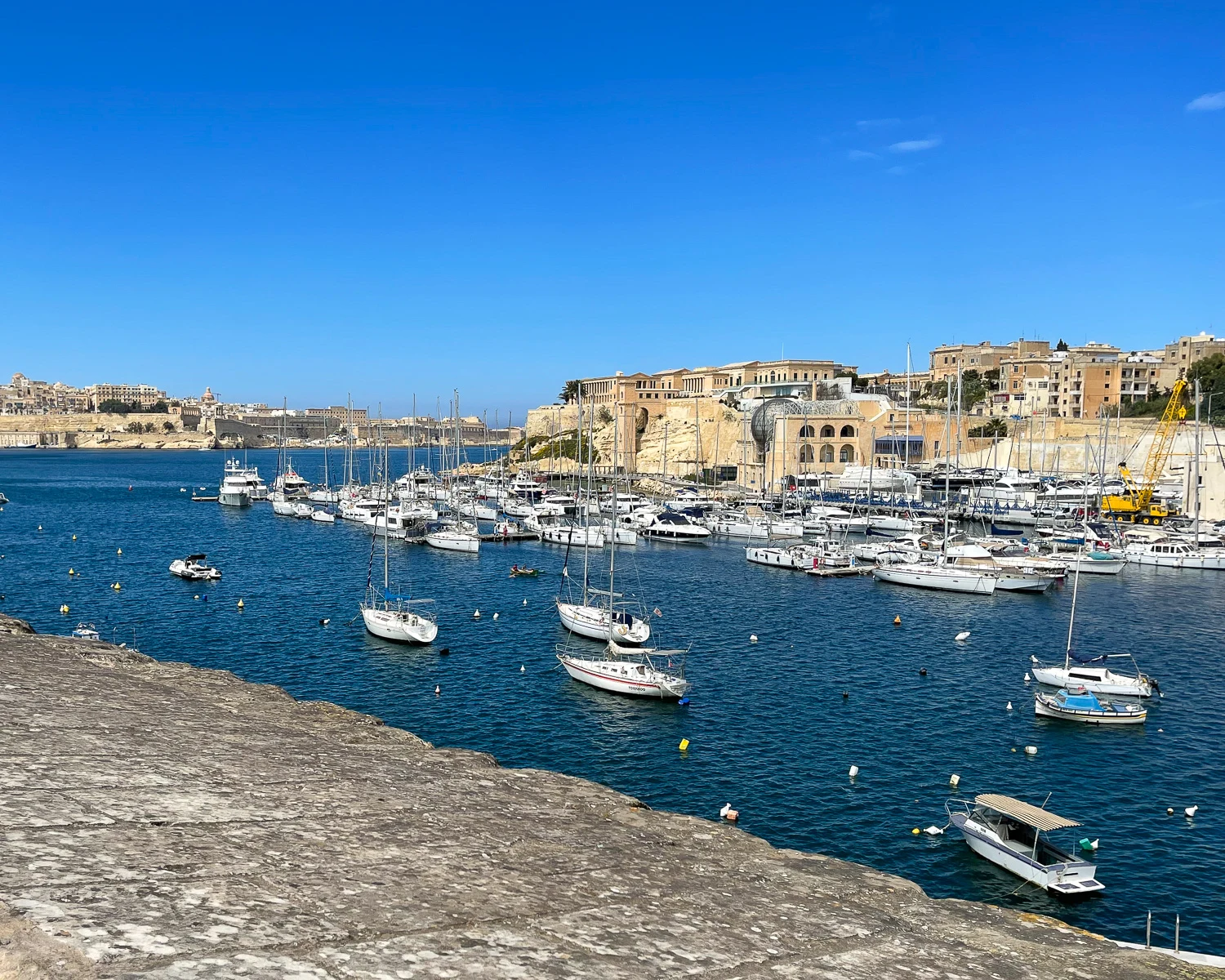
Getting to Malta
Most international travellers will arrive in Malta via a flight into Malta’s Luqa airport or on a Mediterranean cruise. If you wish to use transport that avoids flying within Europe, there are easy train and ferry routes through Italy that will bring you to Sicily and from there you can take the daily ferry service to Malta.
Getting around Malta
By Bus
From Malta Airport take the X4 public bus, which will drop you at Valletta bus station, close to the Triton Fountain. Public buses also run to most parts of Malta, often using Valletta bus station as a hub. A single journey is €2 and you can pay on the bus with card or cash.
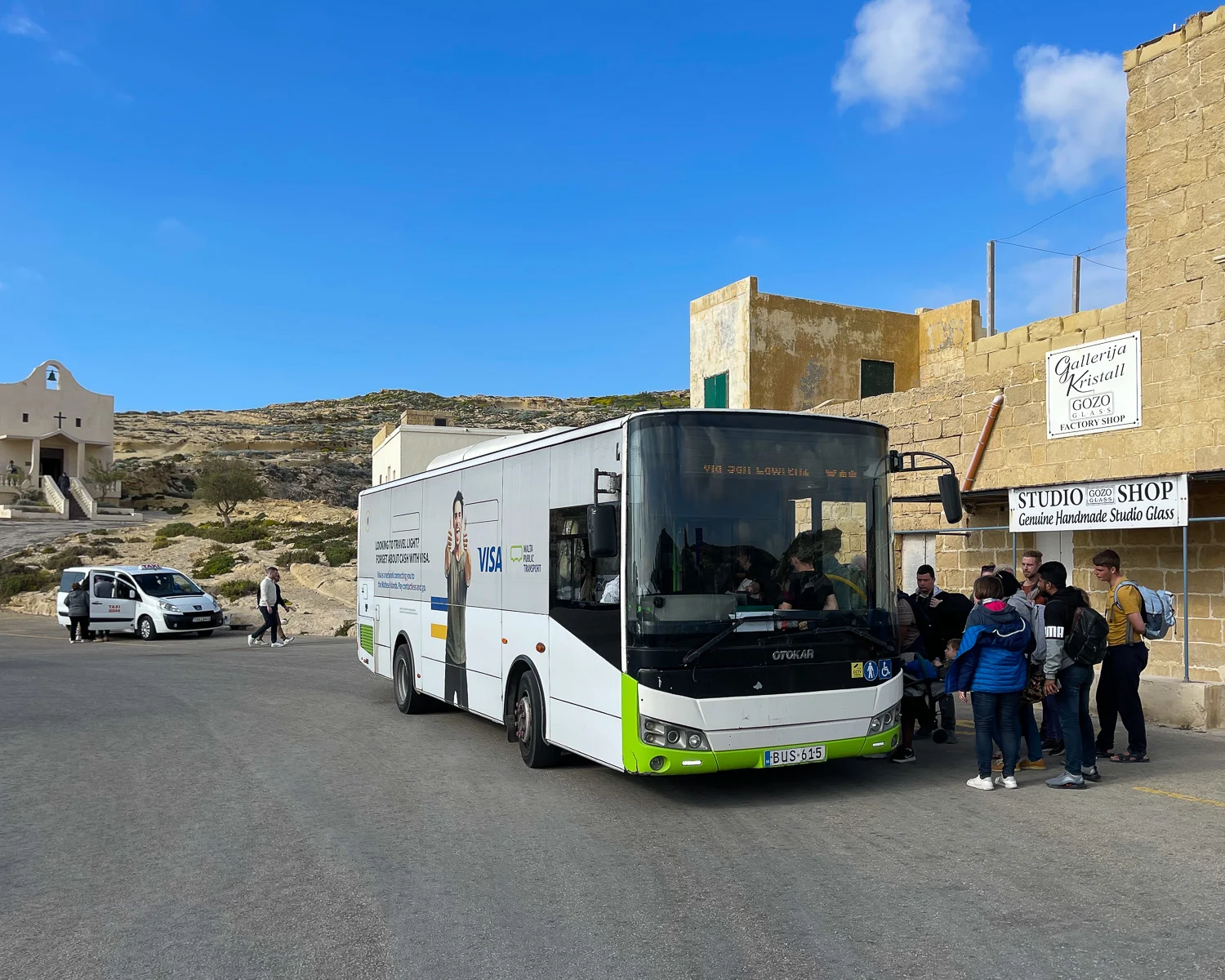
By Ferry
If you are based around Valletta, Three Cities or Sliema, the ferry is a good way to get around.
- From Lascaris Wharf in Valletta, take one of the small Maltese wooden ferries known as Dgħajsa, to cross the Grand Harbour between Valletta and Three Cities.
- A public catamaran ferry also crosses the Grand Harbour between Valletta and Three Cities every 30 minutes throughout the day.
- The ferry from Valletta to Sliema runs throughout the day, leaving from Boat Street, on the Marsamxett Harbour side of Valletta.
- For a day trip to Gozo, the main car ferry runs from Cirkewwa in the north of Malta. There’s also a passenger only fast ferry from Valletta to Gozo which takes 45 minutes.
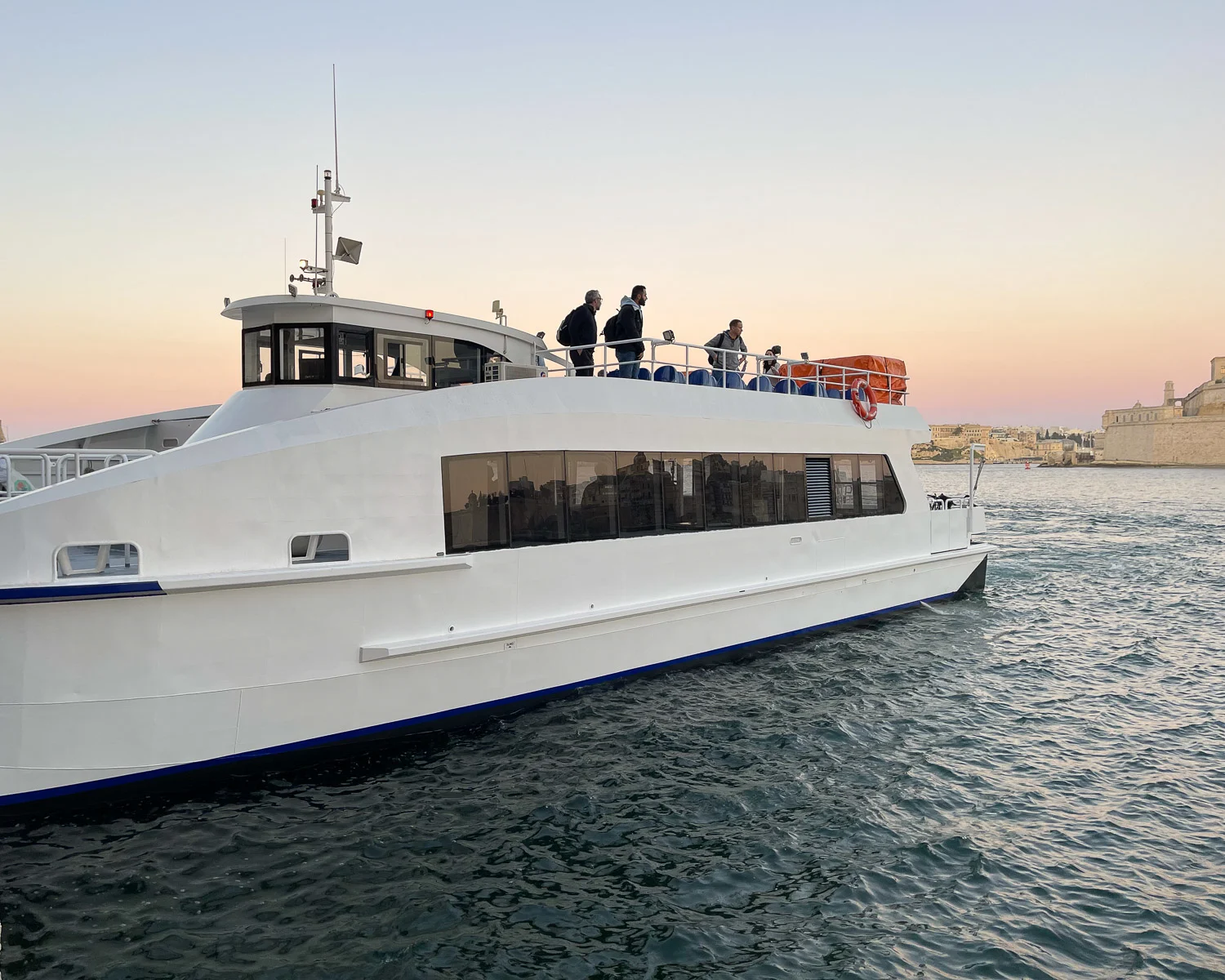
By Hop on hop off bus
For an easy way to see the sights around Malta, take a hop on hop off bus tour. The bus runs in 2 different loops to the north and south, leaving Valletta around every 30 minutes in summer and every 60 minutes in winter.
Highlights of the northern route include M’dina and Rabat, San Anton Gardens, Mosta Church and Spinola Bay, while highlights of the Southern route include Marsaxlokk, The Blue Grotto, Hagar Qim & Mnajdra Temples and Sliema.
By Taxi
Taxis are a convenient option to get from the airport or in other locations of Malta, especially if you have a lot of luggage or are not able to walk far.
The white official taxis are widely available, with a taxi rank near the Triton Fountain in Valletta, and at other busy places like Rabat and Marsaxlokk. If no taxis can be found, you can use the Bolt taxi app to order one.
Car hire
Hiring a car can be useful if you are staying in a rural part of Malta or beach resort. You may also want to hire a car for part of your stay to visit some of the more remote spots on the island. We recommend comparing car hire prices and options on Rentalcars.com – as always look at the reviews, scores and the small print before choosing a car rental company.
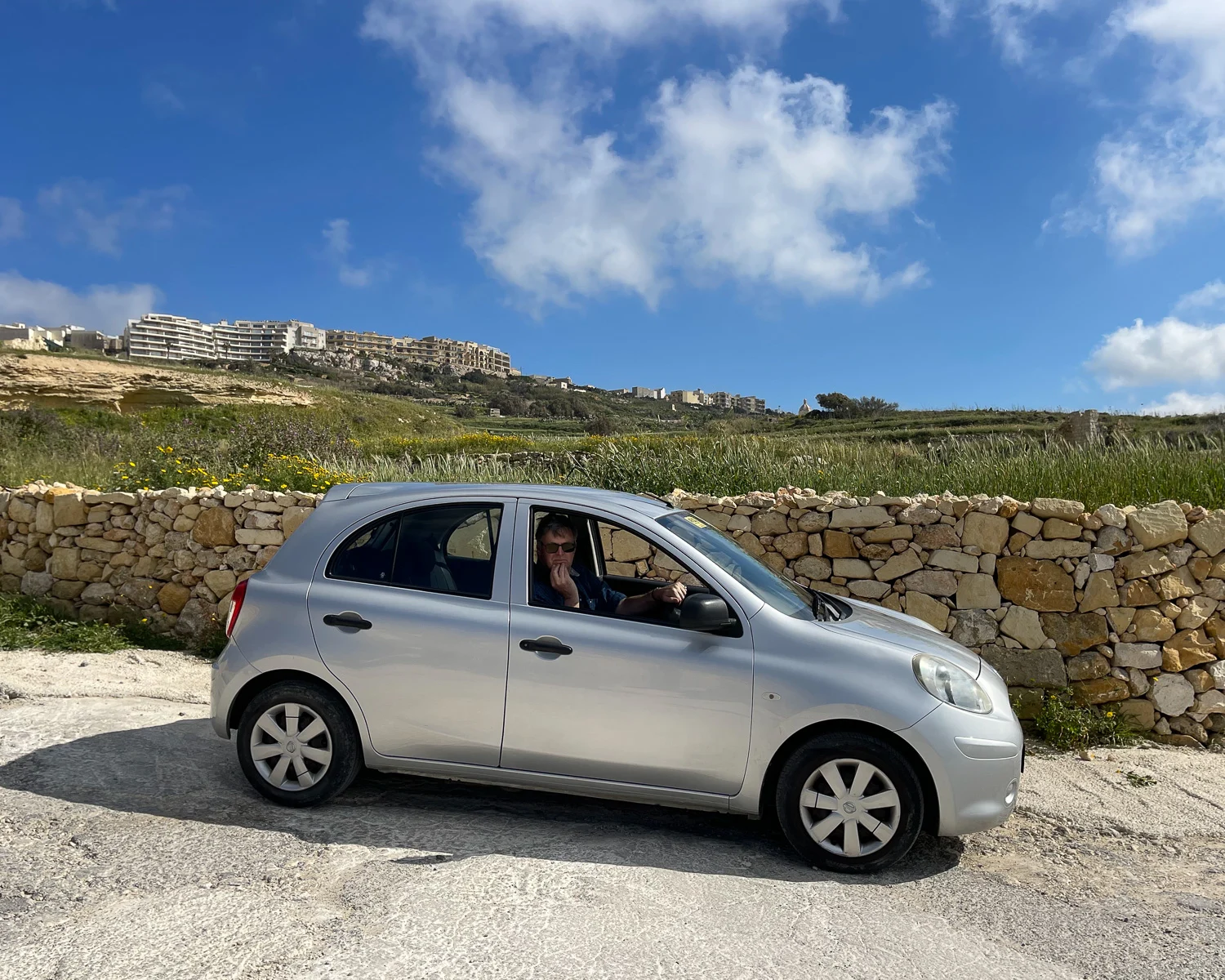
If most of your time will be spent around the urban areas of Valletta, Three Cities or Sliema, it’s better to use the buses and ferries. Since many streets are pedestrianised and there is little parking, you don’t really need a car in these areas and using public transport will be much more relaxing.
Sustainable travel in Malta
Consider how you can travel more sustainably in Malta;
– Use public transport options such as bus and ferry to get around and only hire a car when absolutely necessary. Since the roads around Valletta and Three Cities can be very congested, this will also make for a much more relaxing experience.
– Look for accommodation that supports good sustainability practice. If booking accommodation in Valletta on Booking.com you can filter using the “Travel Sustainable Properties” filter but also check for information on the hotel’s own website.
– The tap water in Valletta and Malta is safe to drink, but is from desalinated sea water, which may give it a particular taste. For reasons of taste, locals and restaurants prefer to offer bottled water to drink. However, to reduce the amount of plastic and glass waste, try to avoid buying bottled water.
– There are no reservoirs or rivers on Malta and water is a limited commodity. So avoid wasting water in your daily use, especially in the hottest months when demand is high.
– Malta offers mild winters but the summers can be very hot, so air conditioning may be required. Try to reduce the air conditioning needed, by using shutters or curtains for shade and leaving windows open at night for fresh air.
– Look out for menu items based on local produce and fish that is locally and sustainably caught. Support restaurants that work with local food producers.
– Valletta is a year round destination but can get very crowded in the summer months. To reduce over-tourism, consider visiting in winter, spring or autumn when crowds are less and accommodation prices lower.
Plan your trip to Malta
For more information on things to do in Malta, visit the official Visit Malta Tourism website.
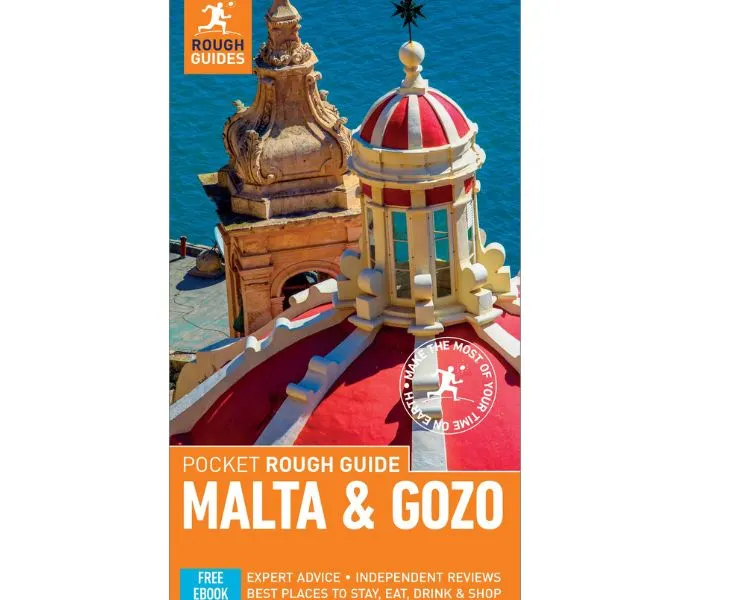
Need a guide book for Malta? We recommend the Pocket Rough Guide to Malta and Gozo
Read Next
Want to explore more? Read my article: A guide to the Three Cities Malta – top things to do
More articles about Malta
20 things to do in Valletta Malta
Where to stay in Malta – best locations and hotels
Delicious Maltese Food – where and what to eat
Fun things to do in Gozo – the quiet sister island to Malta
Things to do in Malta in a weekend break
Things to do in Valletta, Malta in one day
Pin it
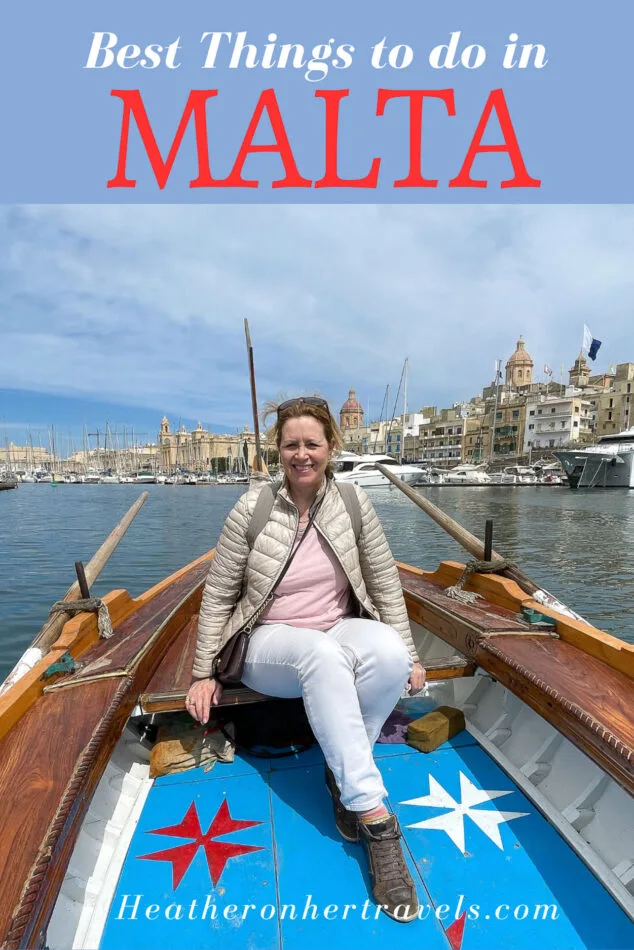
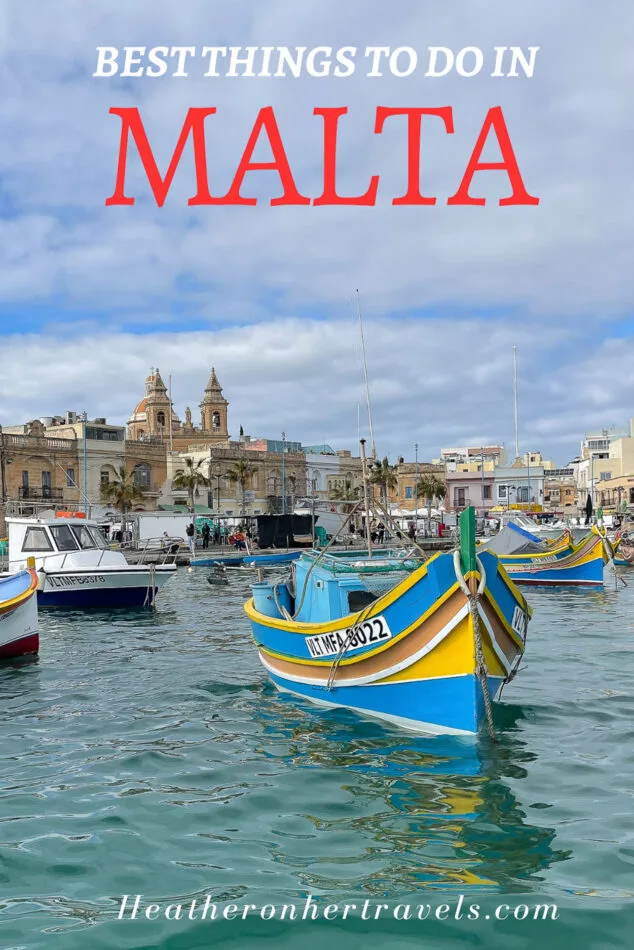
Some of the experiences mentioned were provided* on a press trip hosted by Malta Tourism and British Guild of Travel Writers.
* More info on my policies page
Image Credits: Popeye Village by photosforyou on Pixabay, Tarxien Temples by foursummers on Pixabay, Ħaġar Qim by Efraimstochter on Pixabay, Blue Grotto by ReneGossner on Pixabay, Mosta basilica by Bjonsson on Pixabay, Mosta interior by user32212 on Pixabay, Red Tower by MirabelliT on Pixabay, Dingli Cliffs by Bernt Rostad on Flickr, San Anton Gardens by Peter Grima on Flickr
This article is originally published at Heatheronhertravels.com

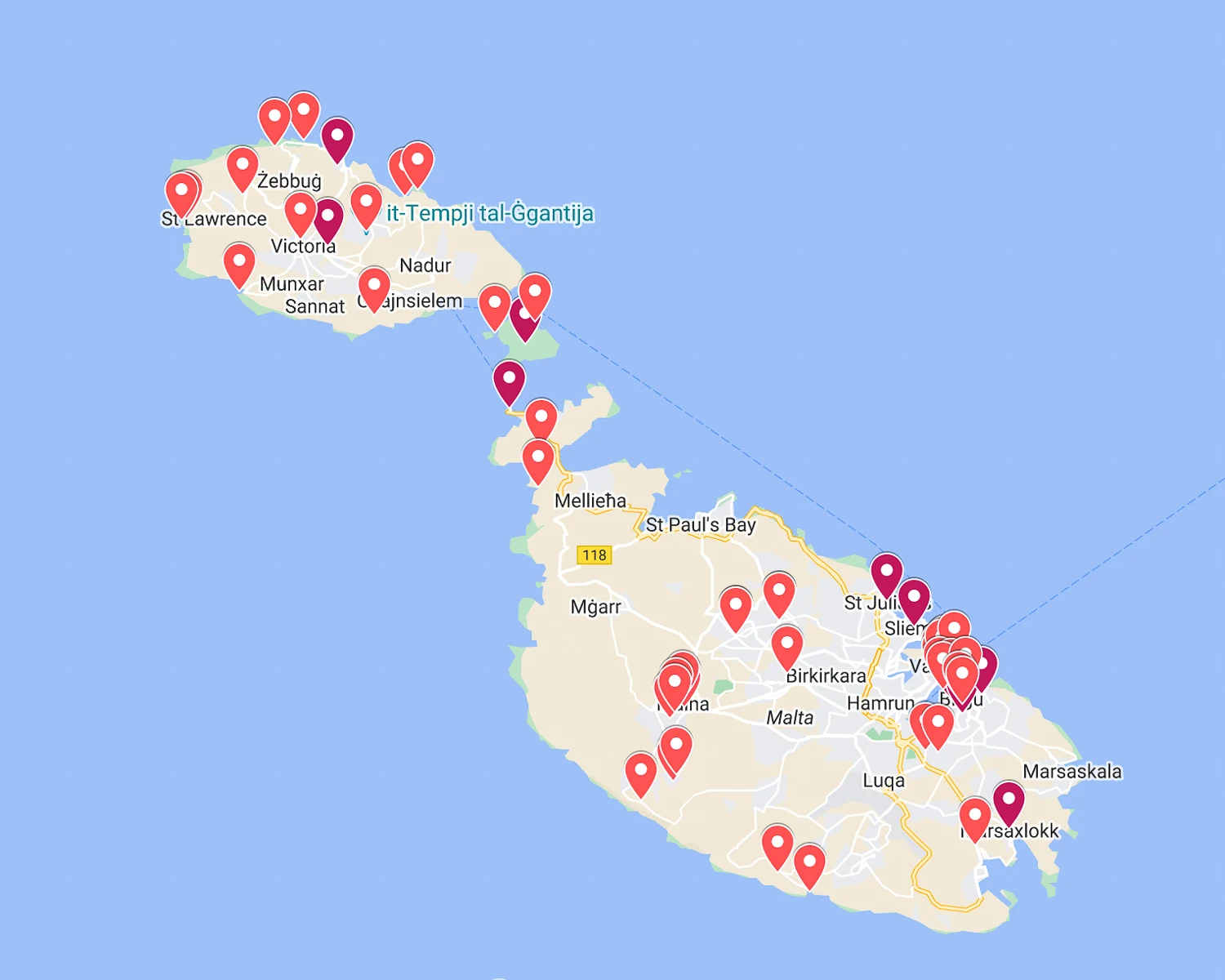
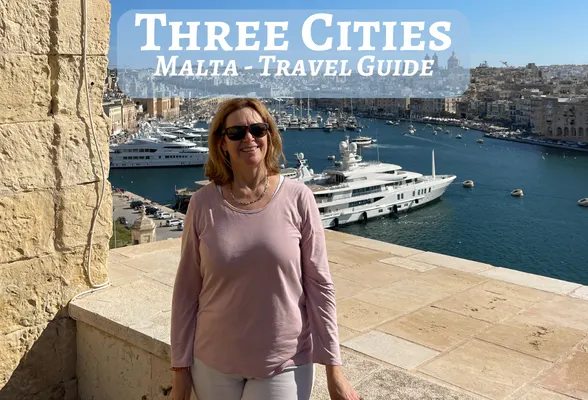


Hels
Saturday 6th of April 2024
Ah Heather, where were you when I needed you? I allocated only a week in Malta, thinking it was a small island. But I regret that now.
I knew about the Maltese and the Knights of St. John in the Great Siege of Malta, but now I have been writing about European market squares in my own blog, I realise that Victory Square celebrates that military victory. Food and coffee in the square's restaurants were heaps of fun.
Heather Cowper
Wednesday 10th of April 2024
@Hels There's a lot of history to enjoy in Malta, but as you say just hanging out in the street cafes is fun too!